This brief discusses the experiences of early career Black, Latina, and Afro Latina women in the trades. The COVID crisis has put a spotlight on the concentration of Black, Latina, and Afro-Latina women in low-wage jobs, including in many essential healthcare and retail jobs. The skilled construction trades have given many women an alternative to the poorly paid jobs in the service sector that many had to turn to before finding the trades. Skilled construction trades provide opportunities to build careers that are both challenging and fulfilling, pay a family sustaining wage with benefits, and can be accessed through ‘learn as you earn’ apprenticeships.
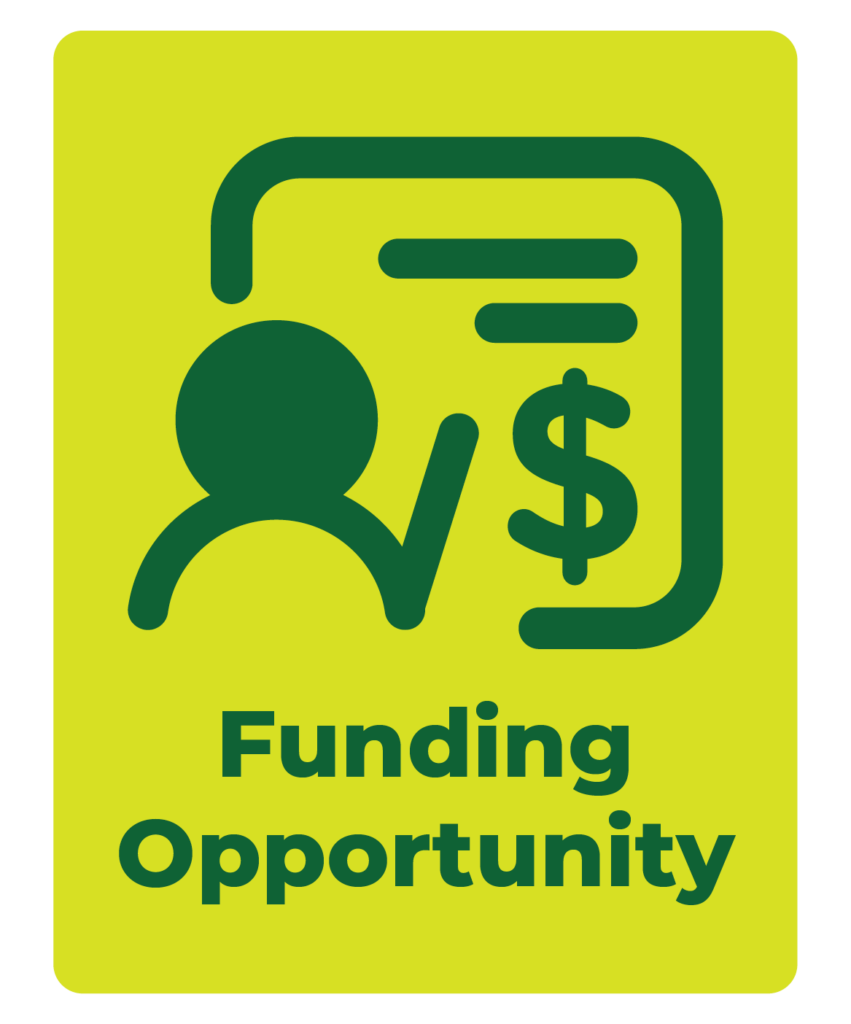
Future Ready Apprenticeship Center
Administering Agency: CareerWise
Closing Date for Applications: Friday, March 20, 2026
Funding Range: $200,00o per state
Geographic Scope: National
Description: With funding from the U.S. Department of Labor, CareerWise is launching the Future Ready Apprenticeship Center (the Center) in collaboration with the Colorado Department of Labor and Employment (CDLE) to support states in building state-level capacity to expand access to high-quality Registered Apprenticeships for youth aged 16-24. Selected states will receive customized consulting (intensive technical assistance), peer learning opportunities, and a total of $200,000 over 31 months (June 2026 – December 2028) to develop, implement and improve state plans that create systemic change in their ecosystems that enable expansion of youth access to registered apprenticeship programs.
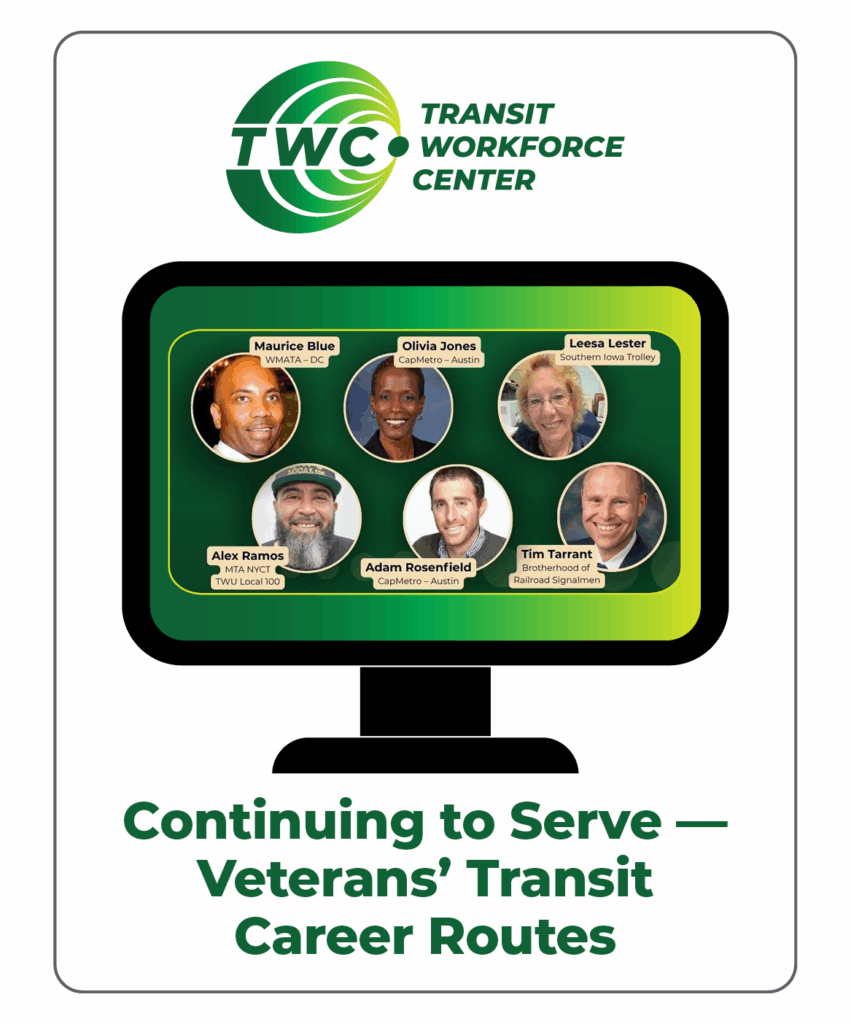
Continuing to Serve — Veterans’ Transit Career Routes
Transit Workforce Center
November 2025
In celebration of Veterans Day, TWC and external partners hosted a webinar exploring public transportation workforce pathways and opportunities for veterans. Check out the webinar recording below to hear from transit agencies and veterans about the experience veterans bring to public transportation, the various career trajectories they can follow in the industry, and how to launch veteran-focused outreach and recruitment programs. Several of the veterans and agencies were also represented in the Transit Career Story, Continuing to Serve — Veterans’ Transit Career Routes.
- Maurice Blue — Senior Sourcing Officer, Proactive Sourcing, Washington Metropolitan Area Transit Authority (WMATA)
- Olivia Jones — Director, Operations Control Center and Training, CapMetro
- Leesa Lester — Transit Director, Southern Iowa Trolley
- Alex Ramos — Outreach Coordinator, Transport Workers Union Local 100/Training Upgrade Fund; Light Maintainer, Metropolitan Transportation Authority–New York City Transit
- Adam Rosenfield — Program Manager, Workforce Outreach, CapMetro
- Tim Tarrant — Vice President for Commuter/Passenger, Brotherhood of Railroad Signalmen
Recording:
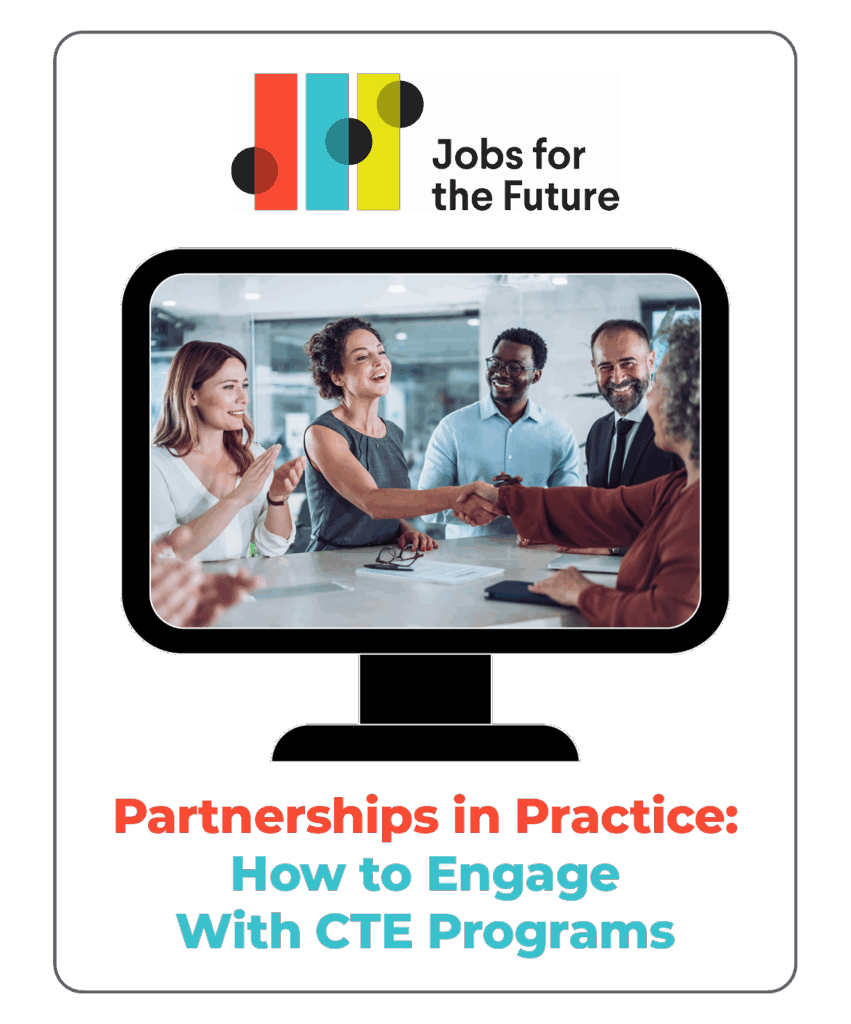
Partnerships in Practice: How to Engage With CTE Programs
This guide outlines a range of ways employers can engage with community college career and technical Education (CTE) programs, which are shown to be local sources of skilled workers. Offering strategies, tools, and advice for employers, it’s a companion piece to the JFF Power Your Workforce playbook.
Jobs for the Future
September 2025
Check out TWC’s college partnership case study for examples from transit of agencies engaging with their local college partners.

Power Your Workforce
This playbook introduces the business value of partnering with CTE, explains how these programs prepare learners with in-demand skills, and shows how employers can tap into this pipeline to meet current and future workforce needs. It explains how community college CTE programs work and provides a clear path to collaboration. It’s companion piece, Partnerships in Practice, offers strategies, tools, and advice for working with local colleges.
Jobs for the Future
September 2025
Check out TWC’s college partnership case study for examples from transit of agencies engaging with their local college partners.
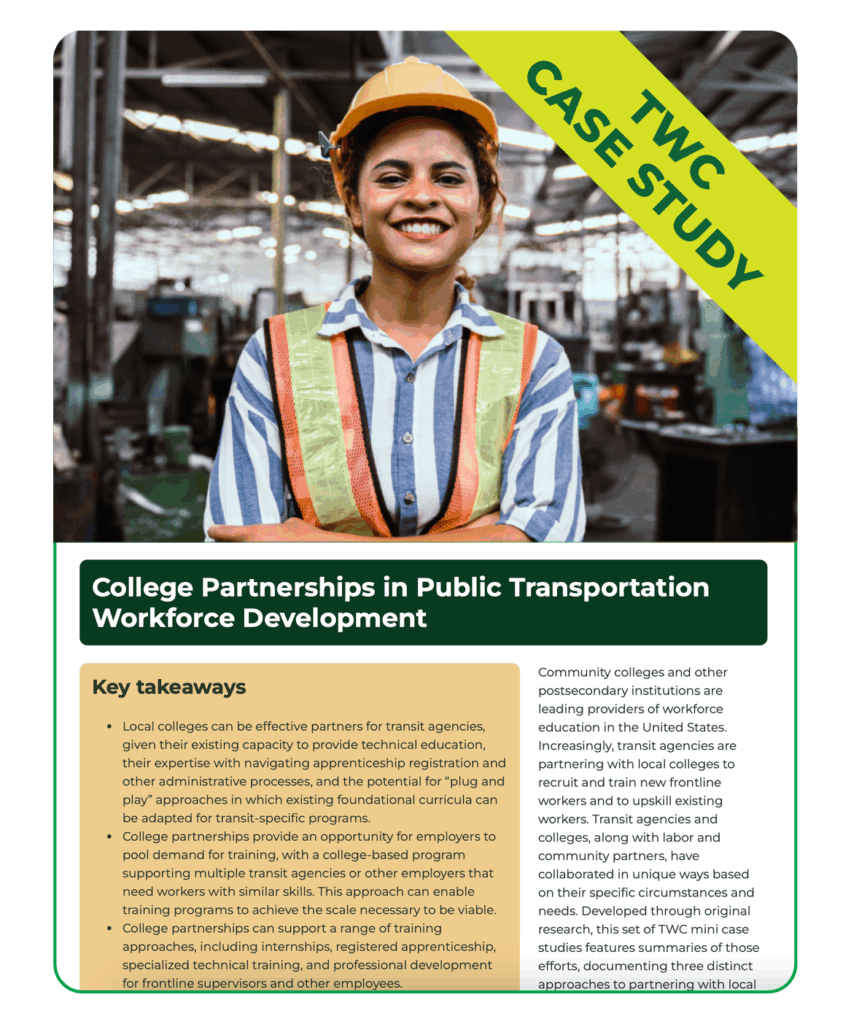
College Partnerships in Public Transportation Workforce Development
Community colleges and other postsecondary institutions are leading providers of workforce education in the United States. Increasingly, transit agencies are partnering with local colleges to recruit and train new frontline workers and to upskill existing workers. Transit agencies and colleges, along with labor and community partners, have collaborated in unique ways based on their specific circumstances and needs. Developed through original research, this set of TWC mini case studies features summaries of those efforts, documenting three distinct approaches to partnering with local colleges.
Transit Workforce Center
September 2025
TOPICS: Apprenticeship , Career Pathways , Community Engagement , Hiring and Recruitment , Training
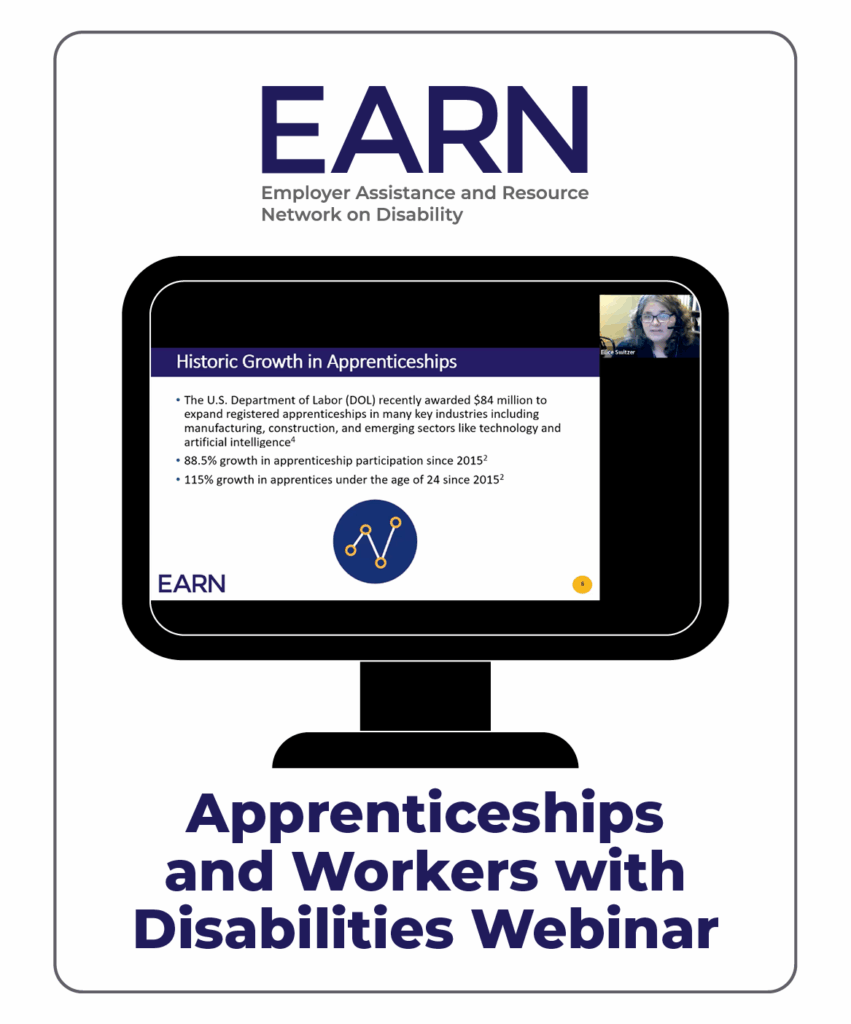
Apprenticeships and Workers with Disabilities Webinar
Employer Assistance and Resource Network on Disability
August 2025
Paid apprenticeships combine education and on-the-job training to prepare workers for long-term career success. By ensuring that all qualified candidates, including those with disabilities, have an opportunity to access apprenticeship opportunities, employers benefit from a broader pool of qualified workers. This webinar recording details practical strategies for recruiting and supporting apprentices with disabilities, as well as where to find recruitment resources and how to develop partnerships to build a talent pipeline. It also highlights a case example of a manufacturing business that credits its partnership with a local community-based organization serving jobseekers with disabilities with saving the local business.
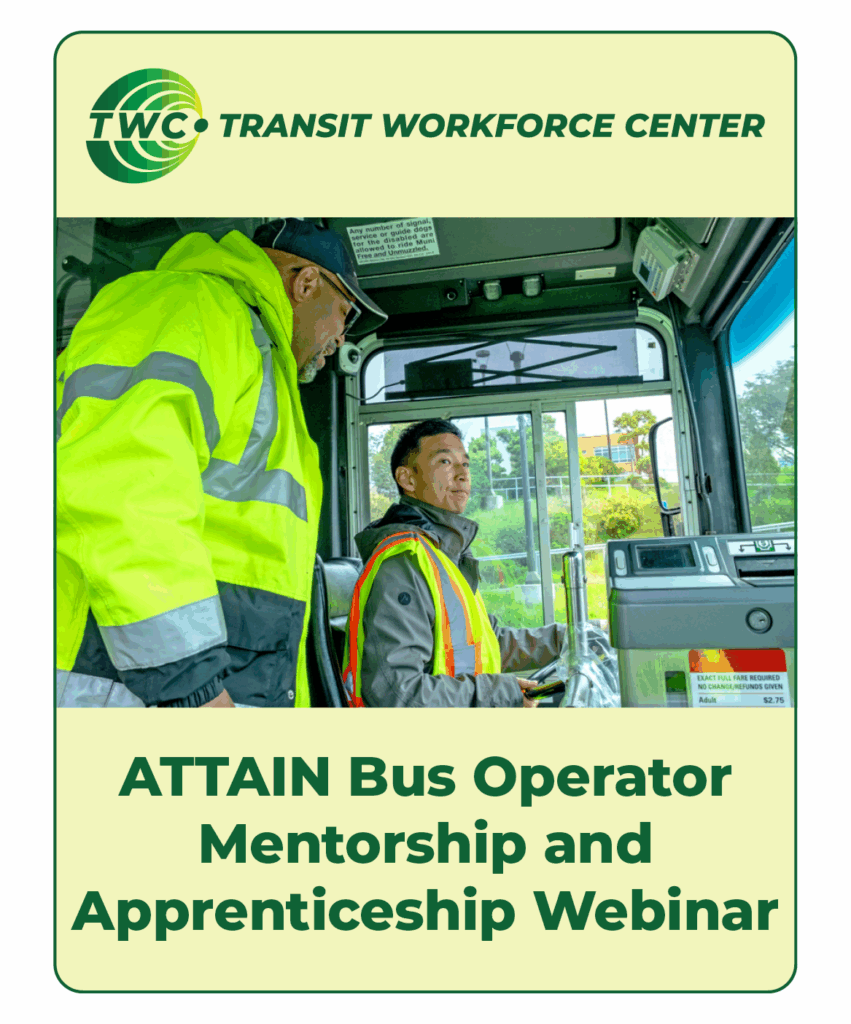
ATTAIN Bus Operator Mentorship and Apprenticeship Webinar
Transit Workforce Center
July 2025
This webinar featured presenters from Greater Richmond Transit Company (GRTC)/ATU Local 1220 in Virginia and Champaign-Urbana Mass Transit District (MTD) in Illinois.
- GRTC and ATU Local 1220 partnered to implement a mentorship program for their bus operators that launched in 2024. Presenters will describe that process, how the program has grown, and the benefits that it has provided.
- MTD launched its bus operator mentorship program in 2023 and has tracked metrics showing the program’s impact. Responding to both quantitative measures and qualitative feedback and observations, MTD is working to restructure the program to better meet the needs of the transit agency and the bus operators participating in the program as mentees or mentors.
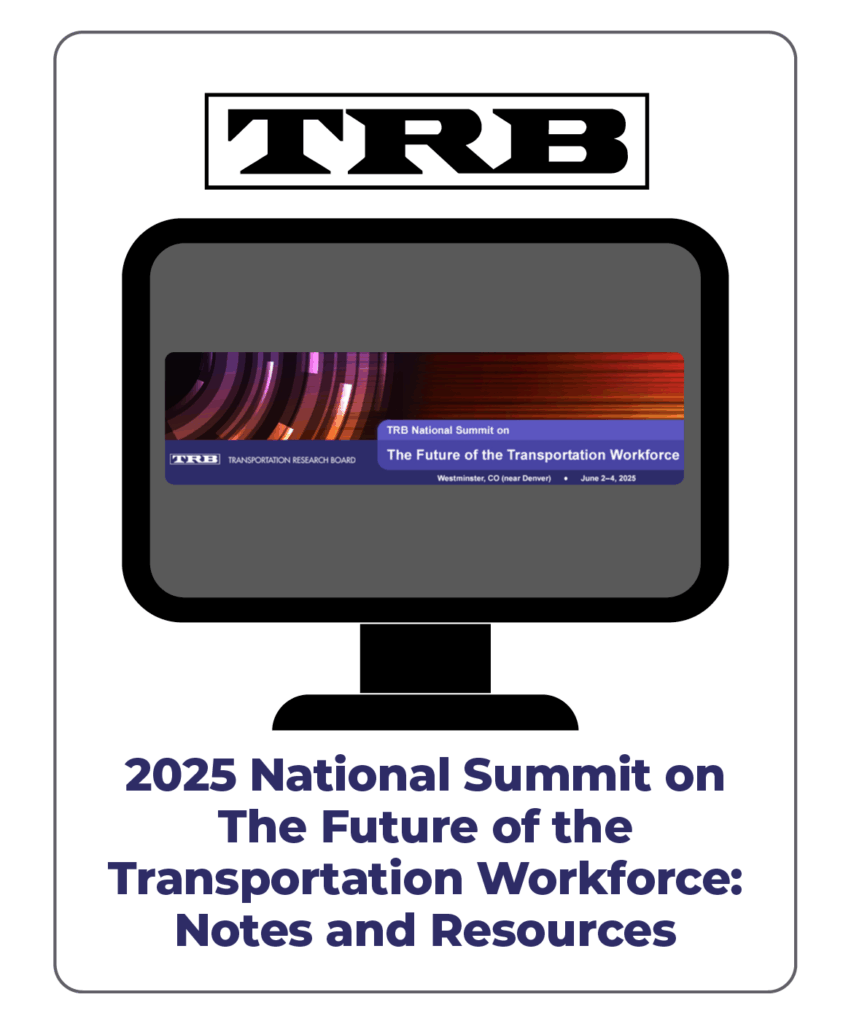
2025 National Summit on The Future of the Transportation Workforce: Notes and Resources
TRB held the National Summit on the Future of the Transportation Workforce on June 2-4, 2025 in Westminster, CO. This was the first national conversation on this critical issue since 2012. Thought leaders in transportation workforce recruitment, training, retention, and knowledge management met to discuss and address the challenges faced in each step of the workforce life cycle. Attendees included representatives from federal, state, and local transportation agencies; Metropolitan Planning Organizations; public transit agencies; academia; and private industry. Notes and resources from the conference can be found on this landing page.
Transportation Research Board
June 2025
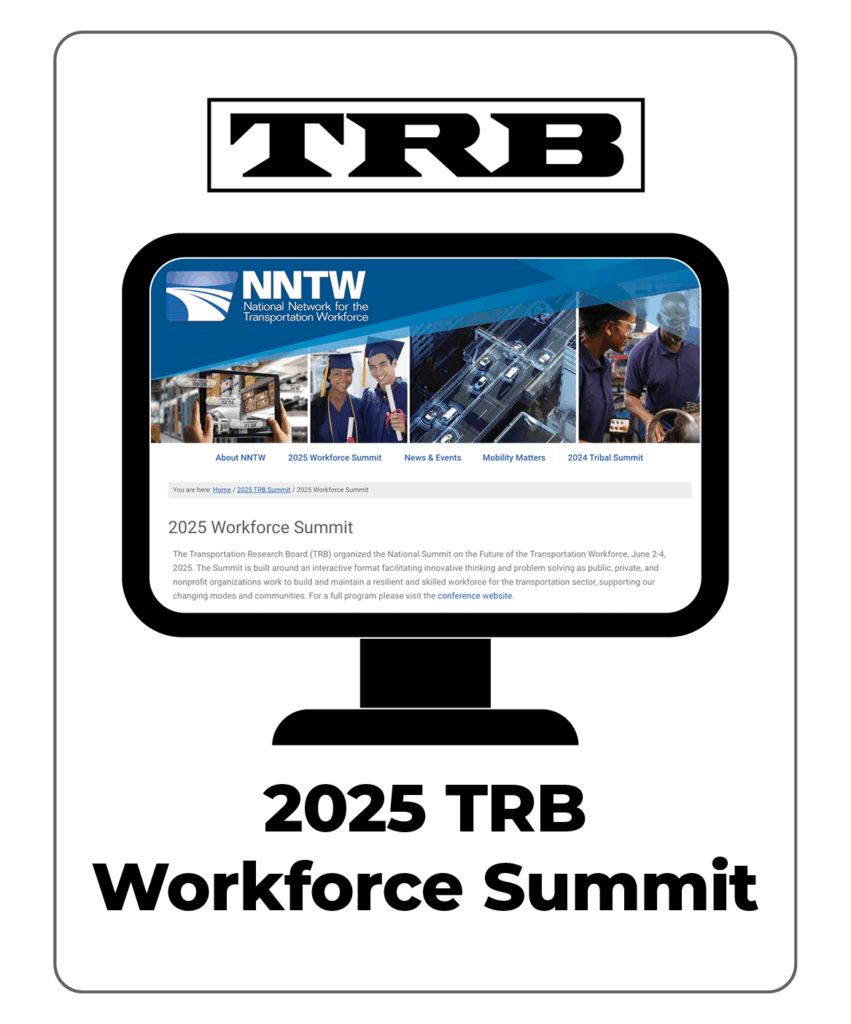
2025 TRB Workforce Summit
The Transportation Research Board (TRB) organized the National Summit on the Future of the Transportation Workforce, June 2-4, 2025. The Summit is built around an interactive format facilitating innovative thinking and problem solving as public, private, and nonprofit organizations work to build and maintain a resilient and skilled workforce for the transportation sector, supporting our changing modes and communities. This landing page provides links to pre-conference webinars and briefing papers from summit sessions.
Transportation Research Board
June 2025
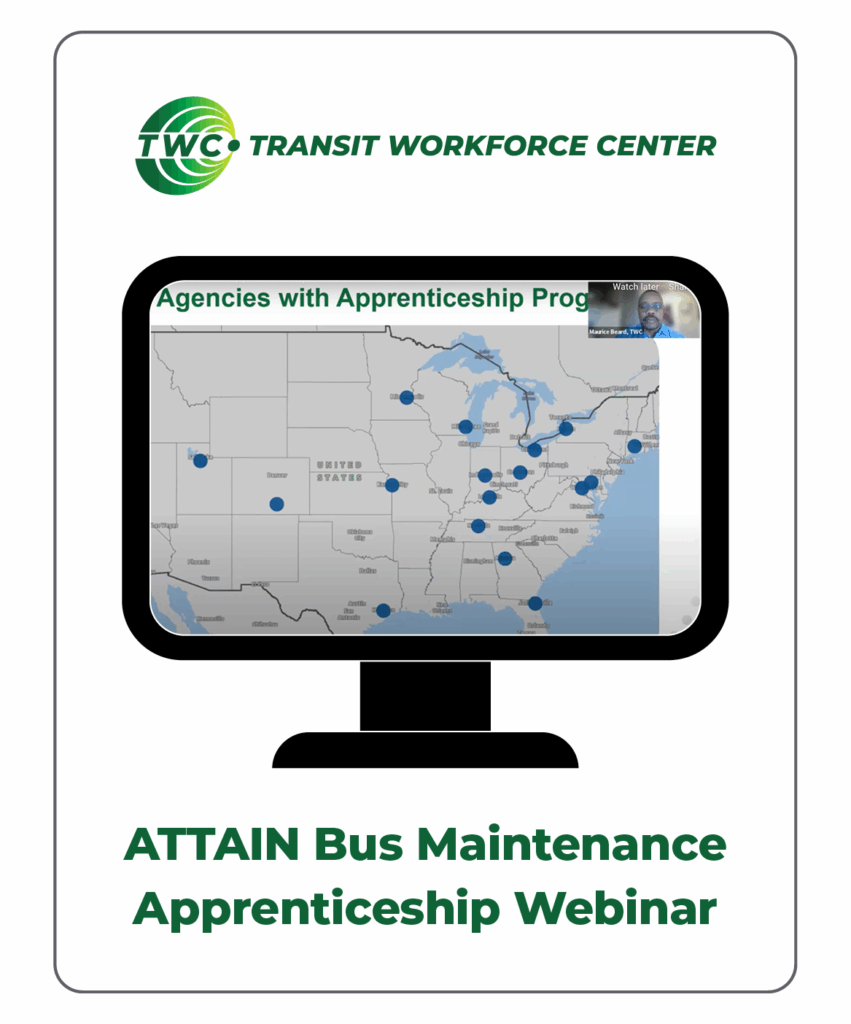
ATTAIN Bus Maintenance Apprenticeship Webinar
Transit Workforce Center
May 2025
This ATTAIN webinar focused on bus maintenance apprenticeship programs and featured Milwaukee County Transit System/Amalgamated Transit Union Local 998 and Jacksonville Transit Authority/International Association of Machinists and Aerospace Workers Lodge 759. Panelists from these transit agencies and labor unions outlined the development process and the final structure of their apprenticeship programs while highlighting how this strategy was implemented and why it works, offering benefits for both the agency and the workforce.
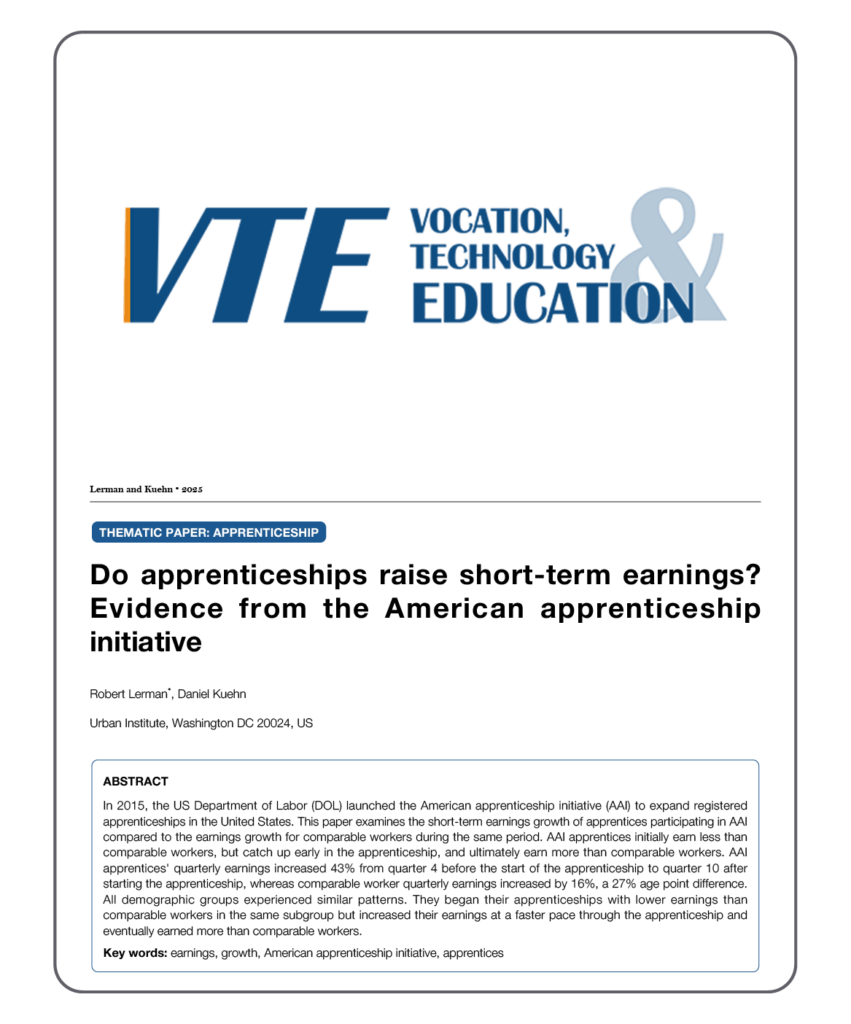
Do apprenticeships raise short-term earnings? Evidence from the American apprenticeship initiative
Vocat Tech Edu.
May 2025
TOPICS: Apprenticeship , Career Pathways , Community Engagement , Policy and Planning
This paper examines the short-term earnings growth of apprentices participating in the American apprenticeship initiative (AAI) compared to the earnings growth for comparable workers during the same period. Researchers found that AAI apprentices initially earn less than comparable workers, but catch up early in the apprenticeship, and ultimately earn more than comparable workers.
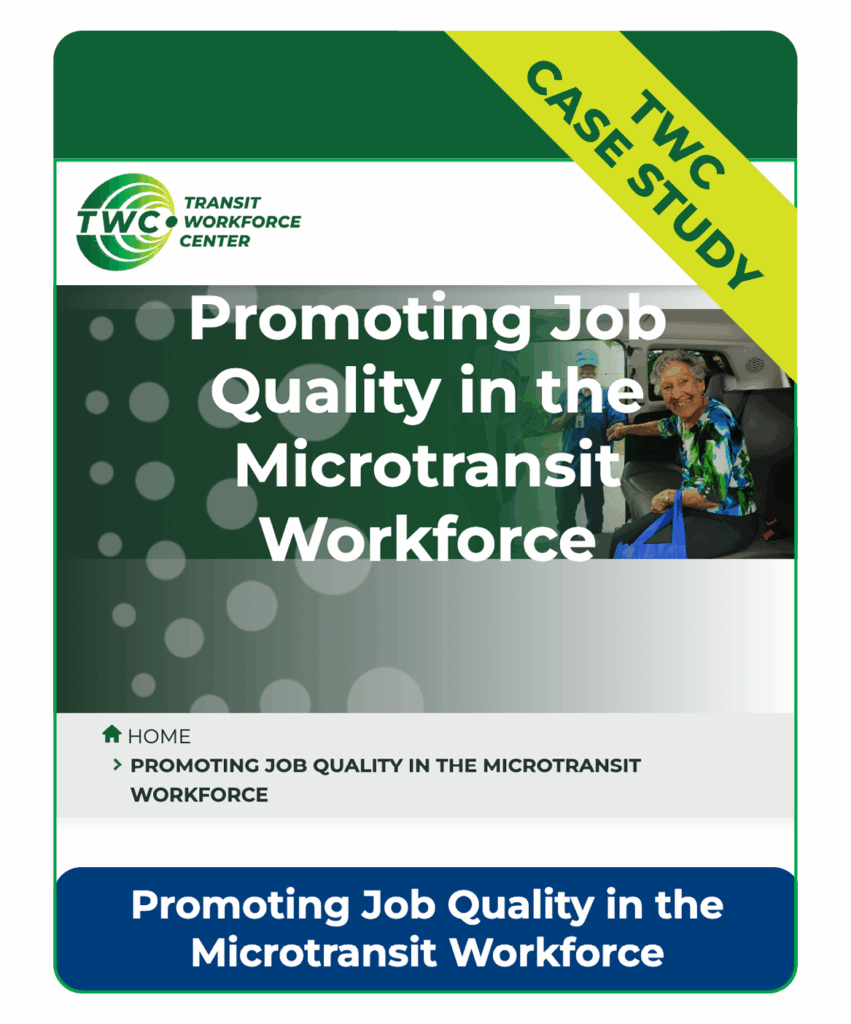
Case Study: Promoting Job Quality in the Microtransit Workforce
Microtransit, a relatively new form of demand response public transportation, is on the rise. TWC’s new set of microtransit case studies provides various perspectives on microtransit that include examples of how it has successfully been provided in-house and with a union-represented workforce. The case studies share experiences from four transit locations that are implementing microtransit service in ways that promote job quality for operators, technicians, and others, while also providing greater control over the quality of the service.
Transit Workforce Center
May 2025
TOPICS: Career Pathways , Hiring and Recruitment , Policy and Planning , Retention , Training
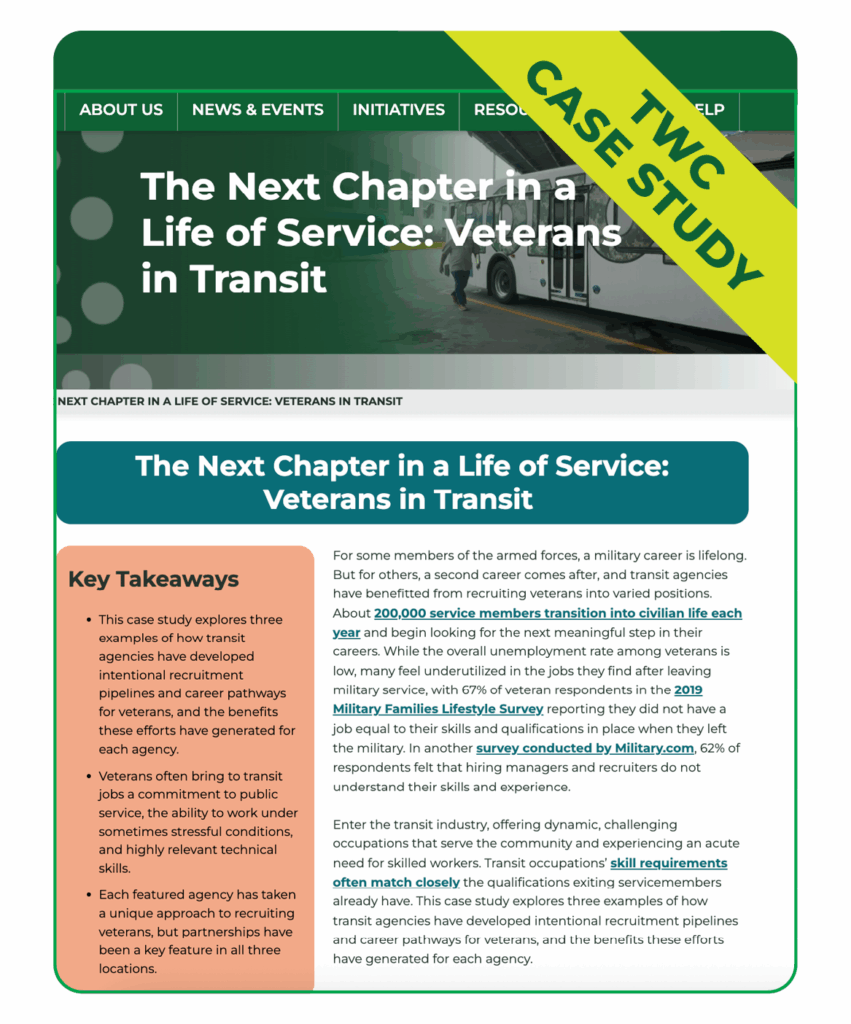
Case Study—The Next Chapter in a Life of Service: Veterans in Transit
For some members of the armed forces, a military career is lifelong. But for others, a second career comes after, and transit agencies have benefitted from recruiting veterans into varied positions. About 200,000 service members transition into civilian life each year and begin looking for the next meaningful step in their careers.
The transit industry offers dynamic, challenging occupations that serve the community and is experiencing an acute need for skilled workers. Transit occupations’ skill requirements often match closely the qualifications exiting servicemembers already have. This case study explores three examples of how transit agencies have developed intentional recruitment pipelines and career pathways for veterans, and the benefits these efforts have generated for each agency.
Transit Workforce Center
March 2025
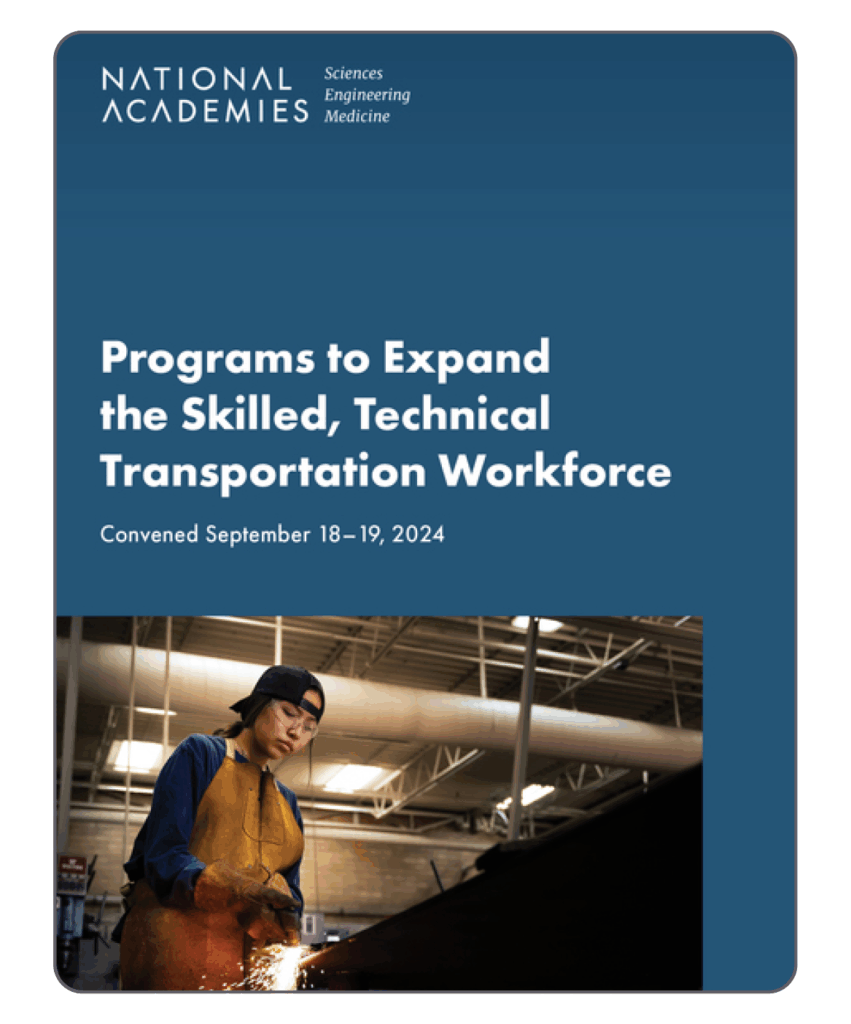
Programs to Expand the Skilled, Technical Transportation Workforce
Programs to Expand the Skilled, Technical Transportation Workforce: Proceedings of a Workshop summarizes the Workforce held in September 2024 at the National Academies of Sciences Building in Washington, DC. The workshop was sponsored by the Federal Transit Administration and the National Science Foundation and brought together experts and educators across academia, government, and industry.
National Academies of Sciences Engineering and Medicine
March 2025
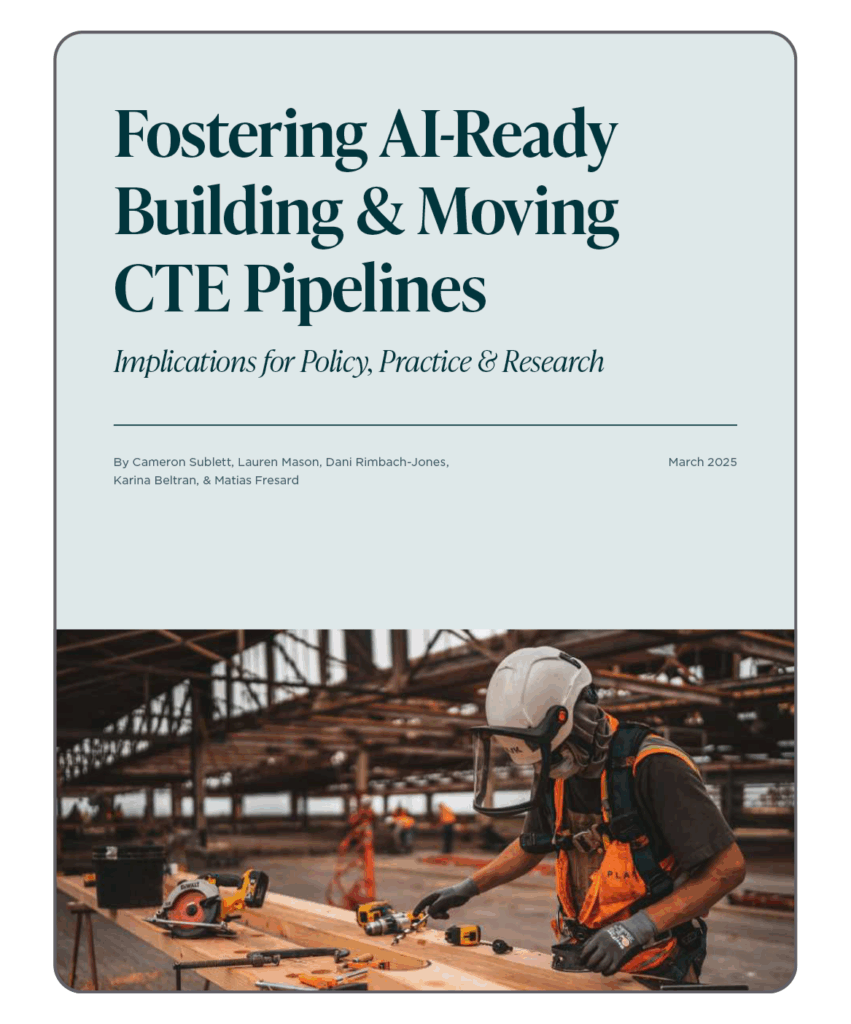
Fostering AI-Ready Building & Moving CTE Pipelines
This report explores how current and projected developments in AI are revolutionizing building and moving occupations, the potential exposure of building and moving occupations to AI-driven workforce automation, and how building and moving career and technical education providers can prepare their learners for a workplace increasingly shaped by AI technologies.
Advance CTE
March 2025
TOPICS: Career Pathways , Policy and Planning , Retention , Training
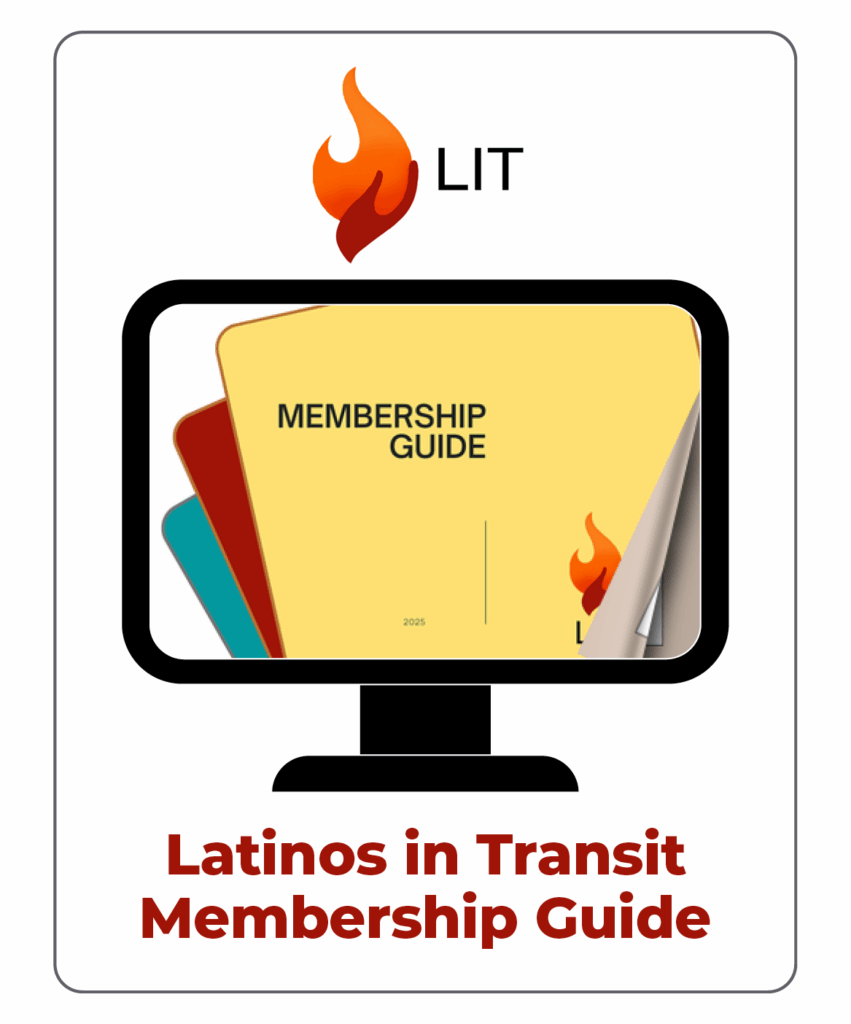
Latinos in Transit Membership Guide
Latinos in Transit is committed to empowering professionals in the transit industry to achieve leadership roles by advancing opportunities for workforce development, mentorship, networking, and education. The LIT Membership Guide explains membership levels and benefits, as well as programming, access, participation, opportunities, and more.
Latinos in Transit
TOPICS: Career Pathways , Community Engagement , Policy and Planning
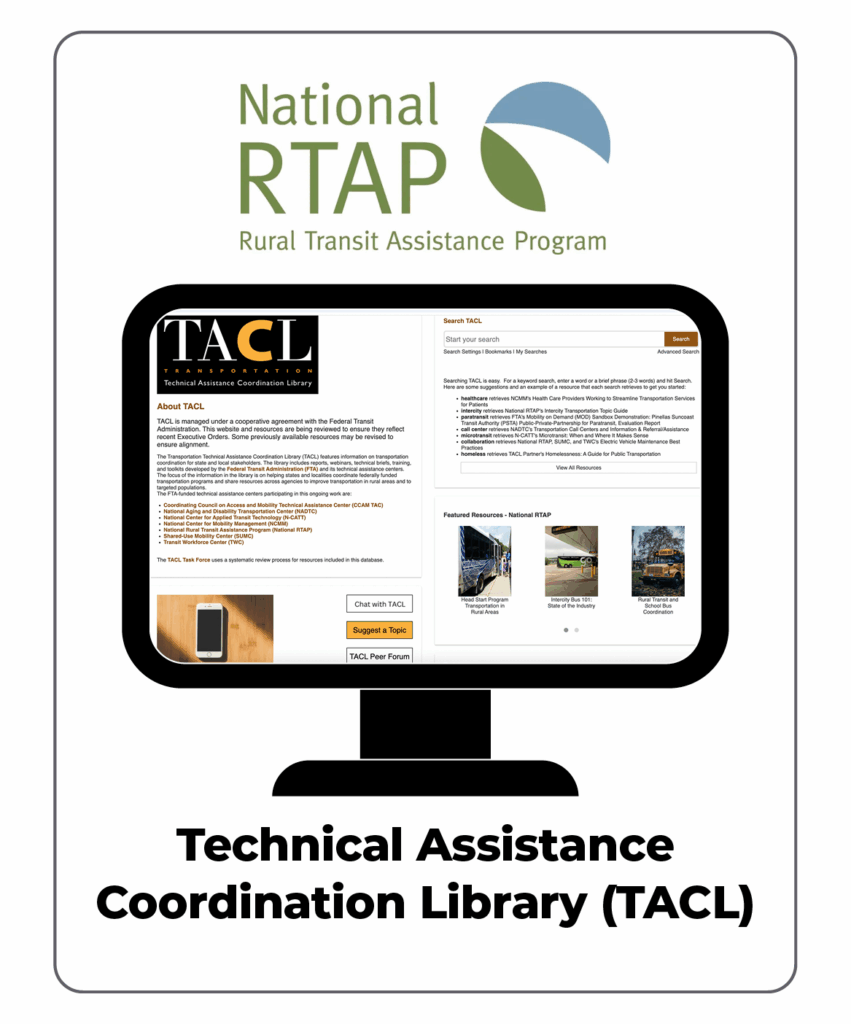
Technical Assistance Coordination Library (TACL)
National Rural Transit Assistance Program
TOPICS: Apprenticeship , Career Pathways , Community Engagement , Hiring and Recruitment , Labor-Management Partnerships , Low-No , Mentorship , Policy and Planning , Procurement , Program Evaluation and ROI , Retention , Safety and Health , Trainer and Mentor Development , Training , Workforce Shortage
Transportation Technical Assistance Coordination Library (TACL)
The Transportation Technical Assistance Coordination Library (TACL) provides a viable methodology and platform for access and findability of rural and tribal transit coordination resources across a broad range of transportation technical assistance centers and the Federal Transit Administration (FTA).
The FTA-funded Technical Assistance (TA) Centers participating in this ongoing work are:
- National Aging and Disability Transportation Center (NADTC)
- National Center for Applied Transit Technology (N-CATT)
- National Center for Mobility Management (NCMM)
- National Rural Transit Assistance Program (National RTAP)
- Shared Use Mobility Center (SUMC)
- Transit Workforce Center (TWC)
The TACL Task Force uses a systematic review process for resources included in the database. New resources will be added on a quarterly basis. Let us know if you would like to serve as a peer reviewer for our resources.
Why was TACL created?
The United States Government Accountability Office (GAO) published Public Transportation: Enhanced Federal Information Sharing on Coordination Could Improve Rural Transit Services in January 2020. GAO recommended that FTA “develop a communication plan that will effectively share information with state and local stakeholders on coordination opportunities in an accessible and informative way.” This effort was created to improve interagency resource coordination between FTA and its five TA Centers.
How can TACL be used?
TACL resources can be used to identify high quality technical assistance on transportation coordination. The resources can be used for research, training, practice, operations, planning, and other purposes. We encourage authors to cite TACL resources.
Ready to get started?
Visit http://transportation-tacl.org. Click on the Training tab at the top for instructions.
If you have a question about TACL, or if you would like to be considered to become a TACL peer reviewer, please contact info@nationalrtap.org
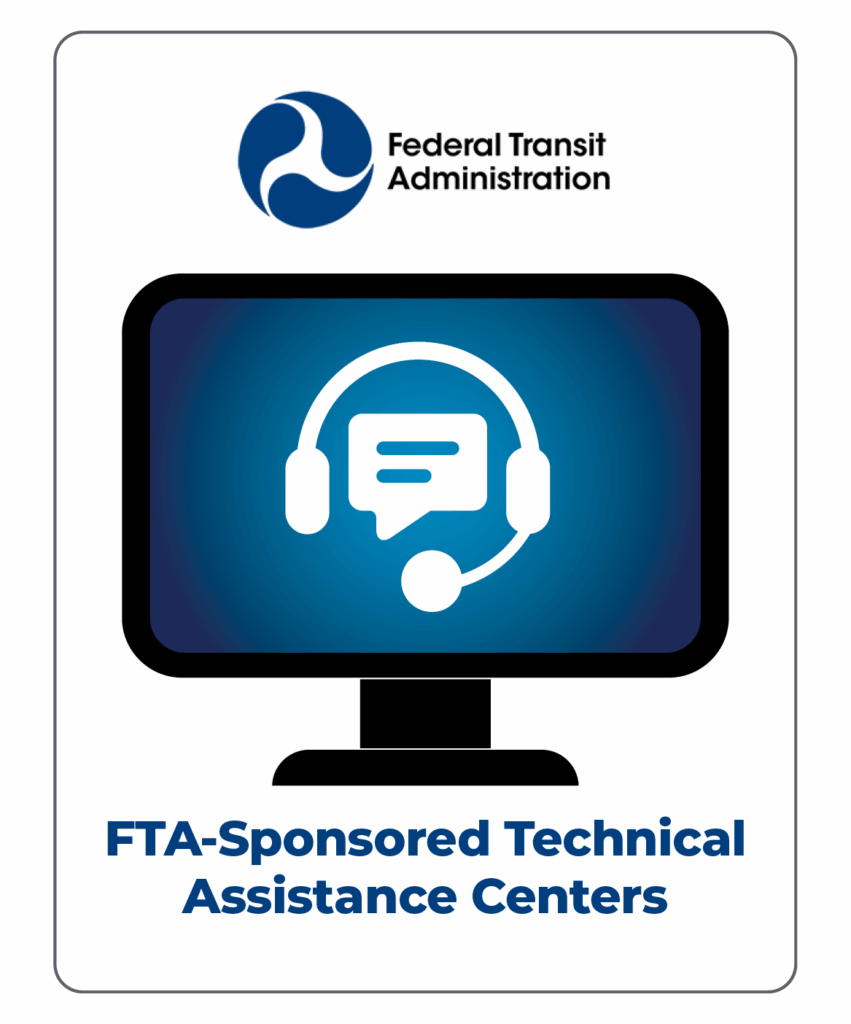
FTA-Sponsored Technical Assistance Centers
Federal Transit Administration
TOPICS: Apprenticeship , Career Pathways , Community Engagement , Hiring and Recruitment , Labor-Management Partnerships , Low-No , Mentorship , Policy and Planning , Procurement , Program Evaluation and ROI , Retention , Safety and Health , Trainer and Mentor Development , Training , Workforce Shortage
FTA’s Technical Assistance and Workforce Development Program (49 U.S.C. § 5314) and the Public Transportation Innovation Program (49 U.S.C. § 5312) fund technical assistance centers through national nonprofit organizations across a number of areas to improve public transportation. These nonprofit partners and the work they do play a critical role in supporting public transit agencies. Their services help to:
- Improve transportation for older adults and people with disabilities
- Drive the adoption of mobility management and related promising practices
- Accelerate innovative mobility practices and strategies
- Support rural communities
- Leverage new transit technologies
- Train the public transit workforce
- Provide workforce development technical assistance
- Support research projects chosen by the transit industry that address day to day issues
- Support the transit industry meet safety regulations
National Center for Applied Transit Technology (N-CATT)
The National Center for Applied Transit Technology (N-CATT) delivers expert, focused technical assistance to transit agencies and organizations in rural areas and small cities to use or develop transit technologies and innovations that make services more cost-effective and efficient. N-CATT’s work supports FTA’s mission and focus on innovation by developing and supporting transit programs and services in rural and small-city America.
National Aging and Disability Transportation Center (NADTC)
The National Aging and Disability Transportation Center (NADTC) is a national technical assistance center funded by FTA with guidance from the U.S. Department of Health and Human Services’ Administration for Community Living to promote the availability of transportation options that serve the needs of people with disabilities, seniors and caregivers with a focus on the Section 5310 program and other transit investments. NADTC supports the delivery of more effective, efficient, high-quality and coordinated specialized transportation services that maximize federal investments. NADTC provides technical assistance, information and referral; develops field training; implements interactive communication and outreach strategies; and supports communities in assessing their needs and developing innovative transportation solutions.
National Rural Transit Assistance Program (National RTAP)
The National Rural Transportation Assistance Program (RTAP) was established by FTA in 1987 to provide a wide range of professional services and products. National RTAP addresses the training and technical assistance needs of rural and tribal transit programs across the nation and supports state RTAP programs. National RTAP provides comprehensive free technical assistance programs and resources including training materials, webinars, newsletters and technical briefs, peer resources, research, and innovative technology initiatives. The National RTAP also manages the Transportation Technical Assistance Coordination Library (TACL), which provides a sustainable methodology and platform to access resources across a diverse range of transportation technical assistance centers and FTA.
Shared-Use Mobility Center (SUMC)
The Shared-Use Mobility Center is a public-interest organization dedicated to achieving equitable, affordable, and environmentally sound mobility across the US through the efficient sharing of transportation assets. By connecting the public and private sectors, piloting programs, conducting new research, and providing policy and technical expertise to cities and regions, SUMC seeks to extend the benefits of shared mobility for all. The Shared Mobility 2030 Action agenda includes improving access to public transit, on-demand shuttles or buses, ride-on-demand services, carpooling and vanpooling, and carsharing, bikesharing and scooter-sharing.
Coordinating Council on Access and Mobility (CCAM)
The strategic goal of CCAM, operated but the Community Transportation Association of America, is to support federal agencies, their grantees, partners, and stakeholders in improving transportation access for people with disabilities, older adults, and individuals of low income. CCAM promotes and facilitates human services transportation, public transit, and non-emergency medical transportation (NEMT) coordination that advances people’s access to everyday destinations.
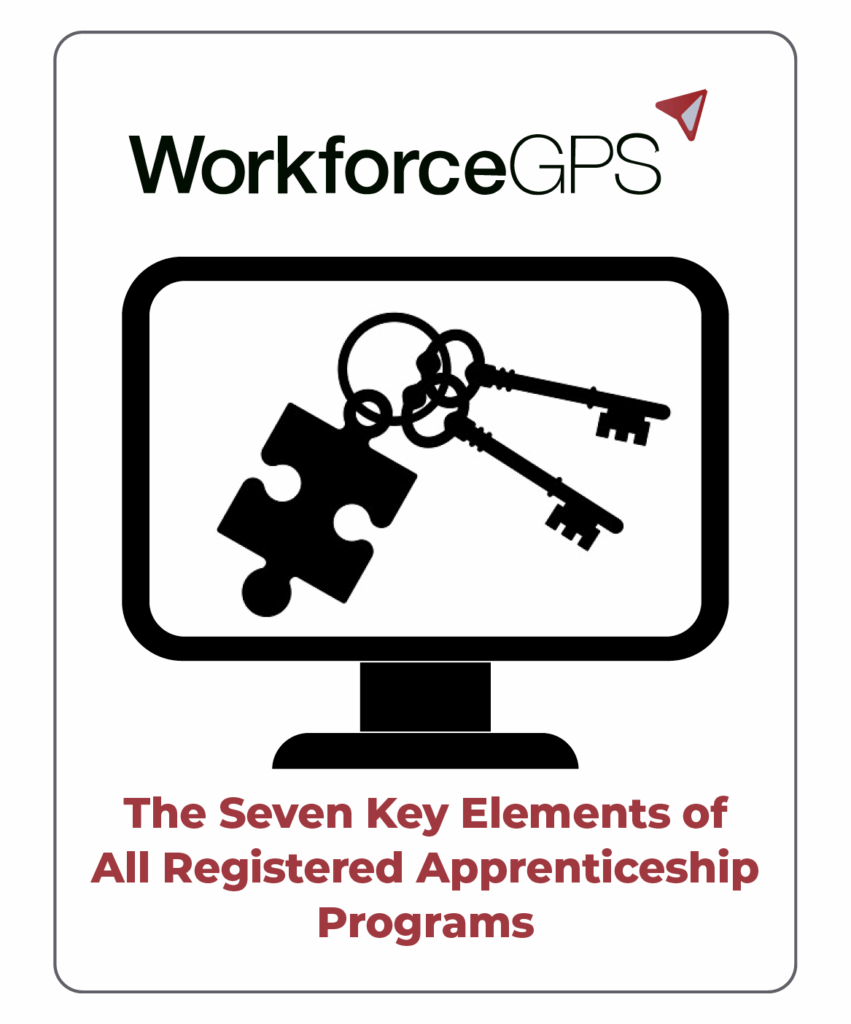
The Seven Key Elements of All Registered Apprenticeship Programs
Workforce GPS
January 2025
TOPICS: Apprenticeship , Career Pathways , Trainer and Mentor Development , Training
Registered Apprenticeship is an industry-driven pathway to high-quality careers where employers can develop and prepare their future workforce, and individuals can obtain paid work experience; progressive wage increases; classroom instruction; and a portable, nationally recognized credential. The U.S. Department of Labor recently updated the way we describe Registered Apprenticeship Programs to reflect the worker safety elements embedded in those programs.
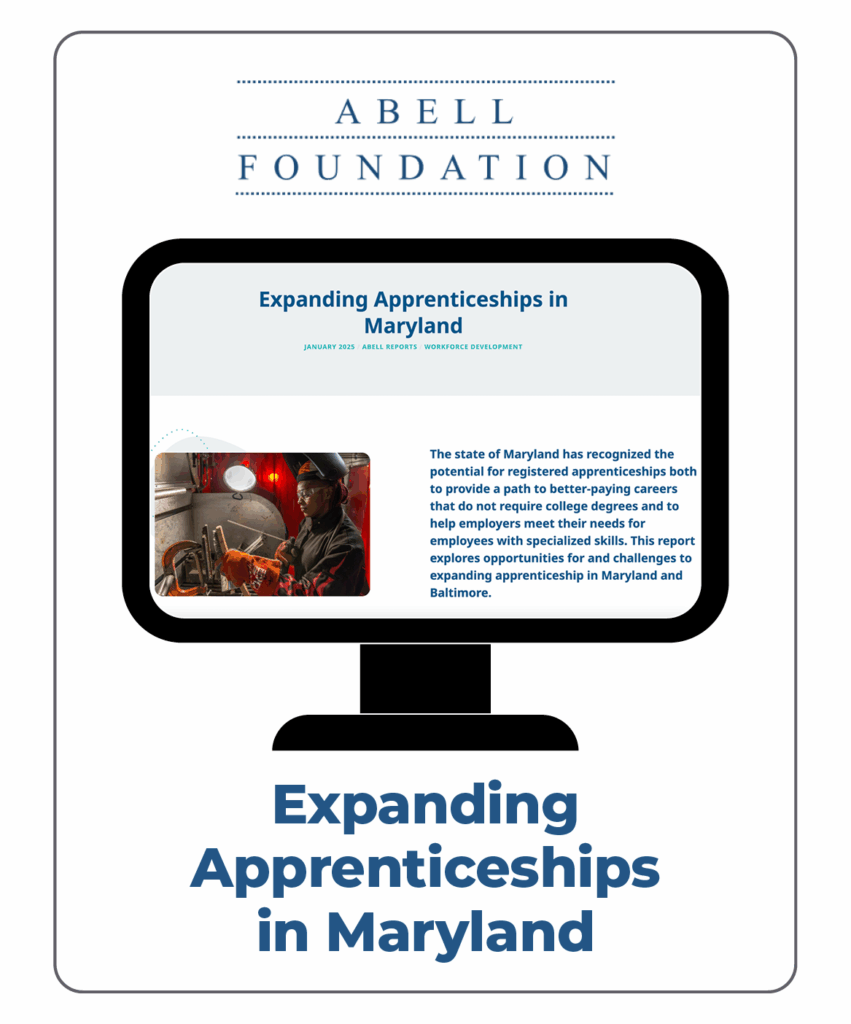
Expanding Apprenticeships in Maryland
The state of Maryland has recognized the potential for registered apprenticeships both to provide a path to better-paying careers that do not require college degrees and to help employers meet their needs for employees with specialized skills. This report explores opportunities for and challenges to expanding apprenticeship in Maryland and Baltimore.
Abell Foundation
January 2025
TOPICS: Apprenticeship , Career Pathways , Community Engagement , Policy and Planning
The report includes topics such as overcoming barriers to participation, such as transportation and childcare; countering employer misconceptions about apprenticeship; supporting apprenticeship in non-traditional sectors; and improving data collection and analysis.
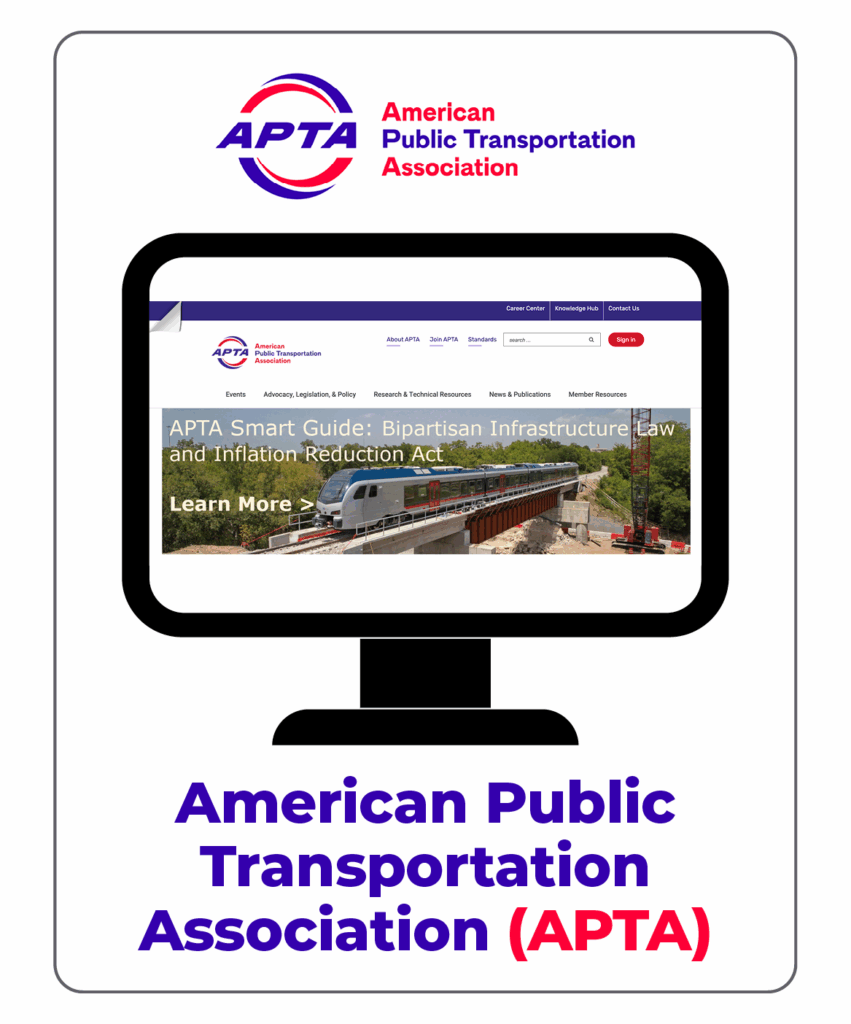
American Public Transportation Association (APTA)
APTA is a nonprofit international association of more than 1,500 public and private sector member organizations. Organizations must pay for membership; benefits include advocacy for federal funding and policies, research, technical expertise and consulting services, workforce development programs, educational conferences and seminars, and 135 subject-matter working committees, including a workforce development committee
American Public Transportation Association
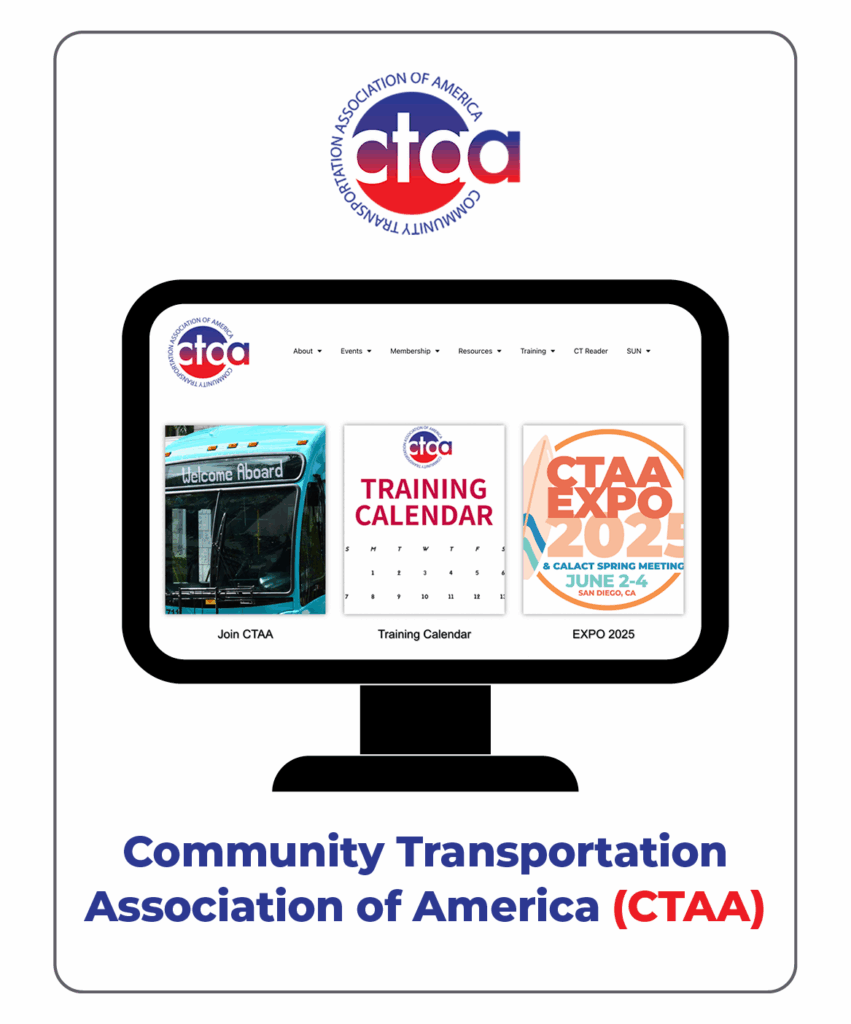
Community Transportation Association of America (CTAA)
CTAA is a nationally recognized expert in rural, small urban, tribal and specialized transportation services. Founded by a small group of community transportation professionals in 1989, organizations and individuals have joined CTAA as members to share strategies, receive training and certification specific to their needs, advance policy and legislative priorities, and improve mobility options in their communities.
Community Transportation Association of America
CTAA members get discounted access to all CTAA training and certification programs – including the annual Community Transportation EXPO and other CTAA Events – and help set the training and certification class agenda with opportunities to suggest and develop new courses and sessions.
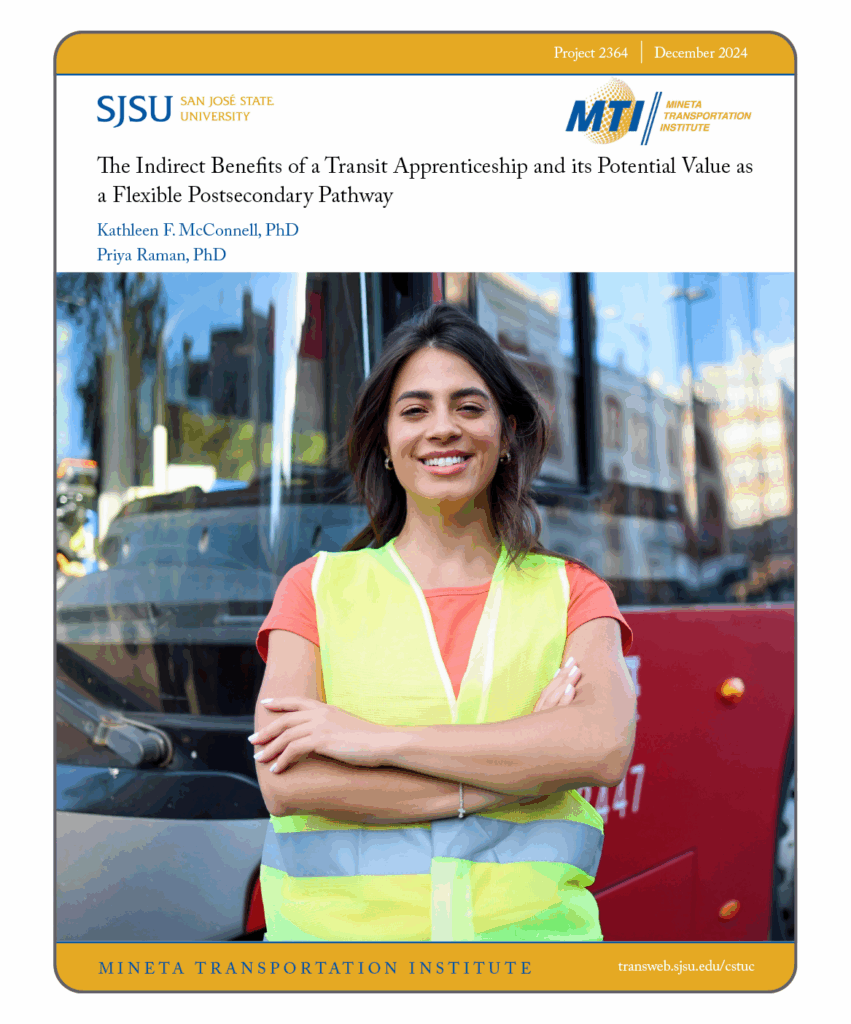
The Indirect Benefits of a Transit Apprenticeship and its Potential Value as a Flexible Postsecondary Pathway
As apprenticeships become more prevalent in the transit industry, they can also emphasize both technical and soft skills to invest in career advancement. This can attract young people to transit careers, which helps address challenges with recruitment and an aging workforce. Santa Clara Valley Transportation Authority’s Joint Workforce Initiative (JWI) employs this model by formally recognizing skills acquisition with accredited certificates. This study explores the JWI’s strengths within the revival of non-degree credentials fueled by efforts like the California Guided Pathways Program. Drawing on guidelines for connecting job training with degree programs, the study details the importance of affordability, portability, and articulation and outlines how these features could be further developed in the JWI.
Mineta Transportation Institute
December 2024
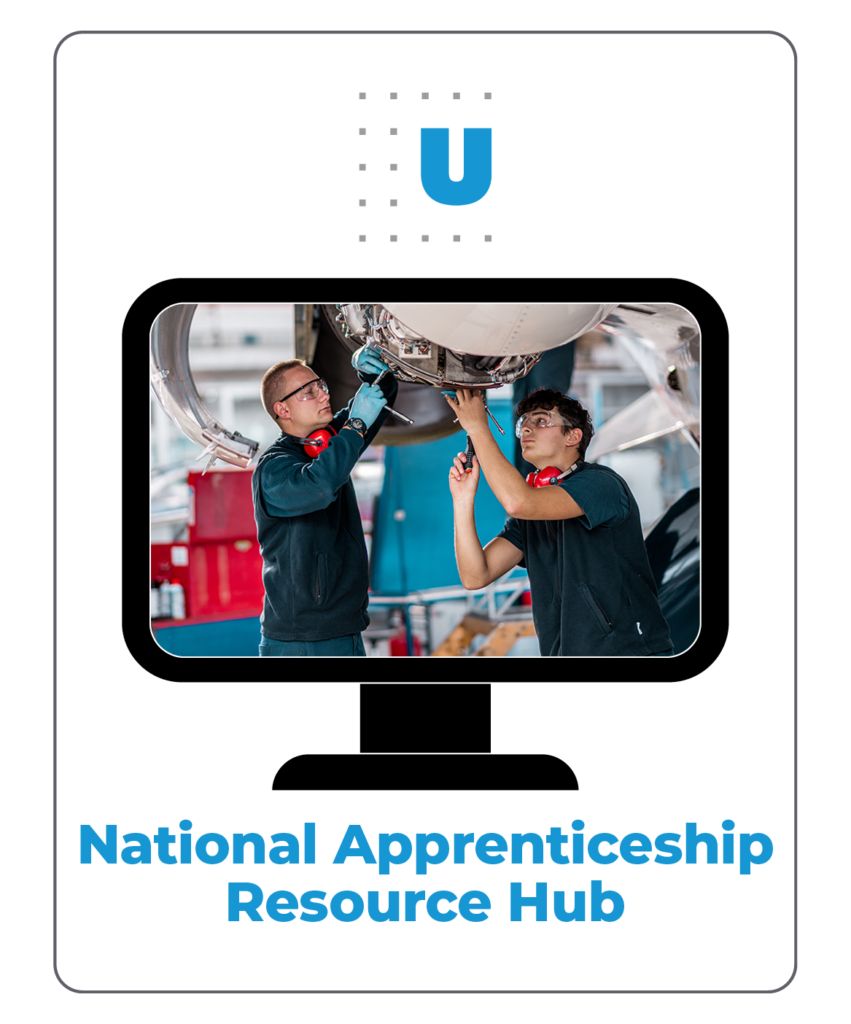
National Apprenticeship Resource Hub
The Urban Institute
December 2024
TOPICS: Apprenticeship , Career Pathways , Trainer and Mentor Development , Training
The National Apprenticeship Resource Hub includes Occupational Frameworks which can help develop a new apprenticeship program or refine an existing program. Each framework outlines the basic information sponsors need to register an apprenticeship program in their occupation including an occupational overview that describes the occupation, alternative job titles, and any prerequisites; a work process schedule that outlines what organizations can expect apprentices to learn on the job and the required hours; and a related technical instruction outline that presents considerations for courses and training apprentices can pursue during the apprenticeship. The National Occupational Frameworks also include detailed instructions on how to use them when creating your registration application.
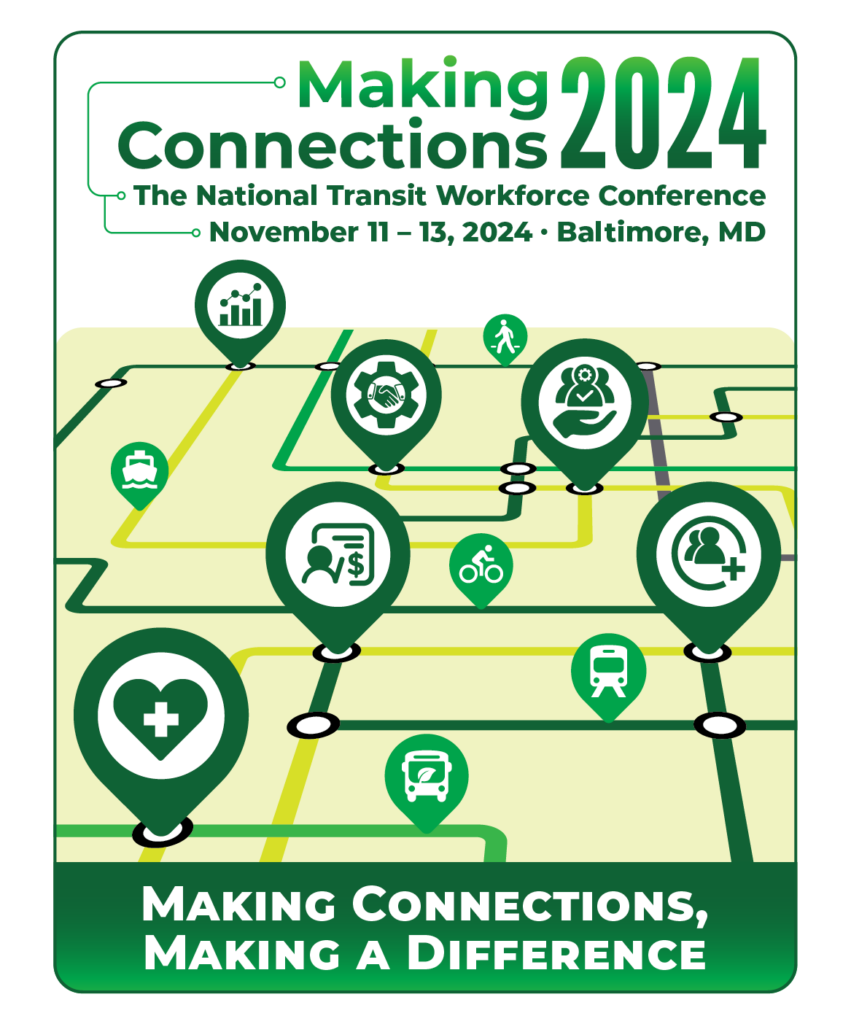
Making Connections 2024 – The College Connection: Strategies for Effective Partnerships
This session about partnerships between transit and local colleges was presented as part of TWC’s Making Connections 2024 transit workforce conference in November, 2024.
Transit Workforce Center
November 2024
Session Description: Strong partnerships between transit and local colleges across the country currently support recruitment, retention, apprenticeships and other career advancement initiatives developed by agencies and their workforce partners. Presenters in this session reviewed and discussed several different models of industry-education partnerships, focusing on how to establish productive working relationships with local colleges to advance workforce development goals.
Moderator:
- Patricia Greenfield: Senior Director, Workforce Education – International Transportation Learning Center / Transit Workforce Center
Speakers:
- Jamaine “G” Gibson: Director of Apprenticeships and Workforce Development – Amalgamated Transit Union
- Jason Abbott: Executive Director, Workforce Operations – Cuyahoga Community College
- Celeste Chavis: Interim Chair and Professor, Transportation & Urban Infrastructure Studies – Morgan State University (Baltimore)
- Rich Diaz: Workforce Development Coordinator – Amalgamated Transit Union Local 1575
- Rob Gamble: Sr Workforce and Academic Strategist – California Transit Works!

Making Connections 2024 – Foundational Skills for Successful Career Pathways in a Changing Industry
This session about career pathways was presented as part of TWC’s Making Connections 2024 transit workforce conference in November, 2024.
Transit Workforce Center
November 2024
Session Description: In this engaging session attendees explored strategies for bridging the skills gaps of new hires and heard from presenters as they shared how they identified critical needs and implemented solutions. Participants took part in a working group to provide feedback on national resources being developed in key areas such as mechanical, electrical, computer skills, shop math, and technical writing.
Moderator:
- Kristen Ribaudo: Senior Instructional Designer – International Transportation Learning Center / Transit Workforce Center
Speakers:
- Michael Hanssen: Supervisor of Technical Skills Training Washington – Metropolitan Area Transit Authority
- Ona Veda: Manager, Rail Training and Development – Metro Transit (MN)

Making Connections 2024 – What Do Young People Want from a Transit Career?
This session about outreach and retention of youth in transit was presented as part of TWC’s Making Connections 2024 transit workforce conference in November, 2024.
Transit Workforce Center
November 2024
Session Description: As the transit industry works to reach out to the communities it serves to establish strong and effective career pipelines, agencies and their partners often explore how to best attract young people into the industry. In this session, attendees heard from and engaged with young people themselves, along with national and local experts who have conducted research and worked directly with youth. Topics covered include the most effective approaches to connecting with young people and creating awareness and excitement about career opportunities in public transportation.
Moderator:
- Dr. Beverly Scott: Founder and CEO – Introducing Youth to American Infrastructure
Speakers:
- Justin Augustine: Project Manager II – Alameda-Contra Costa Transit District
- Kayla Cooper-Redd: 12th Grade Student – TransSTEM Academy, Cardozo High School (DC)
- Sean Holley: Bus Transportation Instructor – Maryland Transit Administration
- Cheryl Rodgers: Director – TransSTEM Academy, Cardozo Education Academy (DC)
- Edwin Rodriguez: Director – Office of Research Management, Innovation, and Outreach – Federal Transit Administration
- Jamaal Schoby: Transportation Planner – Transportation Research Board

Making Connections 2024 – Apprenticeship 101 – How Transit Apprenticeship Operates
This session about transit apprenticeships was presented as part of TWC’s Making Connections 2024 transit workforce conference in November, 2024.
Transit Workforce Center
November 2024
Session Description: Apprenticeship programs are rapidly expanding at transit locations across the country. With quality training tied to clearly-identified career ladders and advancement, these programs are commonly regarded as the “gold standard” of workforce development. Documented benefits include increased retention, reductions in absenteeism, and the creation of a sustainable talent pipeline. These programs also result in better employee morale and a more engaged workforce. In this session, presenters walked through the essential steps to developing, registering, and implementing an apprenticeship program. Attendees heard from and engaged with transit labor and management about their joint programs including bus maintenance, traction power, HVAC/facilities, and signals/communications—and explore how to locate and access resources to support new and existing programs.
Moderator:
- Brian J. Turner: Founding Director – International Transportation Learning Center
Speakers:
- Michelle Allison: General Manager – King County Metro (WA)
- Maurice Beard: Senior Workforce Development Advisor –
- Norman Blessant: Financial Secretary/Treasurer – Amalgamated Transit Union Local 381 (UT)
- Rod Dunn: President – Amalgamated Transit Union Local 382 (UT)
- Brandee Gross: Program Manager, Workforce Development – Maryland Department of Transportation
- Dimas Koral-Arocho: Program Manager – King County Metro (WA)
- Stephanie Lewis: Workforce Development Project Manager – Center for Urban Transportation Research
- Kylee Parker: Shop Steward/Joint Apprenticeship Committee Chairman – Amalgamated Transit Union Local 1300 (MD)
- Jeff Stambaugh: Vice President – Amalgamated Transit Union Local 587 (WA)
- Greg Woodfill: President – Amalgamated Transit Union Local 587 (WA)

Making Connections 2024 – Successful Models for Career Awareness, Outreach, and Recruitment in Our Varied Communities
This session about national and agency-level workforce datasets was presented as part of TWC’s Making Connections 2024 transit workforce conference in November, 2024.
Transit Workforce Center
November 2024
Session Description: Consistent with FTA’s strategic goal of driving workforce recruitment, this session explored successful models and strategies for increasing awareness of transit careers among potential workers. Presenters also focused on approaches to recruiting and retaining individuals from varied backgrounds, emphasizing engagement with the communities transit serves. Through discussions of hands-on initiatives, mentoring and training programs, and partnerships between transit agencies and community organizations, this session explored various ways transit systems can create sustainable pipelines to attract and retain talent from communities of different sizes and demographics.
Moderator:
- David Stephen: Senior Communications Specialist – International Transportation Learning Center / Transit Workforce Center
Speakers:
- Scott Joiner: Senior Manager, Talent Acquisition – Bi-State Development/Metro Transit (St. Louis)
- Adam Parast: Enterprise and Strategic Initiatives Lead – King County Metro (WA)
- Antonio Pollard: Organizer – Amalgamated Transit Union Local 689 (DC)
- Dan Stoffer: Manager, Bus Instruction – Metro Transit (MN)
- Jaymi Swarbrick: Director of Human Resources – Merrimack Valley Transit (MeVa – MA)
- Trenise Winters: Assistant Executive Director – Bi-State Development/Metro Transit (St. Louis)

Making Connections 2024 – Making Mentoring Matter: Building and Strengthening Your Frontline Worker Mentorship Program
This full-day intensive session about mentorship was presented as part of TWC’s Making Connections 2024 transit workforce conference in November, 2024.
Transit Workforce Center
November 2024
Session Description: Are you looking to establish a program that increases retention, provides an edge in recruitment, and advances a positive and collaborative organizational culture? Well-organized mentorship programs with carefully-selected and trained mentors provide documented benefits for frontline workers and the organization as a whole. Check out this intensive full-day workshop to explore how to:
- Initiative, develop, manage, and maintain a strong mentorship program
- Establish a collaborative structure and culture that runs and maintains that program
- Select and train effective mentors
- Explore occupation-specific approaches, challenges, and systems
- Track metrics that measure progress and success
Throughout this full-day intensive, attendees engaged with experienced instructors, facilitators, and peers to:
- Review the foundational elements of transit-based mentorship programs
- Experience TWC’s mentor training program, including: a review of mentor roles; an introduction to varied learning styles; and an examination of communications and problem-solving skills
Moderators:
- Maurice Beard: Senior Workforce Development Advisor – International Transportation Learning Center / Transit Workforce Center
- Karitsa Holdzkom: Senior Policy Analyst – International Transportation Learning Center / Transit Workforce Center
Speakers:
- Stu Bass: Principal – Progress Worx; Founding Director – Keystone Development Partnership
- Nick Biggar: District Director – Greater Cleveland RTA
- Valerie Campo: Mentor Program Coordinator – Champaign-Urbana Mass Transit
- Lee Estis: Mentor Program Coordinator – Metropolitan Council-Metro Transit (MN)
- Jamaine “G” Gibson: Director of Apprenticeships and Workforce Development – Amalgamated Transit Union
- Steve Jovel: Operations Manager, Workforce Development – Santa Clara Valley Transportation Authority
- Vanessa L’Esperance: Apprenticeship Program Coordinator – Metro Transit/ATU Local 1005 (MN)
- Dionna McCane: ATU Mentorship and Apprenticeship Coordinator – IndyGo
- Darnell Morris: Vice President – ATU Local 268, Greater Cleveland RTA
- Harpreet Singh: JWI Co-Director – Santa Clara Valley Transportation Authority

Making Connections 2024 – Creating Community Partnerships for Transit Career Pathways
This half-day intensive session about community partnerships was presented as part of TWC’s Making Connections 2024 transit workforce conference in November, 2024.
Transit Workforce Center
November 2024
Session Description: Check out this immersive half-day session designed to provide information, tools, and strategies that build a foundation for career pathways for community members into good jobs and great transit careers. Participants engaged in dialogue with transit professionals on the opportunities in the industry, gain insight into communicating about these opportunities, and explore approaches to establishing working partnerships with transit agencies and their labor and workforce partners.
Attendees dove into strategies and principles for impactful engagement, hearing firsthand accounts of successful collaborative initiatives and messaging strategies that emphasize the impact and value of working in an industry providing a vital public good. Participants gained invaluable insights into building sustainable workforce solutions that mutually benefit the industry and the community.
Key topics included:
- Exploring transit career opportunities
- Messaging and framing
- Building collaborative partnerships
- Real-world success stories
Moderator:
- David Stephen: Senior Communications Specialist – International Transportation Learning Center / Transit Workforce Center
Speakers:
- Rich Diaz: Workforce Development Coordinator – Amalgamated Transit Union Local 1575
- Theus Jones: Recording Secretary – Amalgamated Transit Union Local 689 (DC)
- Antonio Pollard: Organizer – Amalgamated Transit Union Local 689 (DC)
- Vanessa Sparks: Committee Member – Community Board 12-Queens Transportation Committee
- Carlene Thorbs: Chairperson – Community Board 12-Queens Transportation Committee
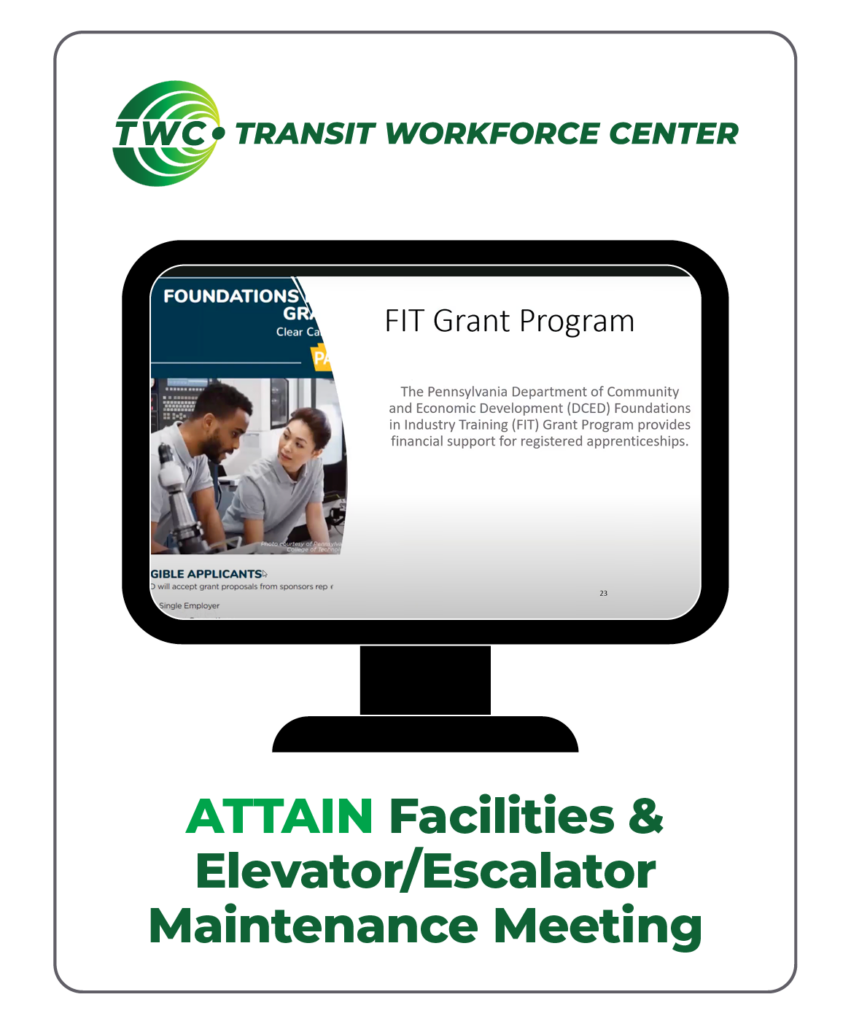
ATTAIN Facilities & Elevator/Escalator Maintenance Meeting
Transit Workforce Center
September 2024
The American Transit Training and Apprenticeship Innovators Network (ATTAIN) is a peer network created for transit agencies and labor unions to explore new apprenticeship programs or enhance existing programs for their frontline workforce. Through ATTAIN, TWC promotes apprenticeship, advances frontline worker training, facilitates peer exchange, and provides technical assistance to agencies and unions interested in developing apprenticeship programs for their frontline workforce.
This ATTAIN meeting featured discussions from Pittsburgh Regional Transit/ATU 85 and Bay Area Rapid Transit about how their facilities and elevator/escalator maintenance apprenticeship programs are developed, work, and the benefits they offer.
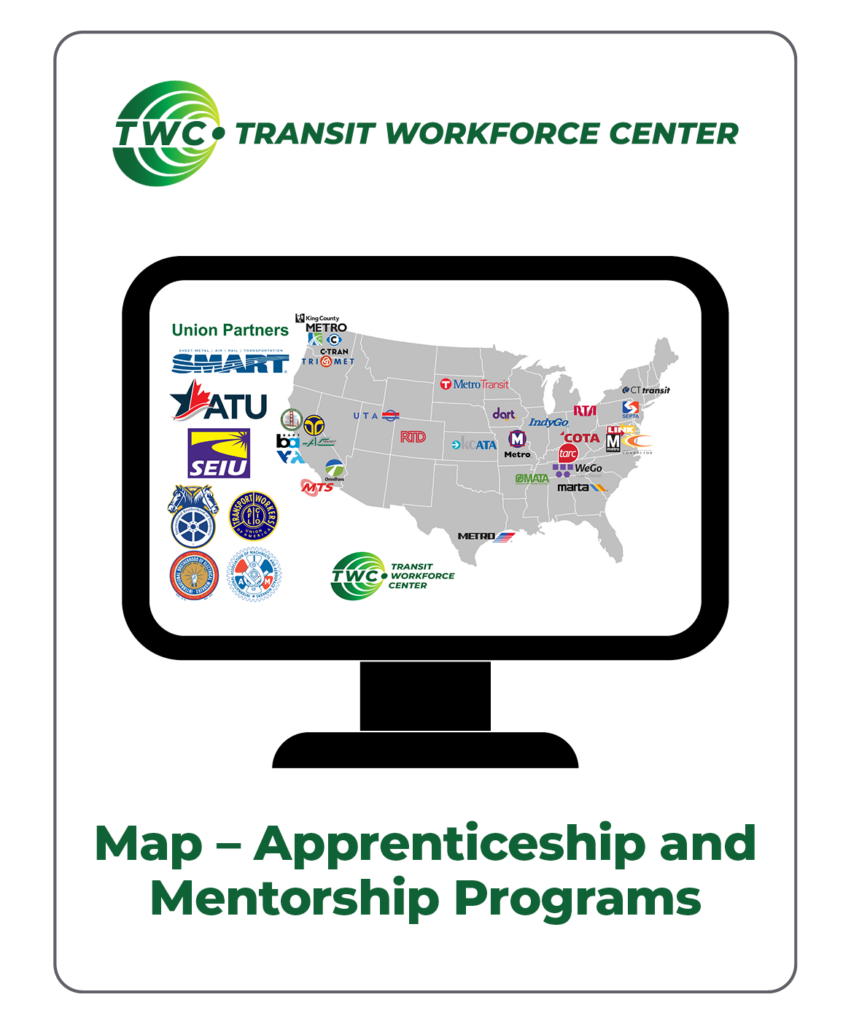
Map – Apprenticeship and Mentorship Programs
Visualizing the Growing Trend of Registered Apprenticeship in U.S. Transit Agencies
Over the past 10 years, the U.S. Department of Labor (DOL) and other federal agencies have invested heavily in promoting and supporting registered apprenticeship, resulting in a significant expansion of registered apprentice programs across the country. Likewise, the use of registered apprenticeship for frontline public transit occupations has increased significantly, with many transit agencies and their corresponding unions jointly adopting labor-management standards that create a framework for apprenticeship. Only five transit agencies had a registered apprenticeship program in 2013, compared with 30 transit agencies in 2023.
This map displays transit locations with registered apprenticeship or mentorship programs. Users can reveal information about the active apprenticeship/mentorship programs at each agency, the agency’s workforce-related statistics (such as wage, employee count, labor hours, and ridership), and links to Standards of Apprenticeship, which include details about qualifications, wages, hours, and training schedules.
Transit Workforce Center
September 2024
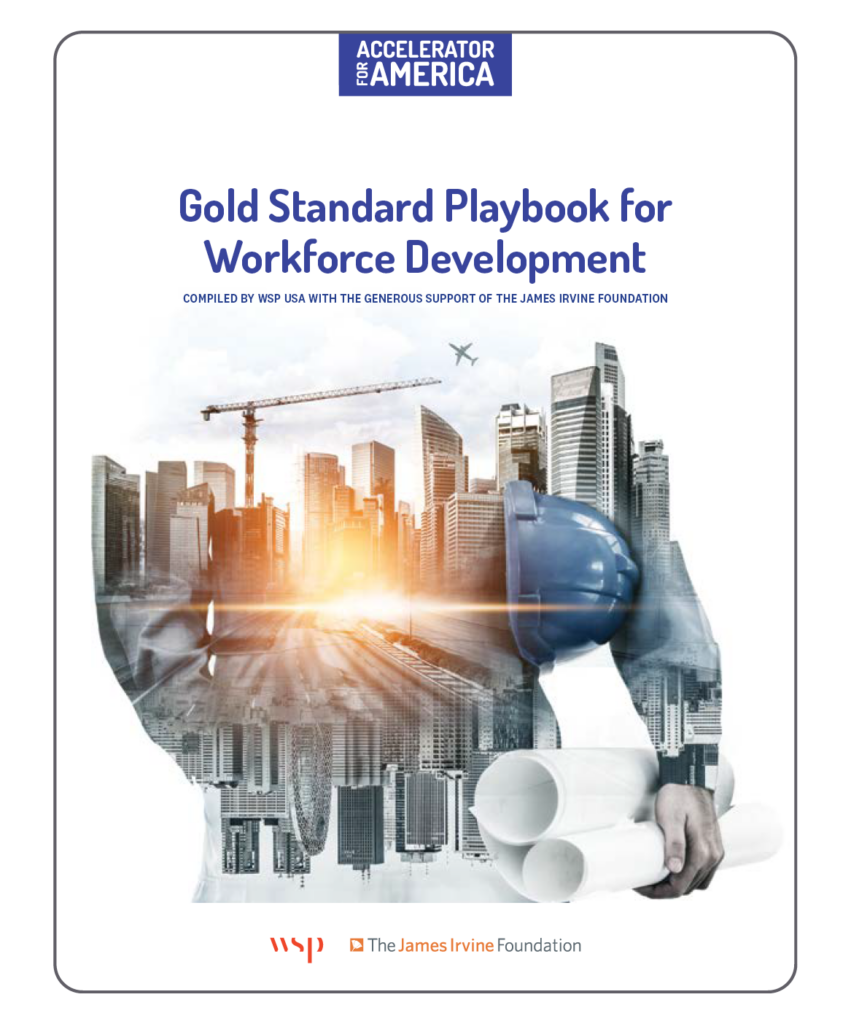
Gold Standard Playbook for Workforce Development
Accelerator for America
August 2024
This Workforce Development Playbook – a menu of malleable strategies and tactics that can be applied in different situational contexts – is meant to serve two purposes:
- To document best practices in workforce development focusing on California but with applicability nationally and sources.
- To set the first “Gold Standard” guiding owners who want to incorporate workforce development goals into their infrastructure projects.
To develop the Playbook, WSP and Accelerator for America (AFA) supported by The James Irvine Foundation, gathered information on current standards, practices, and barriers to workforce development efforts through interviews with key stakeholders across the industry in California, including project owners, community benefit organizations (CBOs), and government leaders.
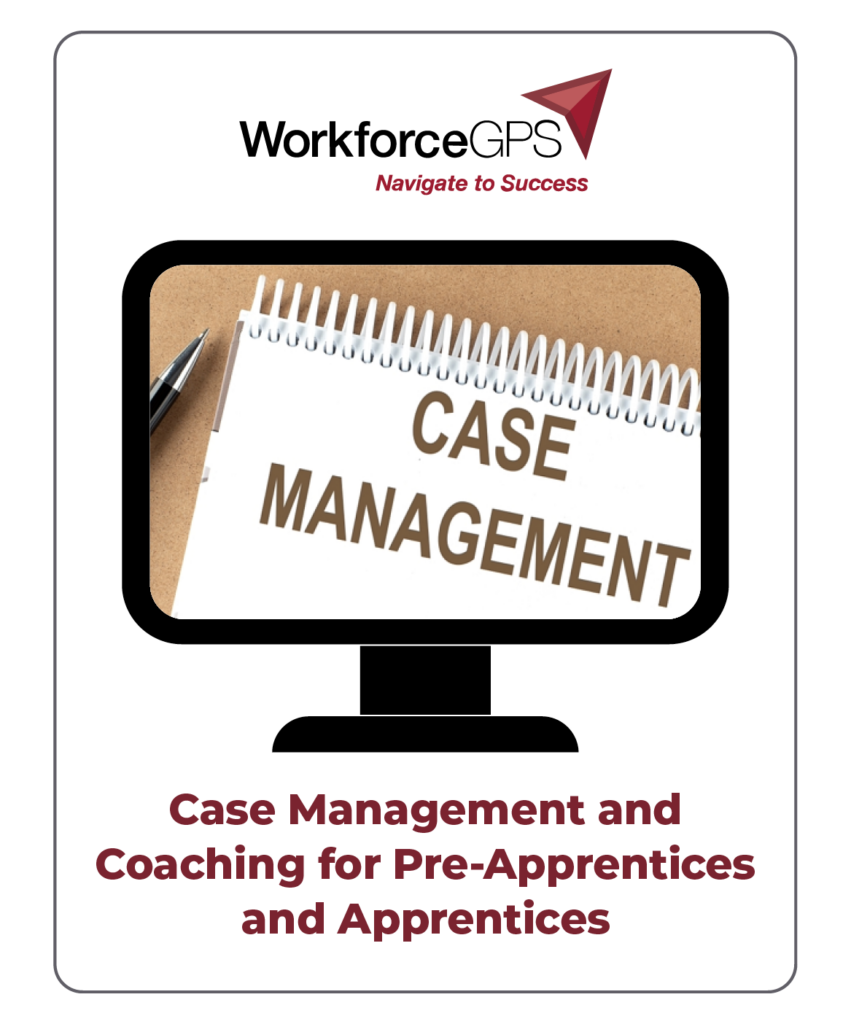
Case Management and Coaching for Pre-Apprentices and Apprentices
Workforce GPS
August 2024
TOPICS: Apprenticeship , Career Pathways , Mentorship , Trainer and Mentor Development , Training
Working with pre-apprentices and apprentices requires a combination of case management and coaching. This webinar provides the fundamentals of case management and coaching and teaches a framework for effective service delivery. This session also focuses on the use of assessments for productive service planning, quality program documentation and team communication for successful handoffs.
MODERATOR(S)
- Luis Roig, Contracting Officer’s Representative, Office of Apprenticeship, U.S. Department of Labor Employment and Training Administration
PRESENTER(S)
- Amy Landesman, Grantee Coach, ICF
- Valerie Taylor, Grantee Coach, ICF
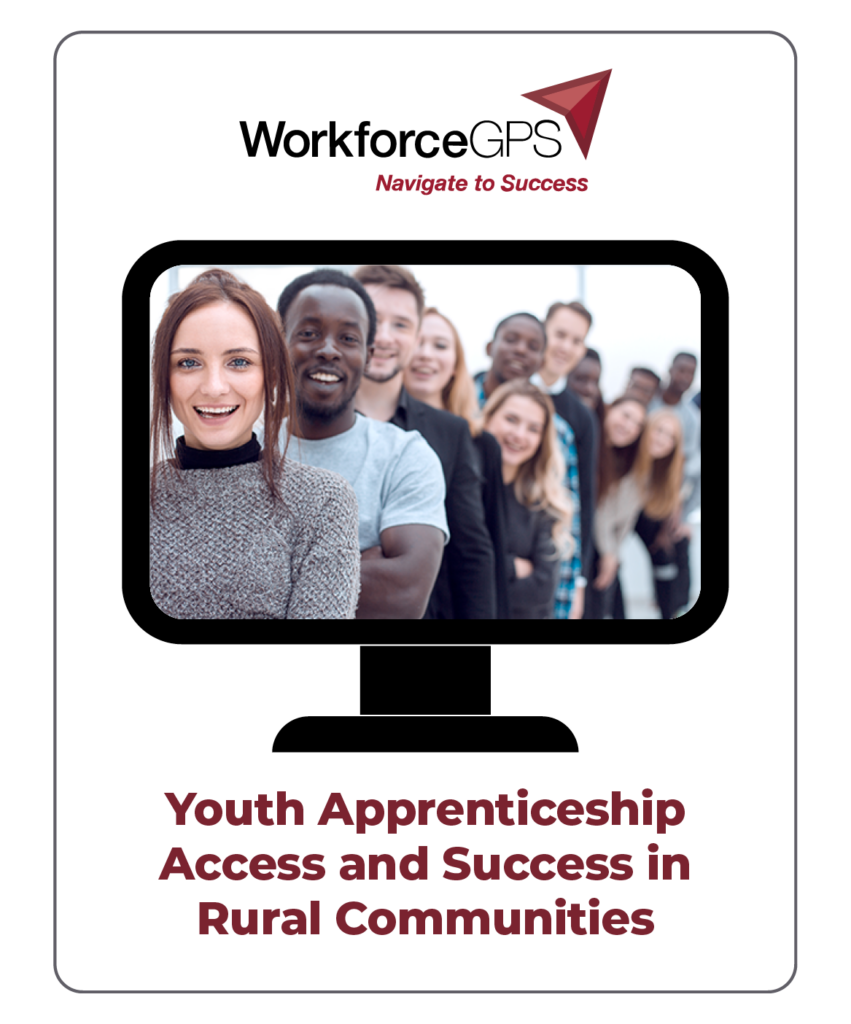
Youth Apprenticeship Access and Success in Rural Communities
WorkforceGPS
August 2024
In rural communities, widely dispersed populations face a multitude of access challenges. Faced with a declining talent pool, lower educational attainment, and rising poverty rates caused by the Covid-19 pandemic, there is an urgent need to prepare young people in rural areas for high-demand careers.
As part of the Implementing Workforce Programs for Rural Youth series, this webinar, hosted by the Office of Apprenticeship, focused on best practices and creative solutions for increasing pre-apprenticeship and youth apprenticeship access, enrollment, retention, and program completion for young people in rural areas. Featured youth apprenticeship intermediaries and partners shared their accomplishments in developing youth apprenticeship opportunities in rural areas, establishing networks of support, and best utilizing available resources to ensure pre-and youth apprenticeship success.
MODERATOR(S)
- Maisha Meminger, Manpower Analyst , Division of Youth Services, U.S. Department of Labor, Employment and Training Administration
PRESENTER(S)
- Vanessa Bennett, Associate Director, Center for Apprenticeship & Work-Based Learning, Jobs for the Future
- Zach Boren Senior Policy Program Manager, Urban Institute
- Bhavani Arabandi, Senior Research Associate, Urban Institute
- Jacqueline Rayfield, Policy Analyst, Urban Institute
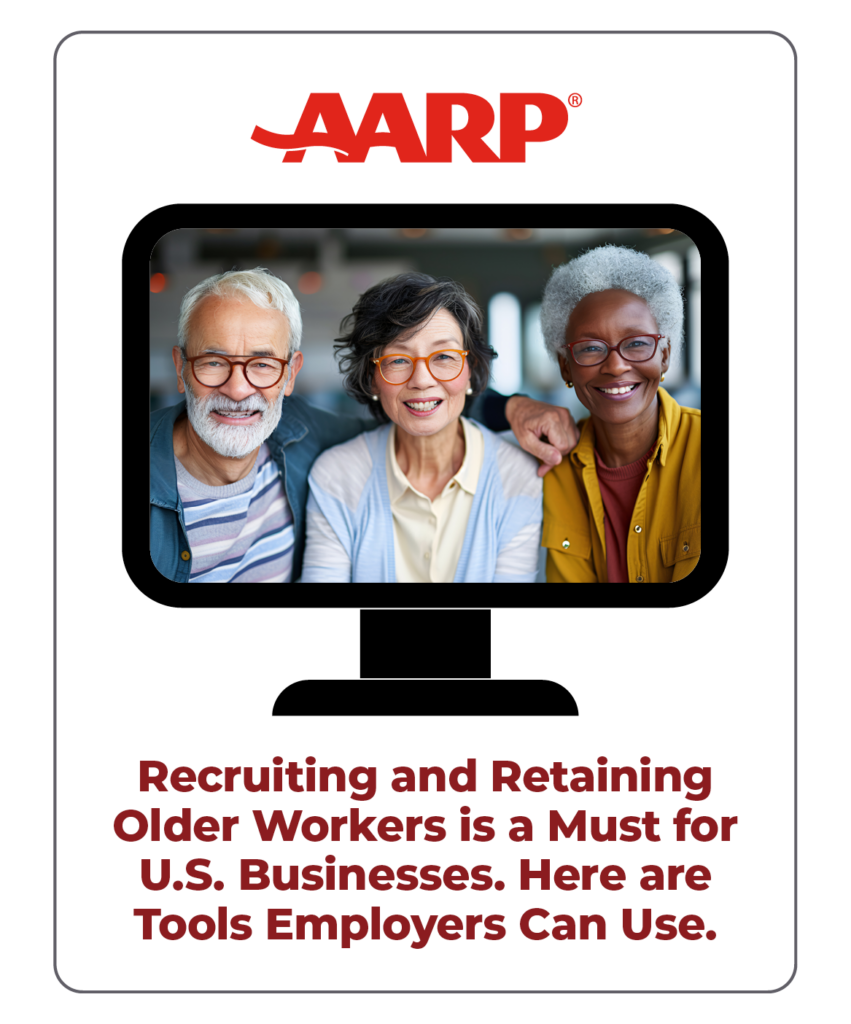
Recruiting and Retaining Older Workers is a Must for U.S. Businesses. Here are Tools Employers Can Use.
AARP
July 2024
Shifting demographics in the U.S. workforce indicate that businesses are probably going to need to recruit, train, and retain older workers to ensure their companies remain competitive. However, workplace surveys indicate that most firms are currently not prepared to find and welcome workers who are 50 years of age or older.
Fortunately, a broad array of evidence-based hiring and talent development strategies are at the ready for U.S. employers. These strategies draw from a recent and comprehensive review of employer practices and their influence on economic security and mobility for U.S. workers.
Three key connected takeaways for employers to consider as they plan for ways to leverage this segment of the workforce are as follows:
• Engage directly with older employees in developing their digital skills.
• Seek out the social networks in which older workers operate to find the best recruiting matches.
• Lean into current or former employees and their online connections to identify these social networks.
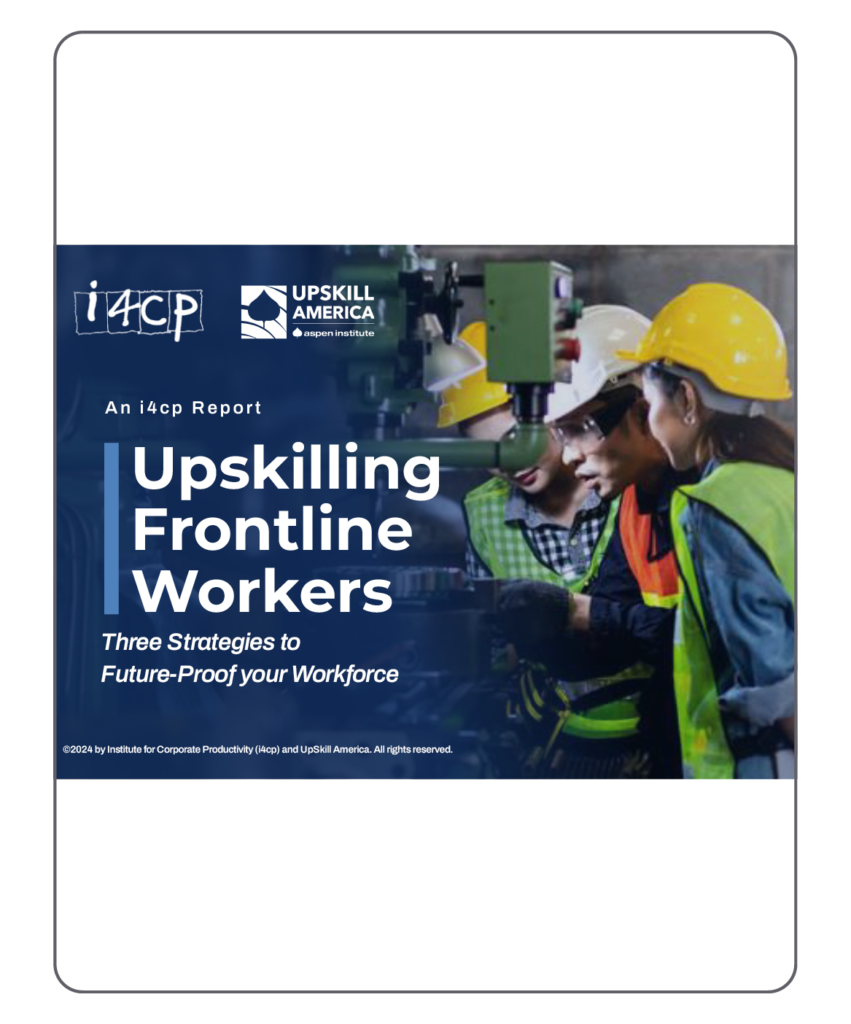
Upskilling Frontline Workers: Three Strategies to Future-Proof your Workforce
UpSkill America & Institute for Corporate Productivity (i4cp)
TOPICS: Apprenticeship , Career Pathways , Trainer and Mentor Development , Training
The rapid advancement and proliferation of technology increases the need for accelerated and continuous workforce development. Prioritizing the upskilling of frontline workers requires a variety of educational programs, and there is no single answer to the upskilling challenge. Still, UpSkill America and the Institute for Corporate Productivity (i4cp) created this report of best practices that can help any organization become more productive and resilient via a skilled workforce.
Read the brief to learn more about next practices in upskilling, including internal training, apprenticeship, and tuition assistance that will help any organization to be more productive and resilient for the future.
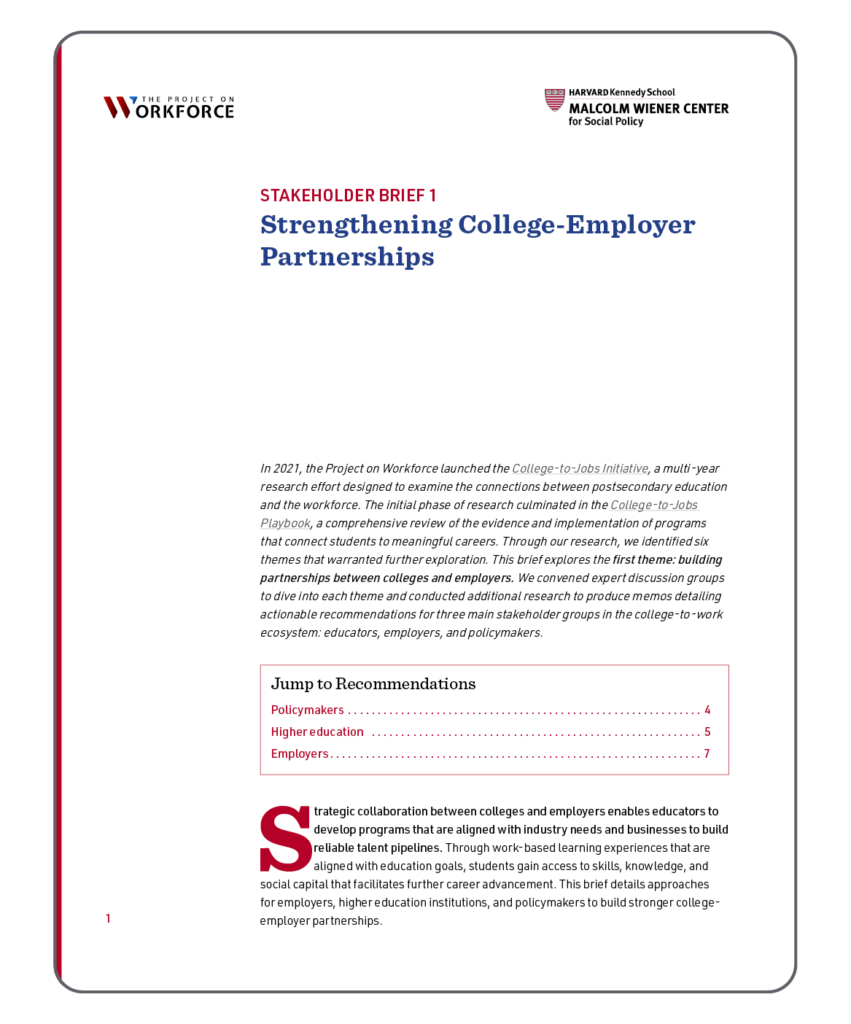
College-to-Jobs Initiative: Policy and Practice Series
The Project on Workforce
The Project on Workforce released new recommendations for educators, employers, and policymakers on how to improve college-to-jobs connections. With these webinars and stakeholder briefs, they aim to increase attention and investment in college-to-career transitions and show how colleges can better deliver on economic prosperity.
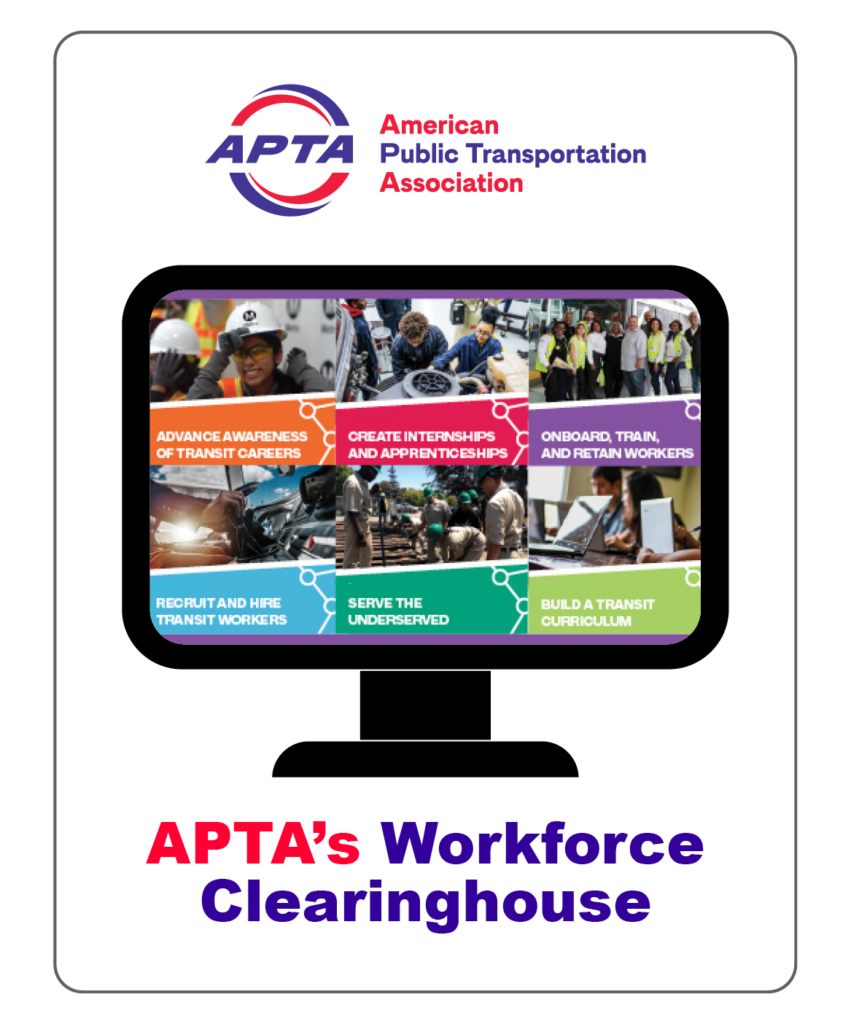
APTA’s Workforce Clearinghouse
APTA’s Workforce Clearinghouse connects users with convenient access to industry materials, stories, and recommended practices. Use the search bar or choose a categorical grouping to find resources from APTA’s six ‘Workforce Mini Guides’ as well as selected examples from the initial workforce volume – APTA’s Transit Workforce Readiness Guide.
American Public Transportation Association (APTA)
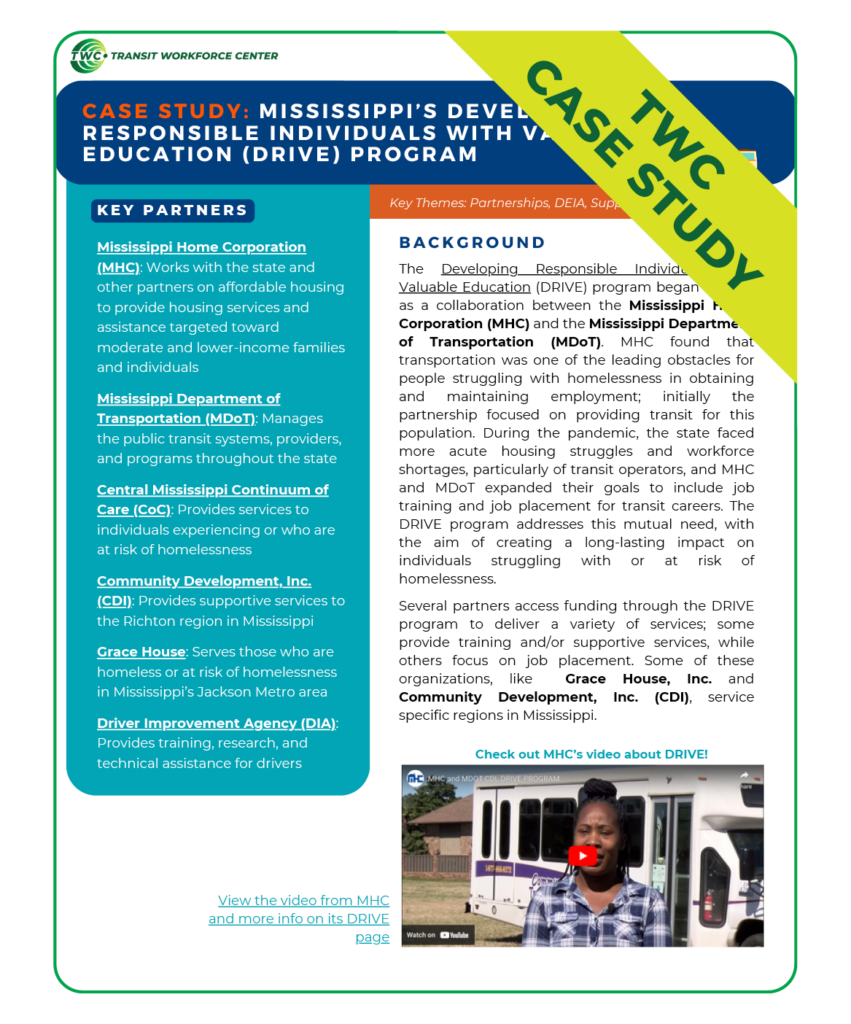
Mississippi’s Developing Responsible Individuals with Valuable Education (DRIVE) Program
This TWC case study is about the Mississippi Developing Responsible Individuals with Valuable Education (DRIVE) Program, which uses Emergency Solutions Grants (ESG) from the U.S. Department of Housing and Urban Development, distributed by the Mississippi Home Corporation (MHC), to partners such as Grace House, Inc. and Community Development, Inc. (CDI). These partners use the funding in a variety of creative ways to provide housing and other supportive services to DRIVE participants while they complete training and certification for a commercial driver’s license (CDL). Partners also provide job assistance to participants, placing them and helping them succeed in local transit jobs. Learn more about the program, services offered, and how stakeholders leverage funding in the full case study.
Transit Workforce Center
May 2024
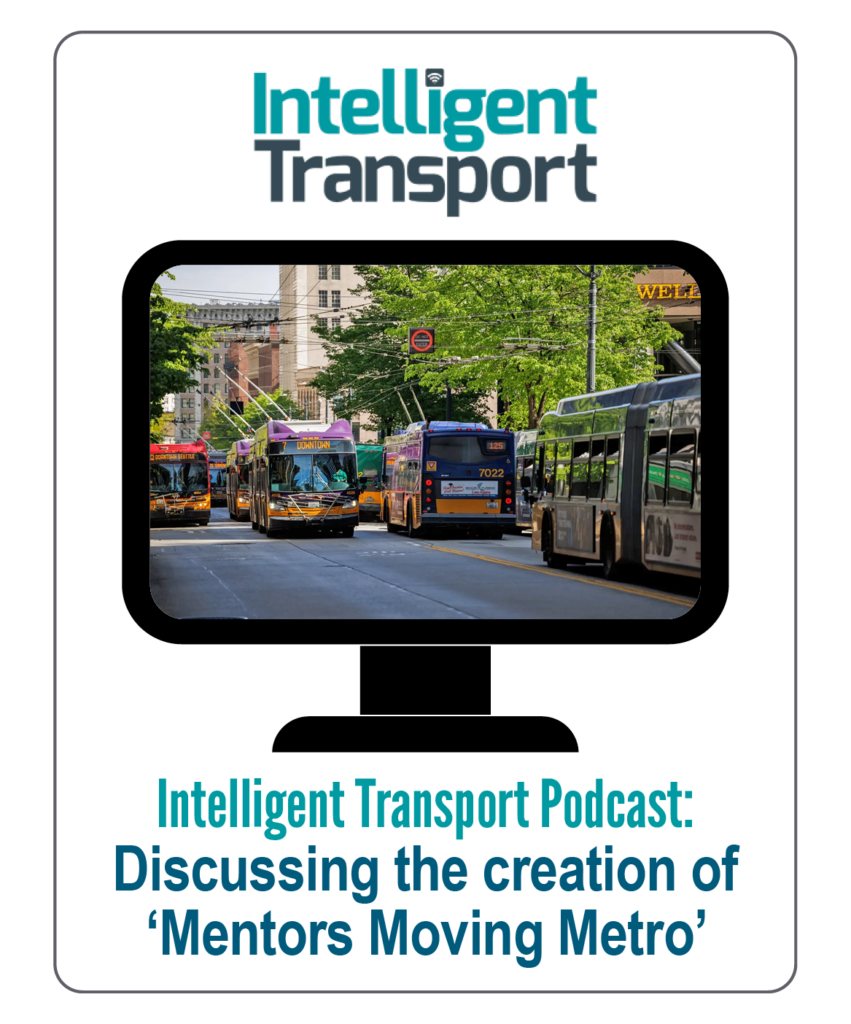
Intelligent Transport Podcast: Discussing the creation of ‘Mentors Moving Metro’
“Mentors Moving Metro” is a partnership between Metro and the Amalgamated Transit Union (ATU) Local 587 that will match experienced operators with new, part-time operators for six to 12 months. In this podcast discussion, Metro’s Director of Bus Operations, Phil DeVault, and transit operator and ATU member, Patrick Brady, talk about how “Mentors Moving Metro” is helping foster relationships and provide knowledge that can only come those who have been “in the seat.” They discussed the origins of the program, how mentors can be a morale boost for operators, and how it can foster greater interaction between operators and management. They finished the podcast by discussing their vision on developing it from a mentorship program to an apprenticeship program for drivers joining Metro in the future.
Intelligent Transport
March 2024
TOPICS: Apprenticeship , Career Pathways , Labor-Management Partnerships , Mentorship , Training
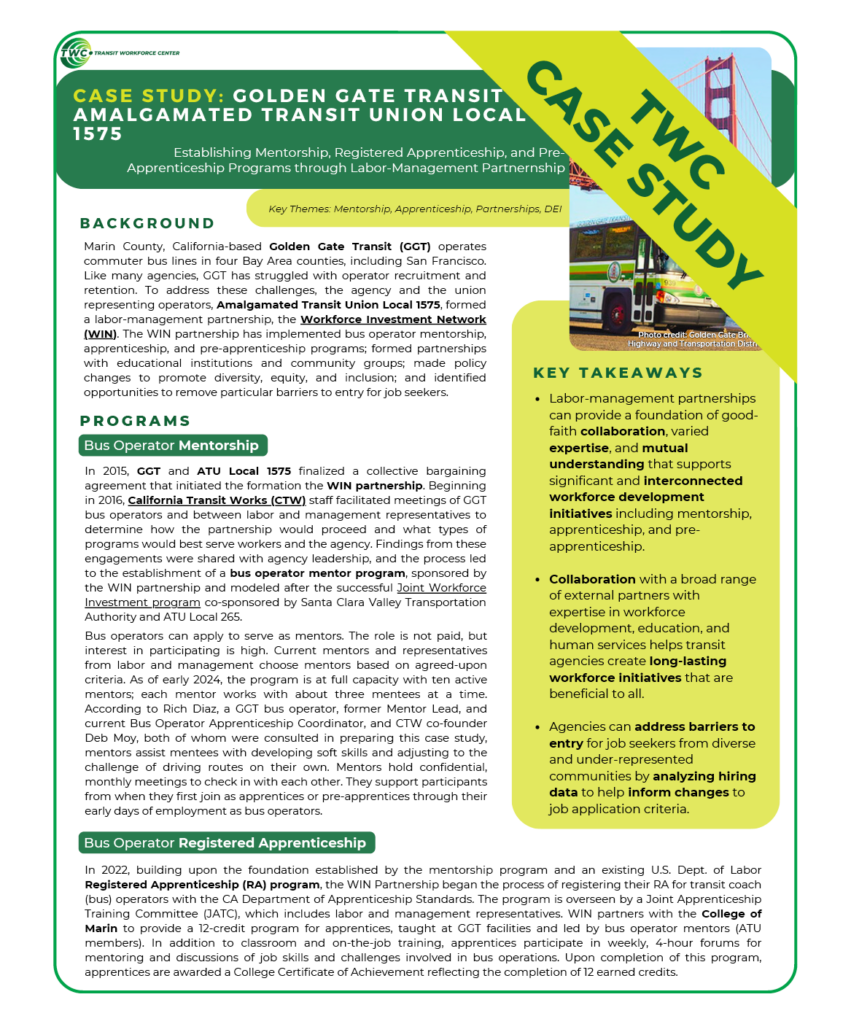
Case Study: Golden Gate Transit & Amalgamated Transit Union Local 1575
Marin County, California-based Golden Gate Transit (GGT) operates commuter bus lines in four Bay Area counties, including San Francisco. Like many agencies, GGT has struggled with operator recruitment and retention. To address these challenges, the agency and the union representing operators, Amalgamated Transit Union Local 1575, formed a labor-management partnership, the Workforce Investment Network (WIN). The WIN partnership has implemented bus operator mentorship, apprenticeship, and pre-apprenticeship programs; formed partnerships with educational institutions and community groups; and identified opportunities to remove particular barriers to entry for job seekers.
Transit Workforce Center
February 2024
Read Rich Diaz’s Transit Career Story on the TWC Blog to learn more.
View the full case study below:
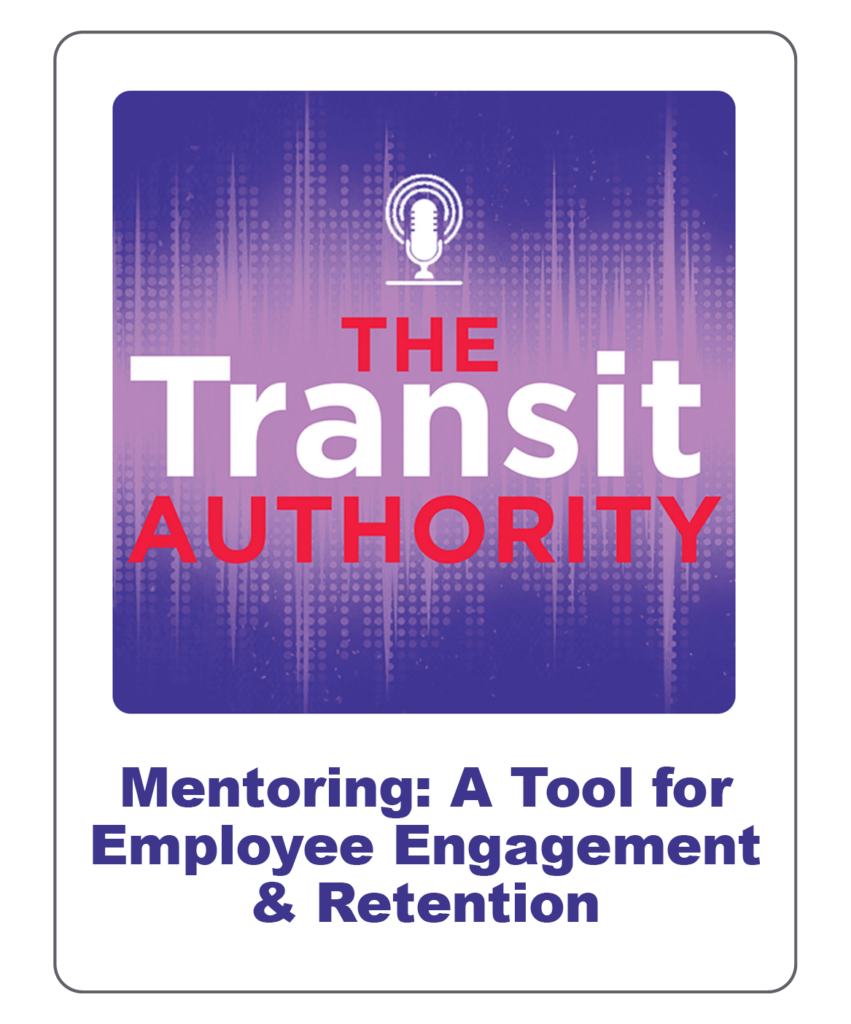
Mentoring: A Tool for Employee Engagement & Retention
APTA’s podcast, The Transit Authority, presents a two-part series on mentoring. The Santa Clara Valley Transportation Authority (VTA) and Greater Cleveland Regional Transit Authority (GCRTA) will discuss their partnerships with ATU to build and manage successful mentoring programs and how mentoring is a critical tool for knowledge transfer and positive work culture.
American Public Transportation Association
January 2024
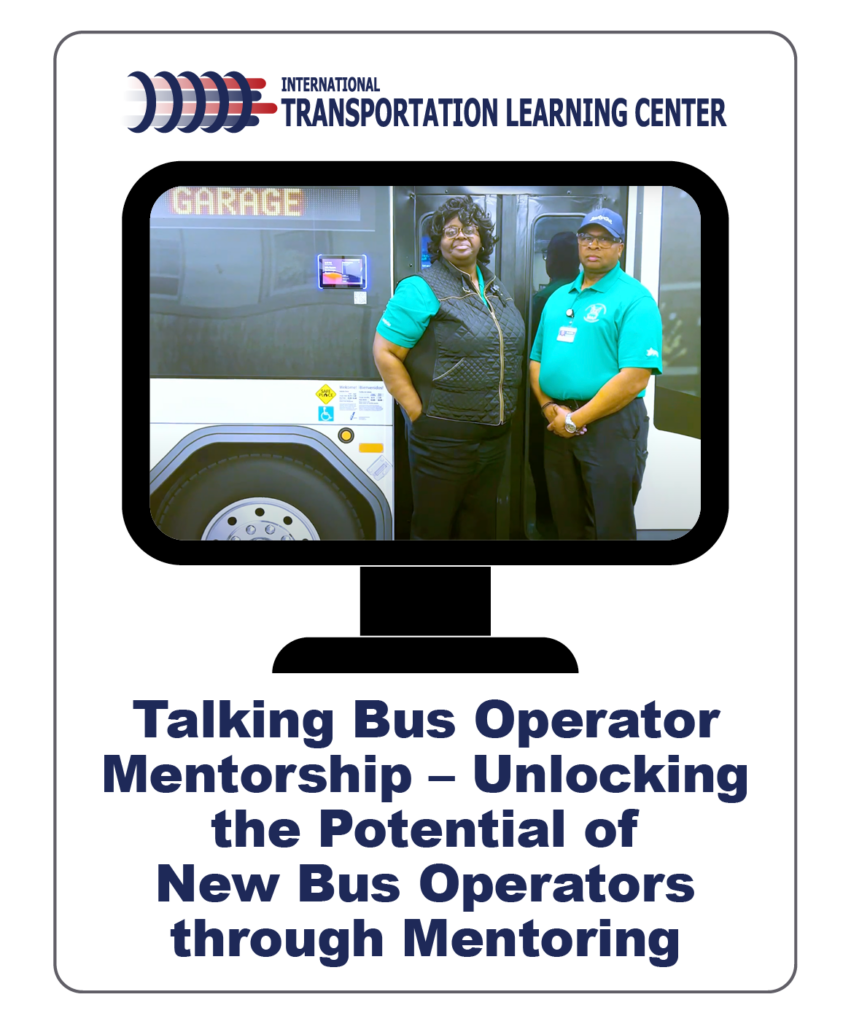
Talking Bus Operator Mentorship – Unlocking the Potential of New Bus Operators through Mentoring
Bus Operator Mentors from WMATA (Washington, D.C./ATU Local 689) and IndyGo (Indianapolis, IN/ATU Local 1070) speak about the benefits of mentorship programs. IndyGo’s President and CEO Inez Evans and ATU’s Director of Apprenticeships and Workforce Development Jamaine Gibson also share their thoughts on the importance of establishing these programs.
International Transportation Learning Center
November 2023
TOPICS: Apprenticeship , Career Pathways , Labor-Management Partnerships , Mentorship
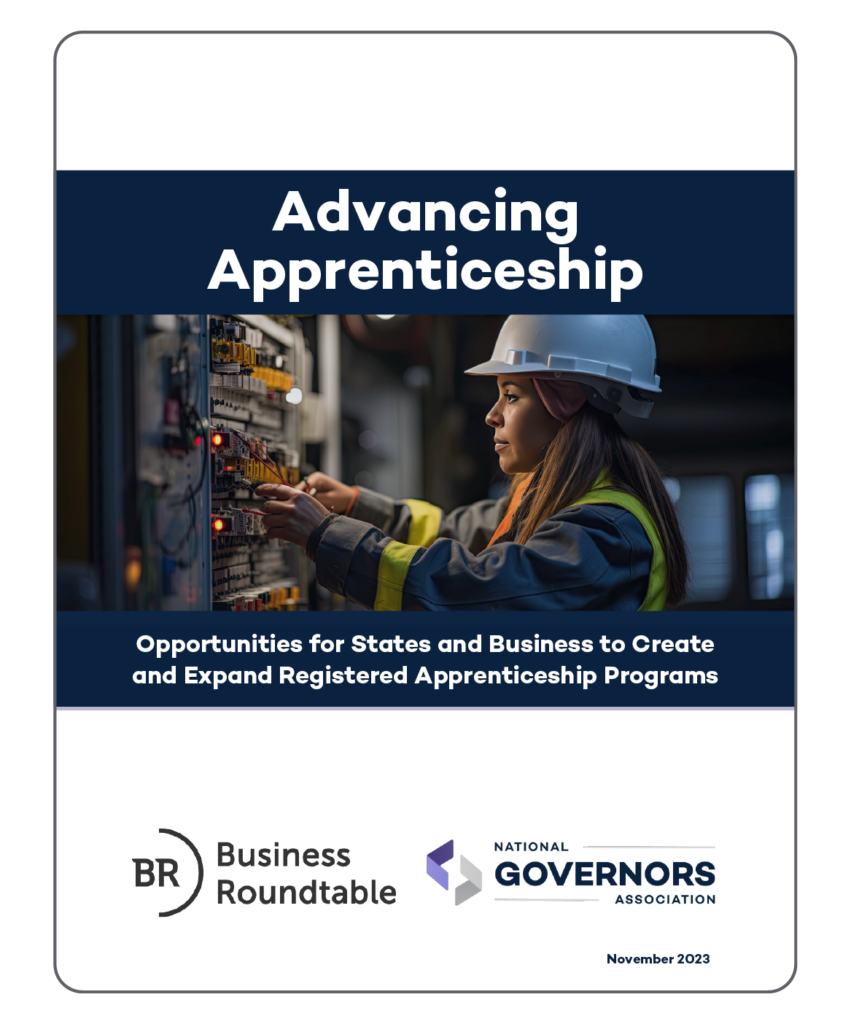
Advancing Apprenticeship: Opportunities For States And Business To Create And Expand Registered Apprenticeship Programs
This publication highlights the significance of Registered Apprenticeship Programs (RAPs) as one of several strategies and opportunities that employers and states can implement and offer to individuals as a viable path toward securing and prospering in a career. Registered Apprenticeship plays an important role in the U.S. economy and workforce ecosystem by satisfying employer talent needs while providing training and employment pathways for individuals in family-sustaining, in-demand careers. A registered apprenticeship is an intensive program that offers an individual paid on-the-job experience, coupled with classroom learning that together provides a jobseeker with the necessary skills to secure gainful employment.
National Governors Association
November 2023
TOPICS: Apprenticeship , Career Pathways , Policy and Planning
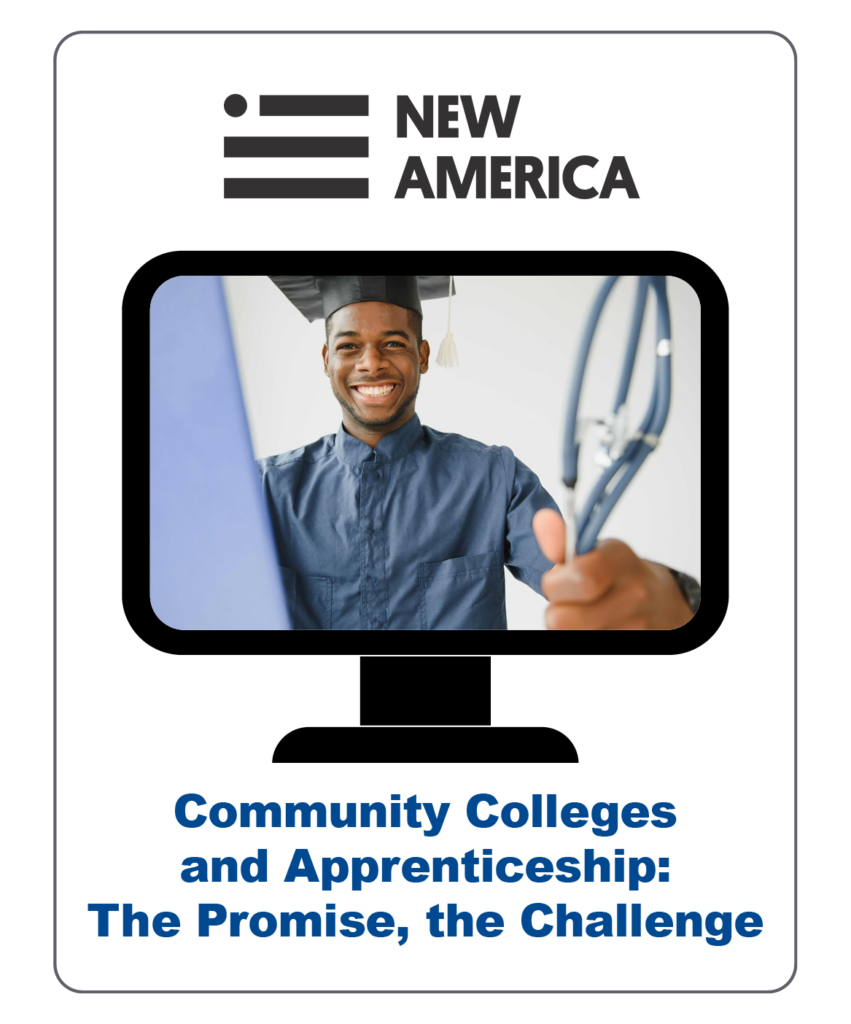
Community Colleges and Apprenticeship: The Promise, the Challenge
To better understand the challenges and opportunities facing community colleges that want to expand apprenticeship opportunities to their students, New America conducted a year-long study. They spoke to apprenticeship, workforce development, and community college leaders about the community colleges role in expanding apprenticeship.
New America Center on Education and Education Policy
November 2023
TOPICS: Apprenticeship , Career Pathways , Policy and Planning
Based on these conversations, we chose case studies and conducted in-depth interviews with leaders from the Community College System of New Hampshire’s ApprenticeshipNH, Arapahoe in Colorado, San Jacinto in Texas, and Howard Community College in Maryland’s programs in IT and cybersecurity, and Coastal Alabama Community College’s nursing apprenticeship.
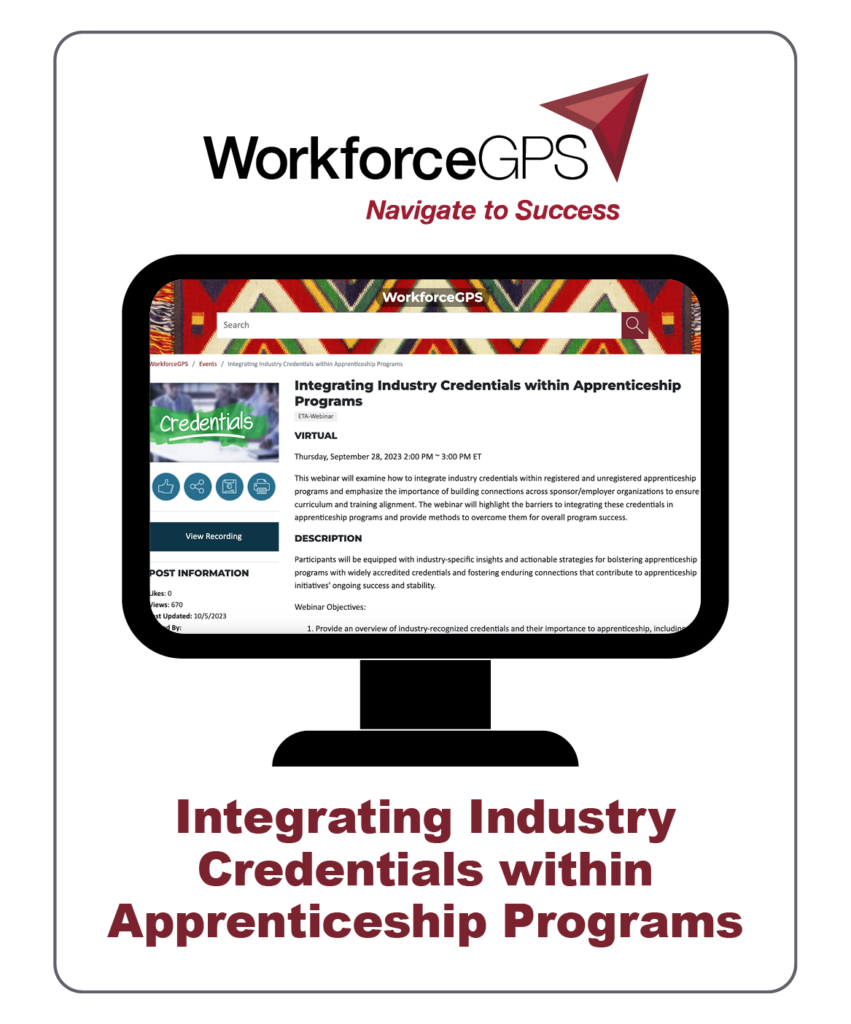
Integrating Industry Credentials within Apprenticeship Programs
This webinar examines how to integrate industry credentials within registered and unregistered apprenticeship programs and emphasizes the importance of building connections across sponsor/employer organizations to ensure curriculum and training alignment.
WorkforceGPS
September 2023
TOPICS: Apprenticeship , Career Pathways
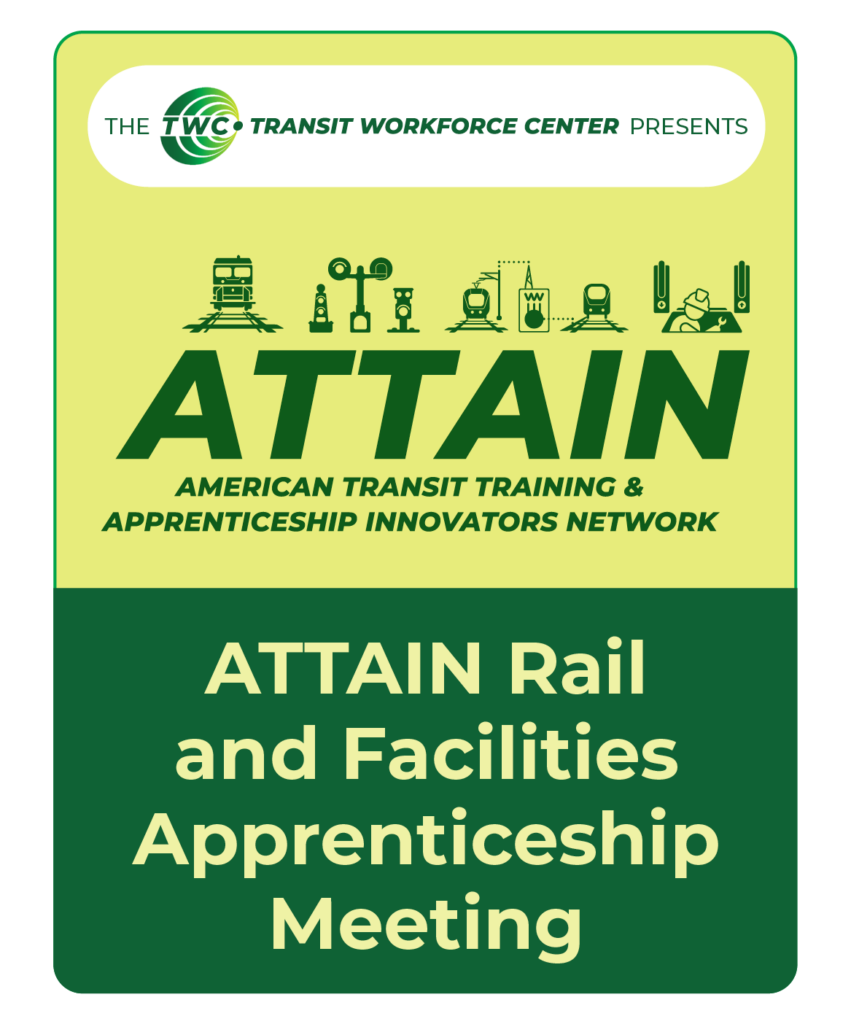
ATTAIN Rail and Facilities Apprenticeship Meeting
This recorded meeting of the ATTAIN Rail and Facilities Committee serves as a resource for transit industry stakeholders and includes presentations on apprenticeship and case studies of successful programs across the country.
Transit Workforce Center
September 2023
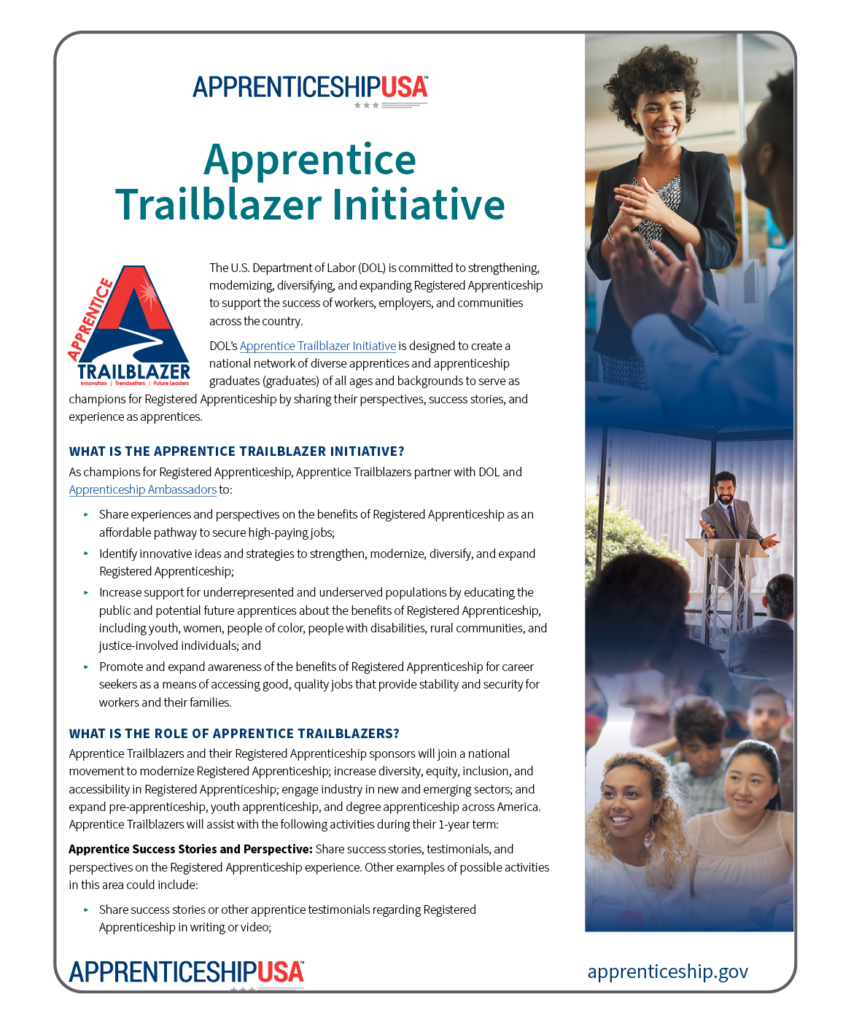
Apprentice Trailblazer Initiative
The Apprentice Trailblazer Initiative is designed to create a national network of apprentices and apprenticeship graduates to feature their stories and hear their perspectives, show how Registered Apprenticeships increase opportunities, and bring awareness to other career seekers who may be interested in becoming apprentices.
Department of Labor; ApprenticeshipUSA
TOPICS: Apprenticeship , Career Pathways , Community Engagement , Mentorship
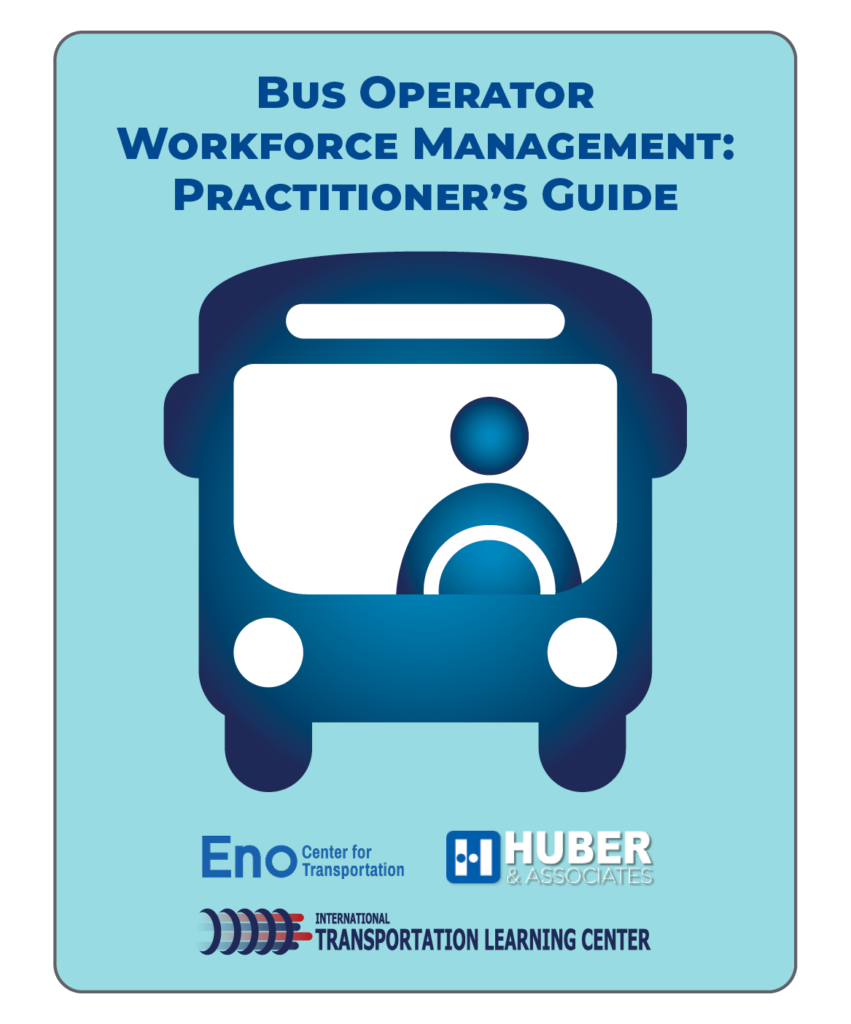
Bus Operator Workforce Management: Practitioner’s Guide
This report, produced by the Eno Center for Transportation, International Transportation Learning Center (ITLC), and Huber & Associates, is a practitioner’s guide that provides recommendations and resources enabling transit agencies to better assess, plan, and implement their operator workforce management programs. A link to a related TRB webinar is also included.
Transit Cooperative Research Program
August 2023
Contributor(s): National Academies of Sciences, Engineering, and Medicine; Transportation Research Board; Transit Cooperative Research Program; Robert Puentes; Philip Plotch; Brianne Eby; Paul Lewis; Karitsa Holdzkom; Xinge Wang; Douglas Nevins; Kenyon Corbett; Melissa Huber
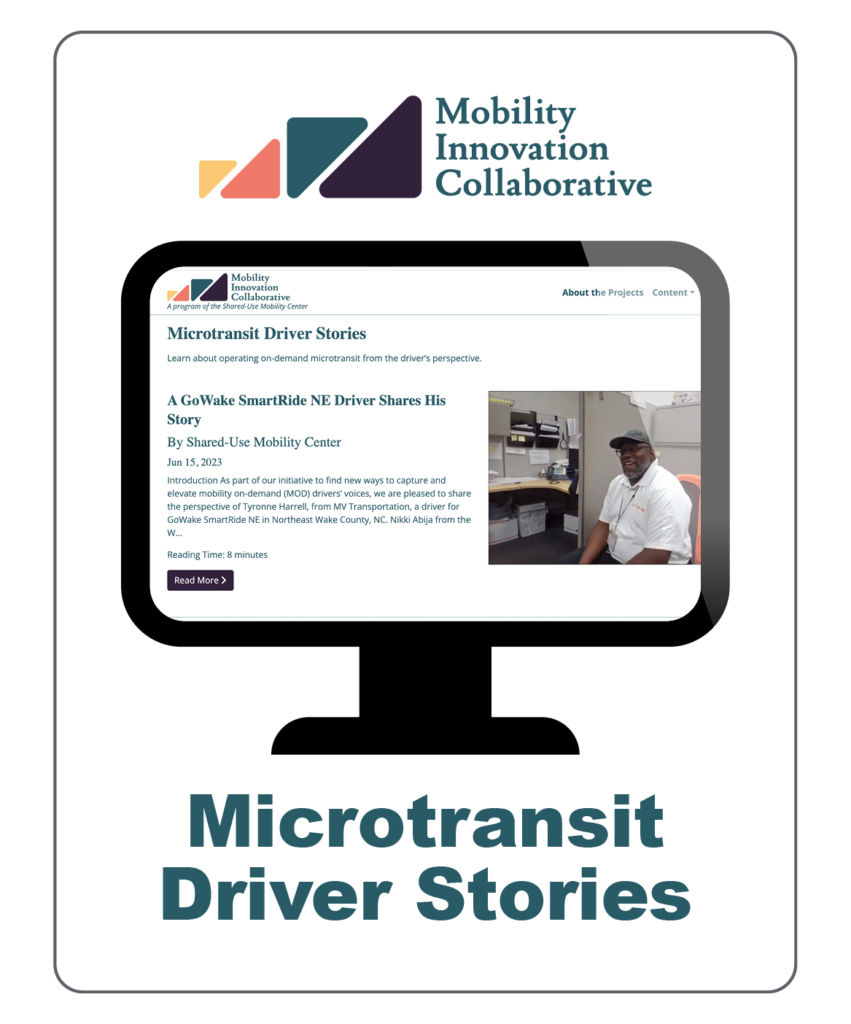
Microtransit Driver Stories
As part of the Mobility Innovation Collaborative, SUMC is sharing stories from mobility-on-demand drivers. These stories aim to capture and elevate perspectives from drivers across different transit agencies.
Shared-Use Mobility Center
TOPICS: Career Pathways
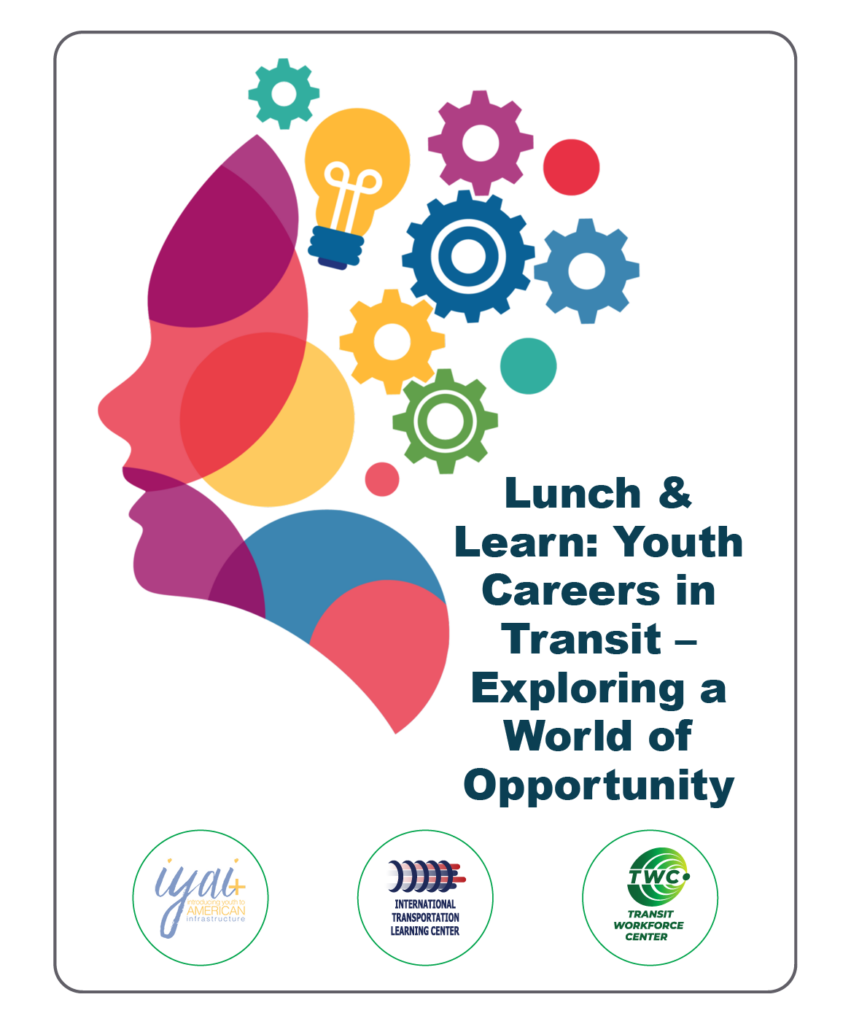
Lunch & Learn: Youth Careers in Transit – Exploring a World of Opportunity
This is Part 4 of Iyai’s 6-part 2023 Transportation/Mobility Career Awareness Lunch and Learn series. This webinar is co-sponsored with the International Transportation Learning Center / Transit Workforce Center. This webinar features presenters at various stages of their transit careers discussing their work and their own career pathways, engaging in an interactive discussion with the audience.
introducing youth to American infrastructure; International Transportation Learning Center/Transit Workforce Center
May 2023
TOPICS: Apprenticeship , Career Pathways , Community Engagement , Mentorship
Program: Iyai’s Dr. Beverly Scott and TWC’s Shayna Gleason present an overview of the program series and career landscape, followed by participants talking about their work and careers. Speakers include:
- Marvin Alfred, President, Amalgamated Transit Union (ATU) Local 113 (Toronto);
- Kyisha Bond, mechanic apprentice, IndyGo (Indianapolis),
- Inez Evans, President and CEO, IndyGo (Indianapolis);
- Andrew Falotico, Health and Safety Representative, ATU Local 113 (Toronto);
- Desiree Patrice, Deputy Chief of Capital Transformation, MBTA (Boston).
After the presentations, Karen Philbrick from the Mineta Transportation Institute facilitates a conversation between the audience and presenters.
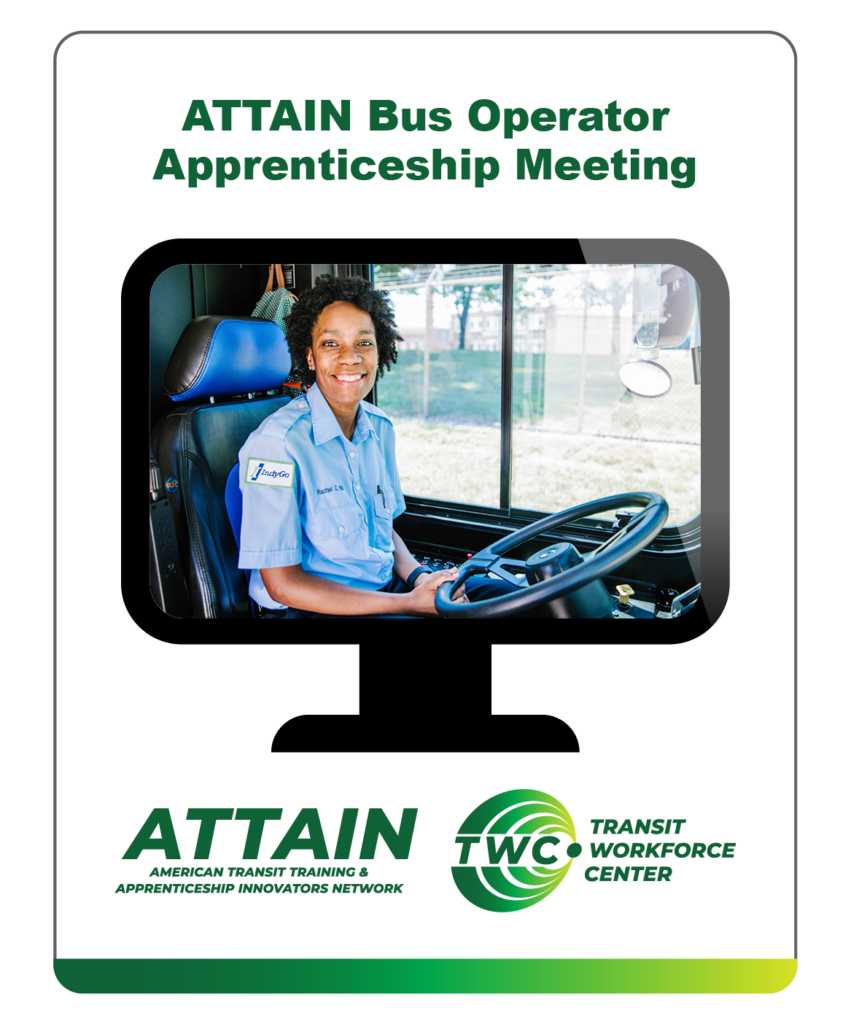
ATTAIN Bus Operator Apprenticeship Meeting
This recorded meeting of the ATTAIN Bus Operator Committee serves as a resource for transit industry stakeholders and includes presentations on apprenticeship and case studies of successful programs across the country.
Transit Workforce Center
May 2023
TOPICS: Apprenticeship , Career Pathways , Mentorship , Trainer and Mentor Development , Training
The American Transit Training and Apprenticeship Innovators Network (ATTAIN), run by the Transit Workforce Center (TWC), is a peer network created for transit agencies and labor unions to explore new apprenticeship programs or enhance existing programs for their frontline workforce.
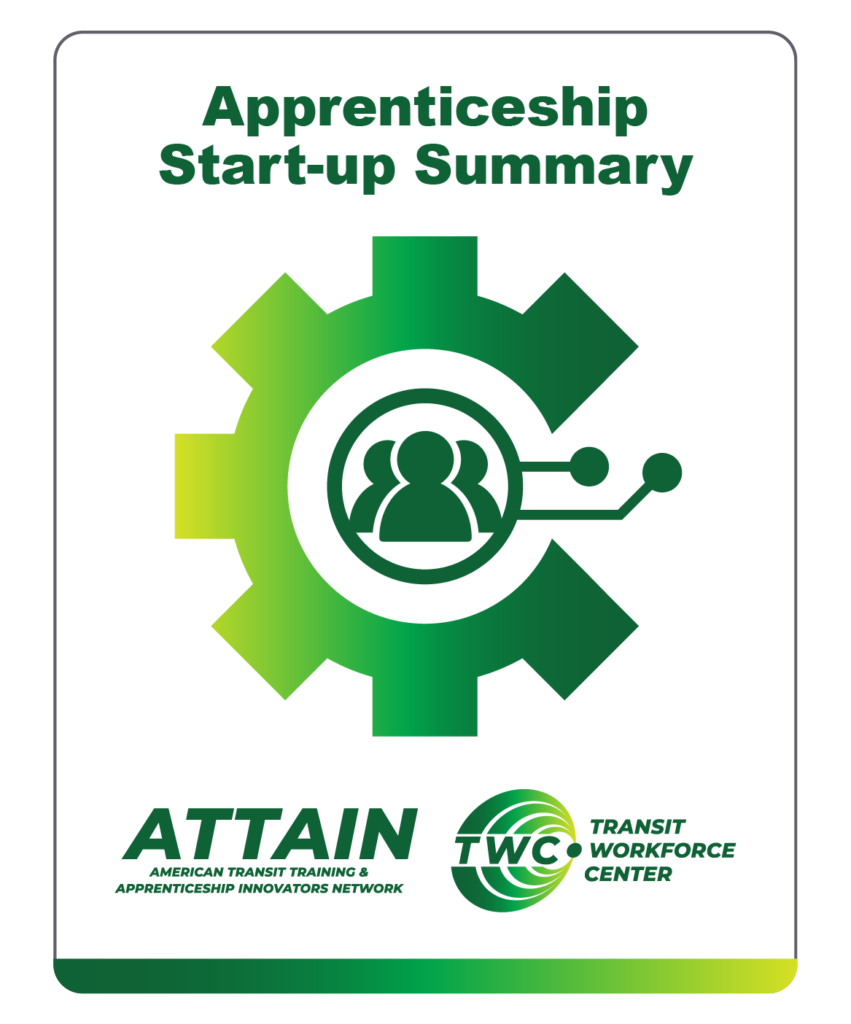
Apprenticeship Start-up Summary
These summaries outline the steps to tailor an effective Registered Apprenticeship (RA) program. These steps can be completed in order or, in some cases, concurrently. Apprenticeship programs are customizable to meet the employers’ skill requirements.
ProgressWorx
April 2023
TOPICS: Apprenticeship , Career Pathways , Labor-Management Partnerships , Mentorship , Training
If the workforce for the occupation to be registered as an apprenticeship is represented by a labor union, the employer and union would register the program as an Individual Joint program. If the workforce is not represented, the program would be registered as an Individual Non-Joint program by the employer.
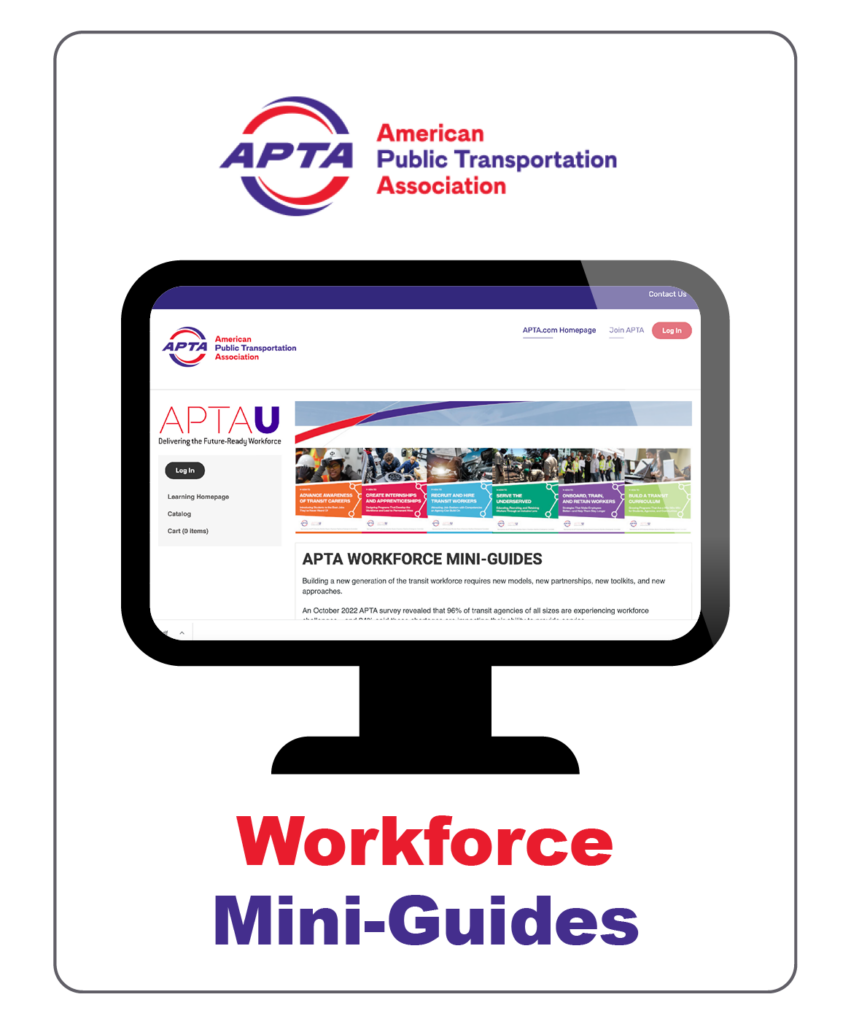
Workforce Mini-Guides
These six workforce development mini-guides are designed to help develop and implement successful strategies to address the critical workforce shortages seen across the public transportation industry. They cover these topics: advancing awareness of transit careers; creating internships and apprenticeships; recruiting and hiring transit workers; serving the underserved in the workforce; onboarding, training, and retaining workers; and building a transit curriculum.
American Public Transportation Association
April 2023
An October 2022 survey conducted by APTA revealed that 96 percent of transit agencies of all sizes are experiencing workforce challenges, and 84 percent said these shortages are impacting their ability to provide service. APTA developed these mini-guides building on their 2021 Transit Workforce Readiness Guide and combining industry insights and stories, case studies, lessons learned, and best practices.
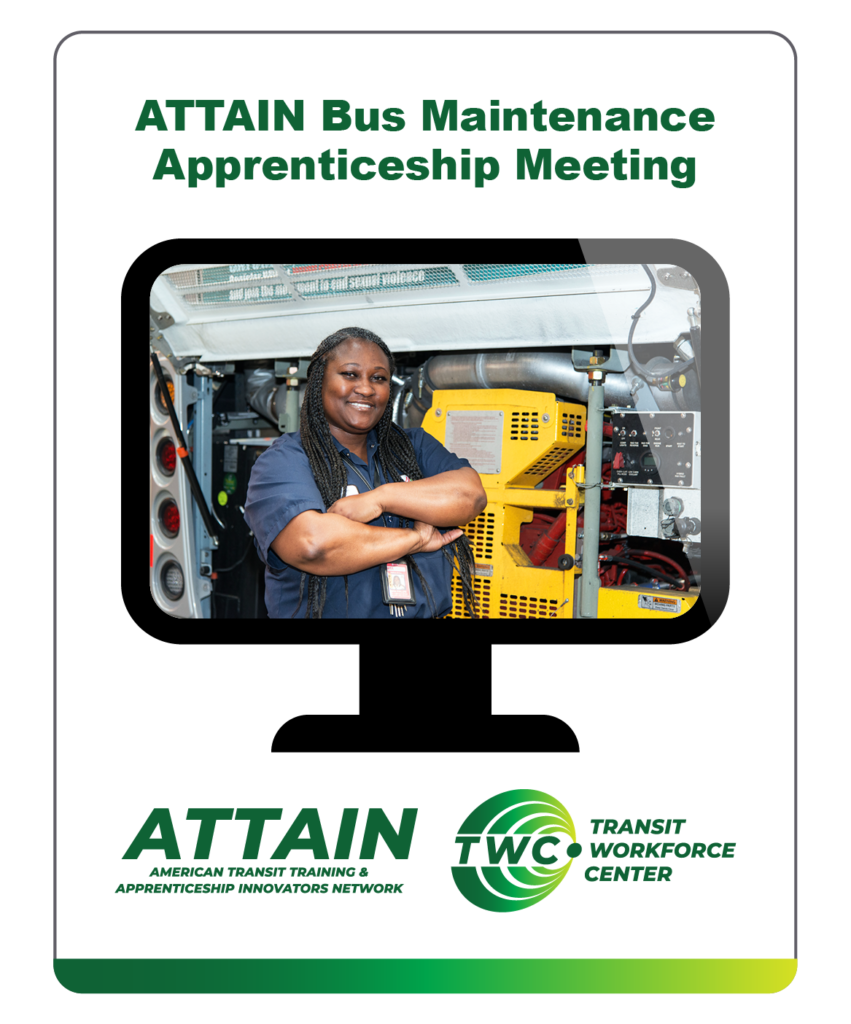
ATTAIN Bus Maintenance Apprenticeship Meeting
The American Transit Training and Apprenticeship Innovators Network (ATTAIN), run by the Transit Workforce Center (TWC), is a peer network created for transit agencies and labor unions to explore new apprenticeship programs or enhance existing programs for their frontline workforce. This recorded meeting of the ATTAIN Bus Maintenance Committee serves as a resource for transit industry stakeholders and includes presentations on apprenticeship and case studies of successful programs across the country.
Transit Workforce Center
March 2023
TOPICS: Apprenticeship , Career Pathways , Trainer and Mentor Development , Training
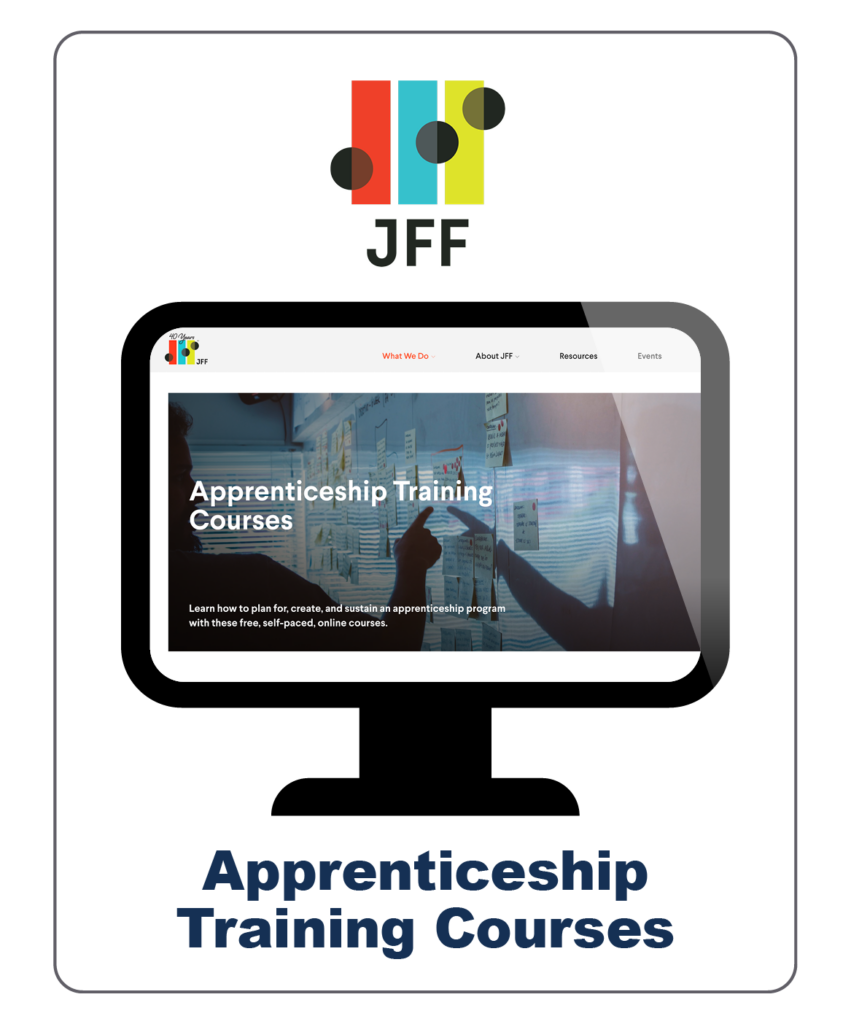
Apprenticeship Training Courses
This series of free online training courses will help transit providers and others plan for, create, and sustain registered apprenticeship programs. Several courses have already been released and others are forthcoming.
Jobs for the Future
March 2023
TOPICS: Apprenticeship , Career Pathways , Mentorship , Trainer and Mentor Development , Training
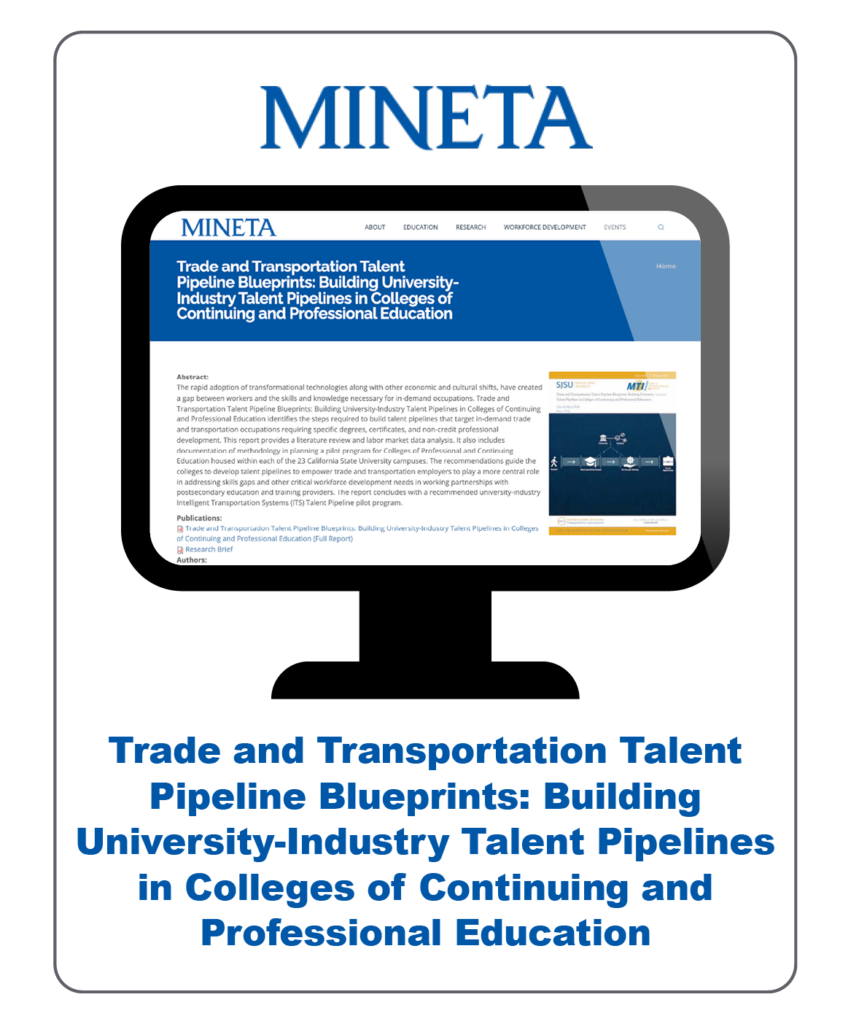
Trade and Transportation Talent Pipeline Blueprints: Building University-Industry Talent Pipelines in Colleges of Continuing and Professional Education
This report identifies the steps required to build talent pipelines that target in-demand trade and transportation occupations requiring specific degrees, certificates, and non-credit professional development and provides a literature review and labor market data analysis. It also includes documentation of methodology in planning a pilot program for Colleges of Professional and Continuing Education housed within each of the 23 California State University campuses.
Mineta Transportation Institute
February 2023
TOPICS: Career Pathways , Hiring and Recruitment , Policy and Planning , Training
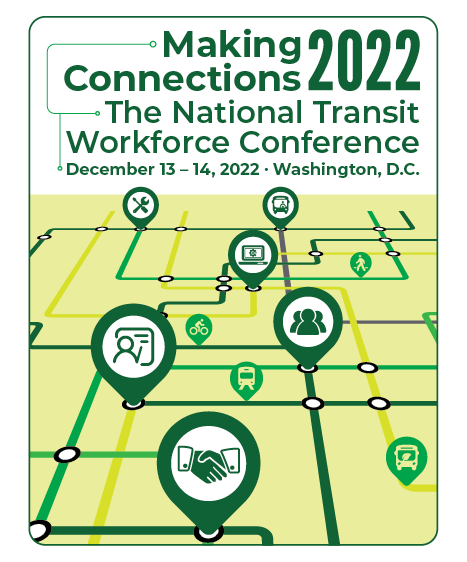
Making Connections 2022 – Conference Overview and Videos
The Transit Workforce Center hosted Making Connections 2022: The National Transit Workforce Conference in Washington, D.C. on December 13-14, 2022. This conference brought together participants from urban, suburban, rural, and tribal public transportation and industry stakeholders in plenaries, workshops, networking, and ongoing dialogue. Discussions and sessions featured topics including recruitment and retention, training, mentoring and apprenticeships, new technologies, and preparing today’s and tomorrow’s workforce.
Transit Workforce Center
December 2022
Session materials from Making Connections 2022 are hosted on the TWC Resource Center. Please click here to view all related materials. A PDF copy of the conference schedule is linked below.
Opening Video:
Recap Video:
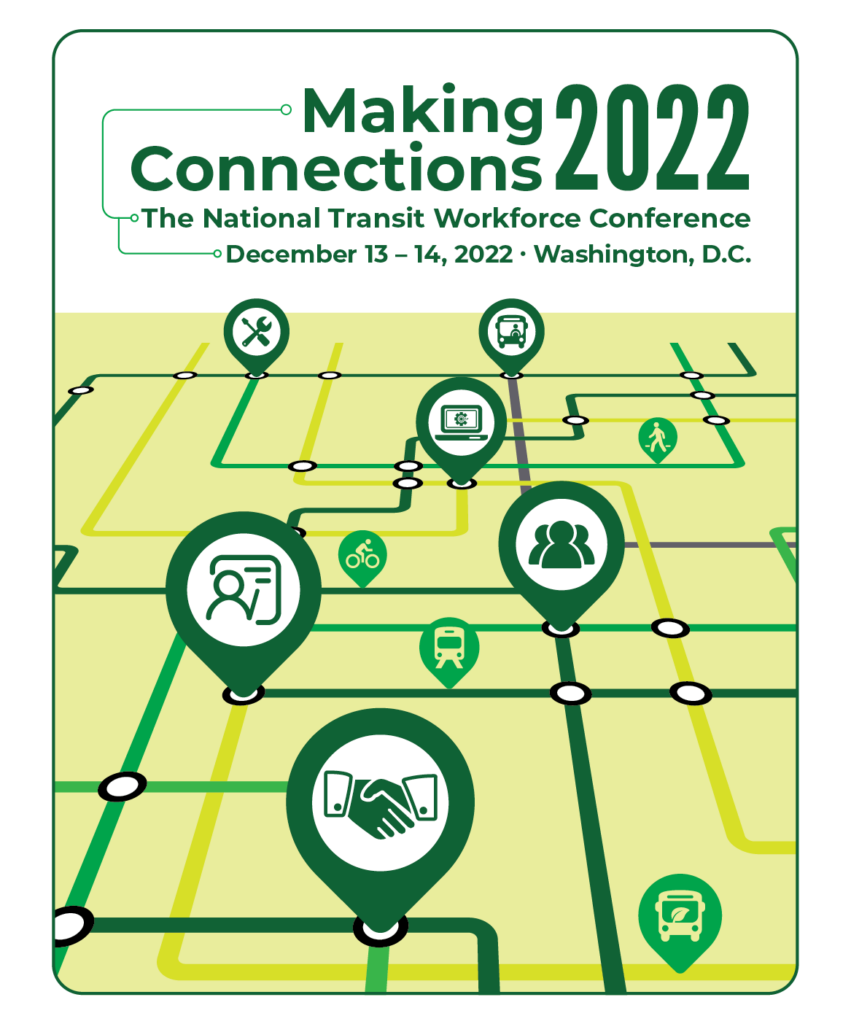
Making Connections 2022 – Driving Bus Operator Recruitment and Retention: Challenges, Opportunities and Innovation
This session about bus operator recruitment and retention was presented as part of TWC’s Making Connections 2022 transit workforce conference in December, 2022.
Transit Workforce Center
December 2022
Session Summary: A headline issue confronting all transit systems today – how to attract and retain bus operators in a tight labor market. This lively session began with presentations from the TCRP F-28 research team and TransitCenter on their recently published national research findings on recruiting, developing and retaining transit bus operators. Labor and management industry practitioners from multiple locations then shared their recruitment approaches and strategies that have been most effective on the ground, and TWC staff summarized the National Transit Frontline Worker Recruitment Campaign.
Moderator
- Rob Puentes: President and CEO – The Eno Center for Transportation
Speakers
- Julia Castillo: Executive Director – Heart of Iowa Regional Transit Agency
- James Duff: Assistant Vice President, Human Resources – Dallas Area Rapid Transit
- Jeff Hazen: Executive Director – Sunset Empire Transportation District
- Steve Jovel: Transportation Superintendent – Santa Clara Valley Transportation Authority
- Robin Phillips: Executive Director – National Rural Transit Assistance Program
- Harpreet Singh: JWI Director – Amalgamated Transit Union Local 265
- David Stephen: Senior Communications Specialist – International Transportation Learning Center/Transit Workforce Center
- Chris Van Eyken: Program Manager – TransitCenter
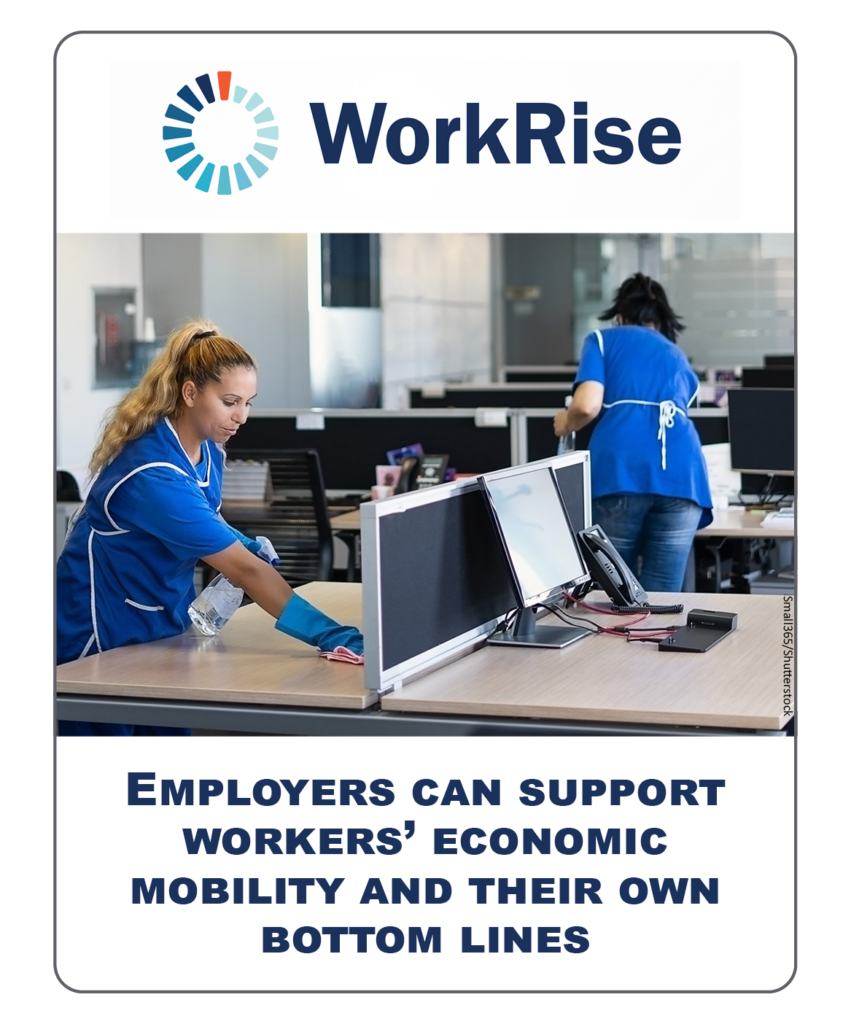
Employers can support workers’ economic mobility and their own bottom lines
This article provides a concise description of several strategies employers can use to create clear advancement pathways in their workplaces, which will help attract and retain quality candidates. It discusses research around what modern-day employees are looking for in a workplace and a position. It also links to a related article, which provides an overview of the framework created by Jobs for the Future (JFF) to describe the components of a good job.
WorkRise
November 2022
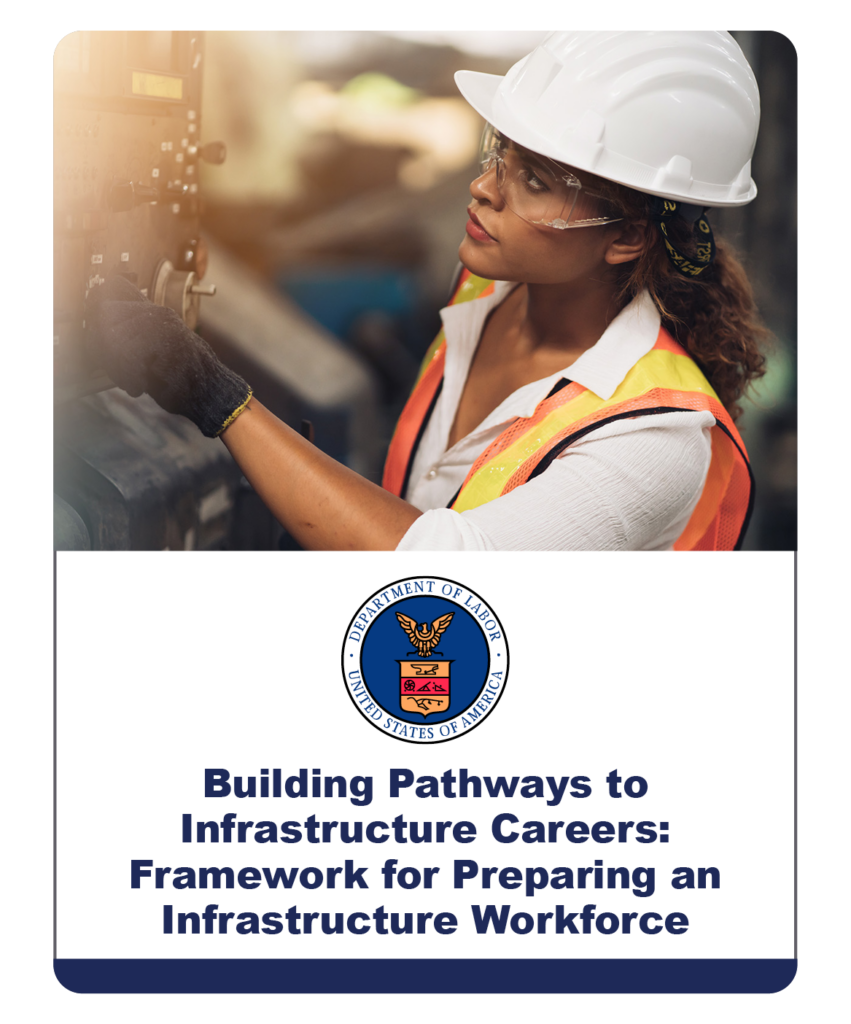
Building Pathways to Infrastructure Careers: Framework for Preparing an Infrastructure Workforce
This resource provides a framework for all workforce stakeholders, including infrastructure project leads, to engage the public workforce system in implementing the Bipartisan Infrastructure Law with strong workforce commitments and proven strategies that produce high-quality education, training, and employment opportunities for all workers.
U.S. Department of Labor, Employment and Training Administration
October 2022
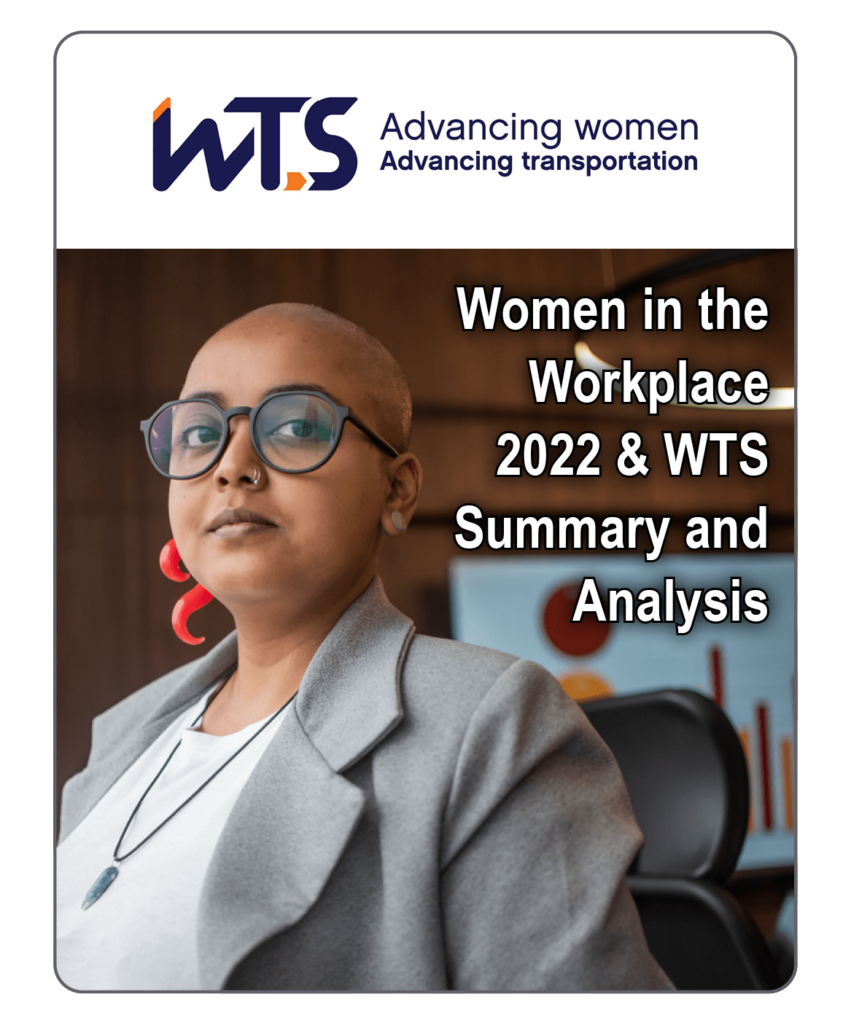
Women in the Workplace 2022
Launched in 2015 by LeanIn.Org and McKinsey & Company, Women in the Workplace is the largest study on the state of women in corporate America. The summary from WTS International outlines the report’s implications for the transportation workforce.
LeanIn.Org; McKinsey & Company; WTS International
October 2022
TOPICS: Career Pathways , Community Engagement
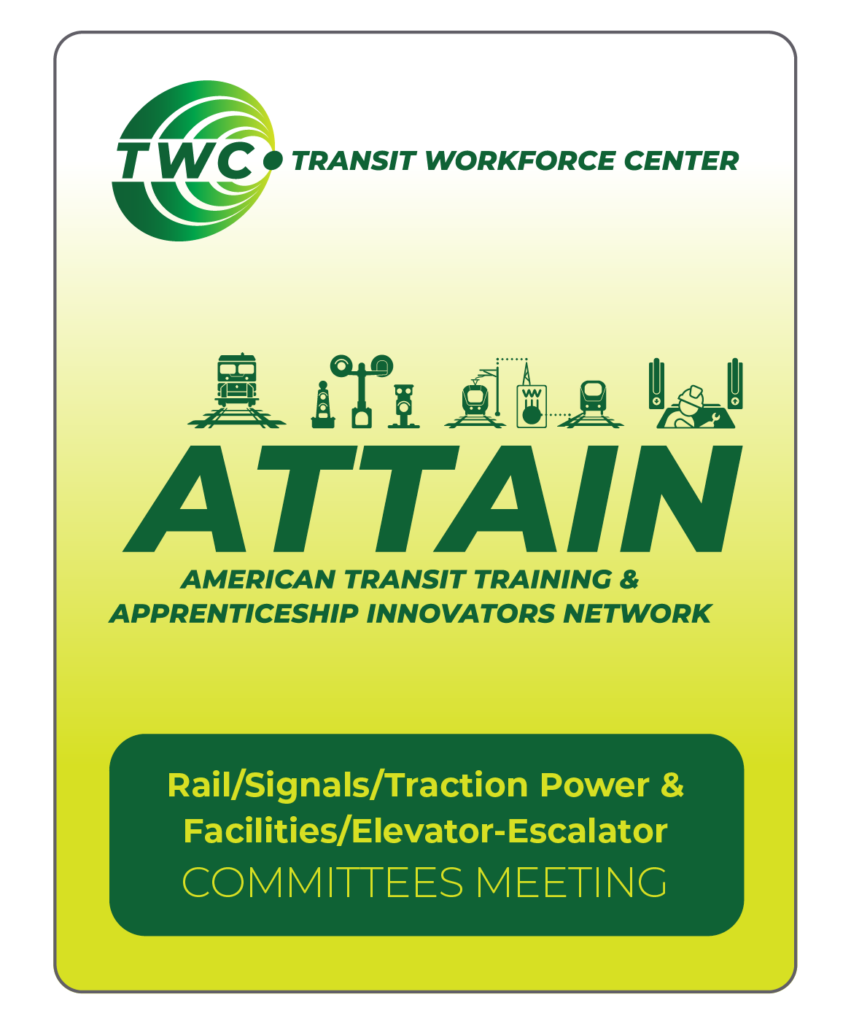
ATTAIN Rail/Signals/Traction Power and Facilities/Elevator-Escalator Committees Meeting
This recorded meeting of the ATTAIN committees for Rail/Signals/Traction Power and Facilities/Elevator-Escalator serves as a resource for transit industry stakeholders and includes presentations on apprenticeship and case studies of successful programs across the country.
Transit Workforce Center
September 2022
TOPICS: Apprenticeship , Career Pathways , Community Engagement , Hiring and Recruitment , Training
The American Transit Training and Apprenticeship Innovators Network (ATTAIN), run by the Transit Workforce Center (TWC), is a peer network created for transit agencies and labor unions to explore new apprenticeship programs or enhance existing programs for their frontline workforce.
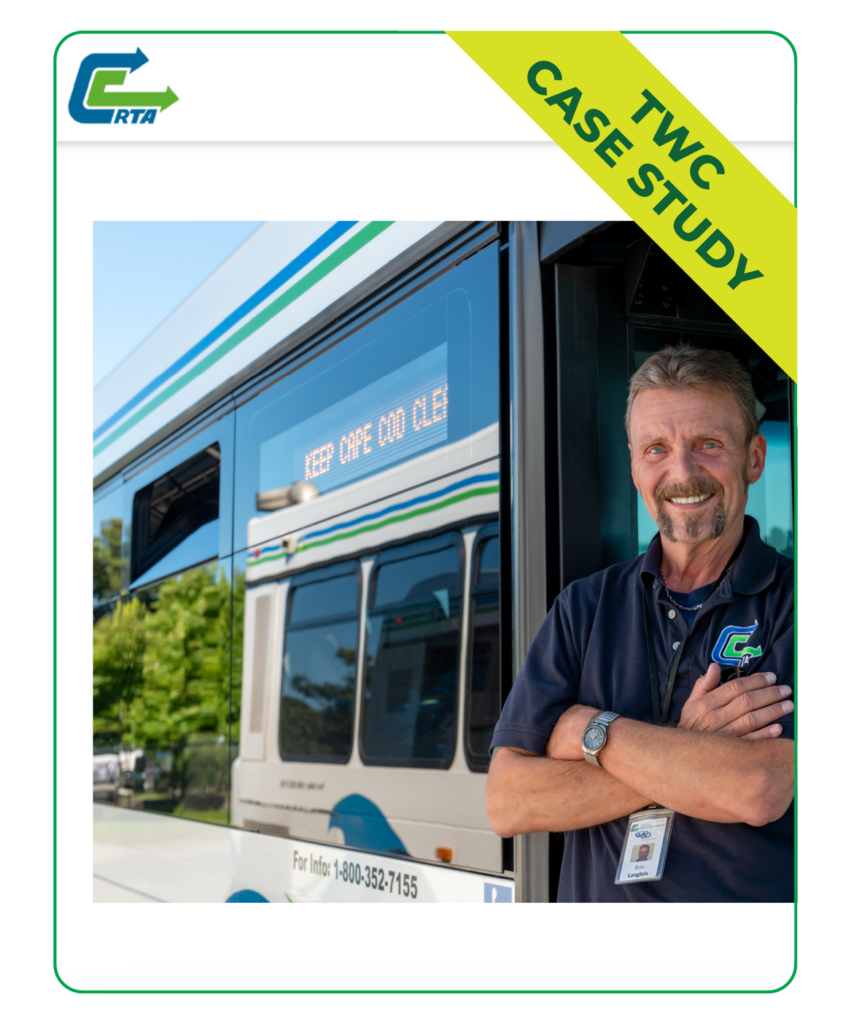
Recruiting Older Workers and Retirees at Cape Cod Regional Transit Authority
Cape Cod Regional Transit Authority; Transit Workforce Center
September 2022
Cape Cod Regional Transit Authority (CCRTA) in Massachusetts serves 15 towns within a 400 square miles area in an area where the population triples in the summer with seasonal residents. CCRTA runs seven year-round fixed route lines, several on-demand and hybrid on-demand services, and three summer shuttle services. In 2021, CCRTA served approximately 2.5 million people with 98 drivers.
Faced with driver shortages, CCRTA and Amalgamated Transit Union Local 1548 worked together and negotiated driver raises and $1,000 bonuses paid after 90-days. In addition, a six-step salary scale to reach the top pay grade was reduced to two steps. Drivers can now reach the top pay level within two years.
Barnstable County’s older adult population is among the largest per capita in the country, and CCRTA has instituted hiring initiatives aimed toward the older worker and retiree population. In connecting with this population, CCRTA has taken a variety of actions, including:
- Reaching out through Cape Cod Elder Services to communicate CCRTA’s interest in hiring older workers. CCRTA’s Human Services Transportation Manager sits on this organization’s board, facilitating ongoing contact.
- Targeting recruitment of retiring teachers, firefighters, police, and school bus drivers. Cape Cod RTA staff visited schools, fire houses, police stations, and municipal offices to share recruitment information.
- Visited each town on Cape Cod, talked with local retirement agency officials, and posted and mailed banners and notices.
- Overall increase in the agency’s traditional and social media presence generally, including advertising explicitly aimed at older adults, including on social media. Developed advertising, messaging, and imagery to make older workers and retirees feel welcome. To see samples of advertising, visit Cape Cod RTA Jobs on Facebook, the ad on their website’s front page, and see the video, featuring older drivers, on the CCRTA career page.
- Emphasizing the short time it takes to reach the highest salary level, a compelling message for older people and retirees, who often value salaries more than benefits, as well as the ability to reach the highest level within their time at the agency.
- Offering various employment options, including full-time and part-time, and seasonal. The agency has found that individual needs lead to varied choices; they estimate their older employees have split 50-50 in what scheduling option they choose.
- Providing full CDL training, testing and additional agency-specific training for all employees without CDLs. The agency pays for all training.
- Offering options for non-CDL drivers, who operate smaller vans. The agency encourages the CDL route because it gives drivers more flexibility in shifts and allows them to work and get paid at a higher rate.
- Currently exploring working with the Barnstable County Retirement Commission to arrange for a notice about CCRTA employment options to be part of the Commission’s information packet when an employee puts in for retirement.
CCRTA values its older workforce and their commitment to the job; through its efforts, it has been able to hire a dozen older adults / retirees as drivers. The agency notes that with this population, it is reasonable to expect excellent attendance, while also allowing for the potential of more short-term disability and time for medical appointments. COVID-19 saw CCRTA lose about half of its older adult workforce, given that population’s sensitivity to exposure. However, CCRTA is renewing its recruitment efforts in this area through the various methods noted.
For more information, contact:
Penny Grossman, H.R. Manager – Pgrossman@capecodrta.org – 508-385-1430, ext. 106
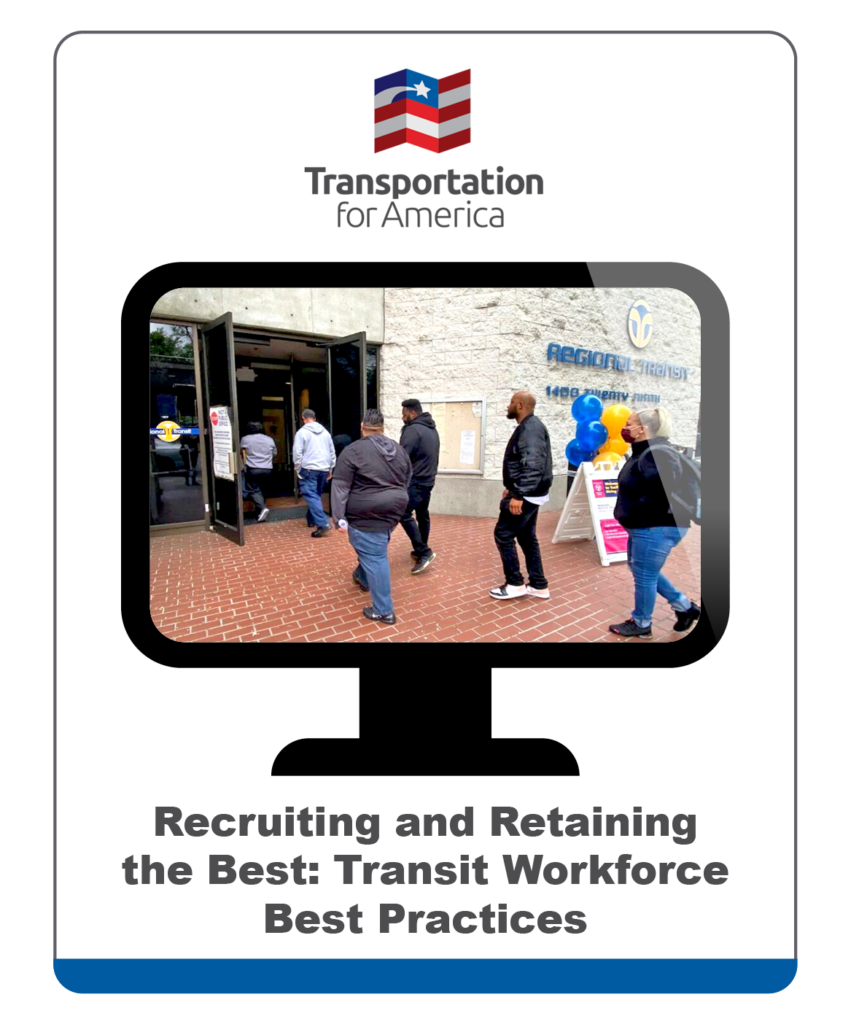
Recruiting and Retaining the Best: Transit Workforce Best Practices
This blog post from Transportation for America details successful strategies and best practices employed by transit agencies to empower their operator and maintenance workforces.
Transportation for America
September 2022

Wire Women: Lighting it Up
This illustrated publication tells the stories of women who are undertaking apprenticeship to become union electricians. This resource could be used by transit agencies, unions, or apprenticeship programs as promotional material or for educational purposes.
Sharon Szymanski
September 2022
TOPICS: Apprenticeship , Career Pathways , Community Engagement
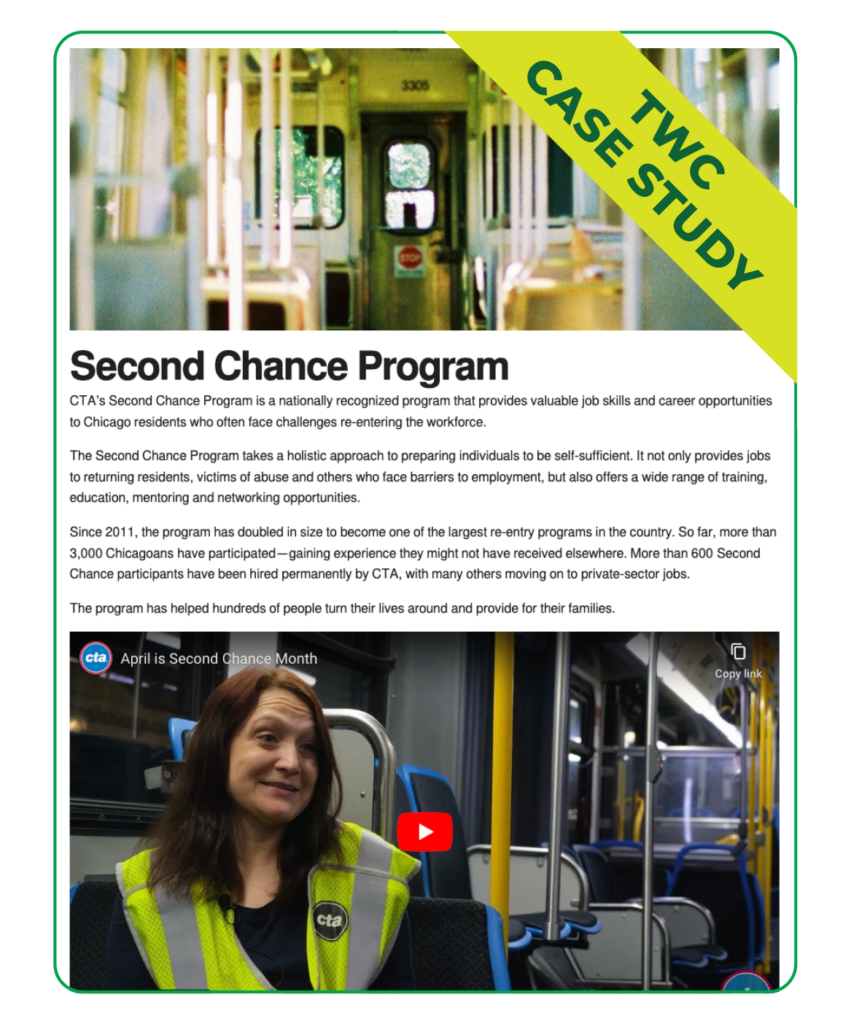
Second Chance Transit Programs
Several transit agencies across the country have established Second Chance programs to support formerly-incarcerated individuals as they reenter the workforce; these programs set pathways into frontline transit positions, often focusing on driver recruitment. These initiatives involve active collaboration between transit agencies and departments of corrections. Agencies have also worked with other partners, including their local unions, state and local workforce development agencies, ex-offender support programs, and local community organizations.
August 2022
Basic descriptions of some current state and local programs can be found at the links below.
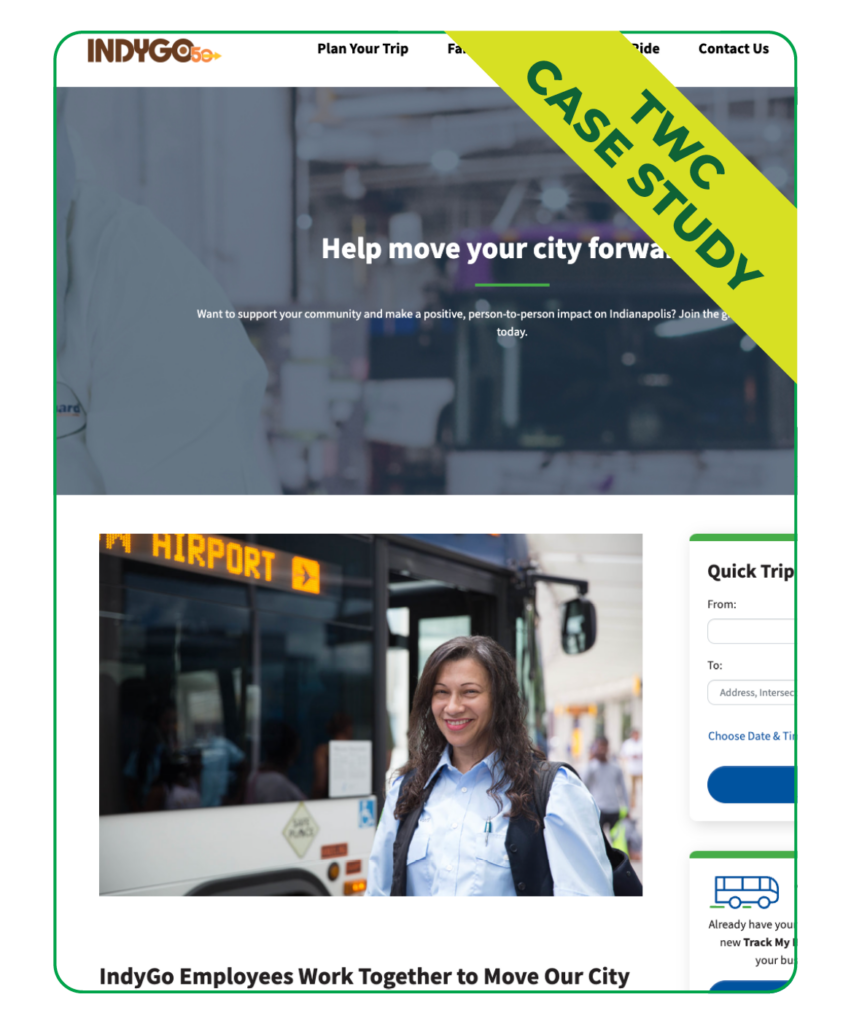
IndyGo’s Employment Opportunities Page
The IndyGo transit agency, based in Indianapolis, Indiana, offers high-quality career information on its website. This resource summarizes effective elements of the career page.
IndyGo
August 2022
TOPICS: Career Pathways , Hiring and Recruitment
IndyGo’s career page helps site visitors to understand what it’s like to work at the agency and how to apply. The page also highlights key job benefits and emphasizes the opportunity to serve the community. Overall, the employment section of IndyGo’s website demonstrates a number of key communication elements that support effective outreach to potential applicants. These elements include:
- An easily accessible and identifiable section on the website. “Employment” has its own clickable category, not a subcategory that may be harder to locate.
- Clear statements about IndyGo’s mission, emphasizing community service, connection, and working together to make a difference in people’s lives. These messages attract a range of potential target audiences, and they make clear the difference between a public service career, as opposed to other careers applicants may be considering.
- A detailed list of benefits, with additional specific benefits for drivers noted. Among those benefits, the list includes unique aspects of the driver position that distinguishes it from other potentially competing careers (e.g., long-haul trucking), noting benefits such as “all local work.”
- Highlighted aspects of the driver position that emphasize the connection with and support provided to riders.
- A thoughtful list of questions for potential applicants to consider about themselves and the type of work they might want before they decide to move ahead with the application.
- Detailed information on how and where to apply, basics of how to prepare for and what to bring to an interview, and important specifics about the steps of the hiring process and initial orientation and training programs.
- IndyGo’s Why I Drive segment on their website includes a video featured in the National Frontline Workforce Recruitment Campaign Toolkit video library elsewhere on this website. That link on IndyGo’s website also features brief worker profiles, another summary of benefits, and a note on IndyGo’s Second Chance Initiative.
- IndyGo’s website includes a prominent option to translate the site into Spanish.
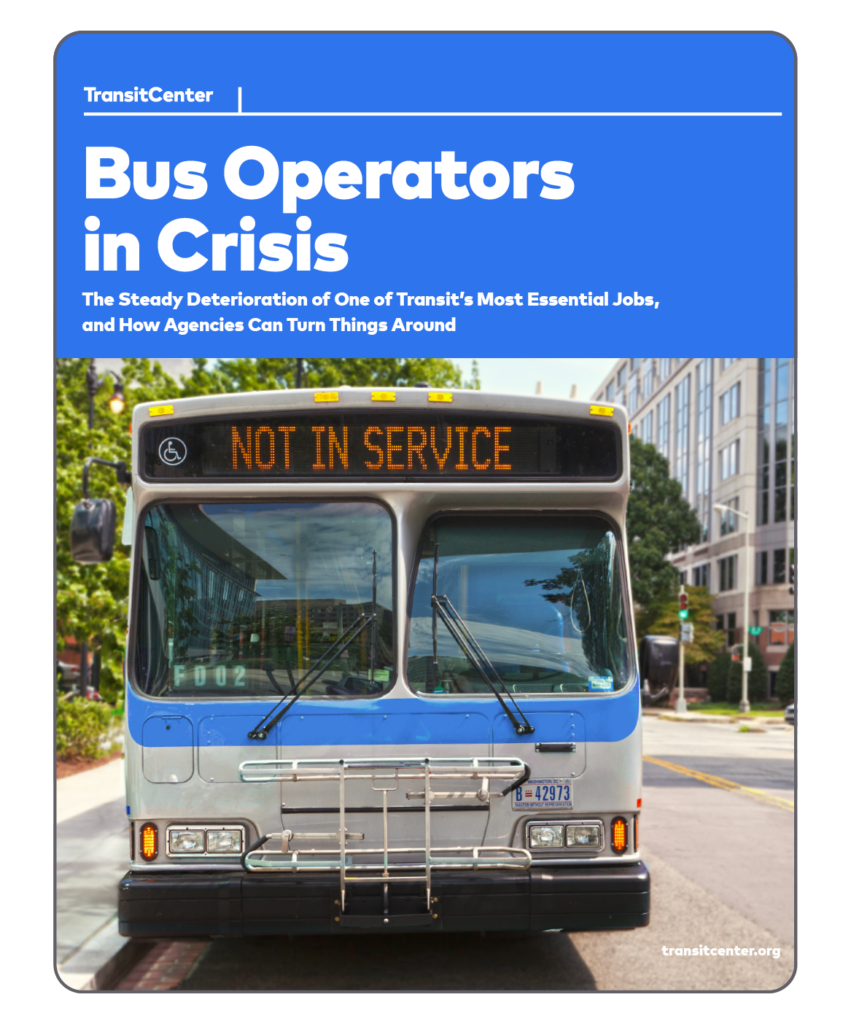
Bus Operators in Crisis
TransitCenter’s report, entitled Bus Operators in Crisis: The Steady Deterioration of One of Transit’s Most Essential Jobs, and How Agencies Can Turn Things Around, analyzes the nationwide phenomenon of bus operator shortages and advocates for enhanced job quality in the occupation. It details the challenges American operators are facing, and offers solutions that transit agencies can take to solve issues locally, as well as steps that state and the federal governments can take to provide agencies with necessary support.
TransitCenter
July 2022
TOPICS: Apprenticeship , Career Pathways , Community Engagement , Hiring and Recruitment , Retention
This resource also includes a link to a webinar hosted in July, 2022 presenting information from the report and slides from the webinar.
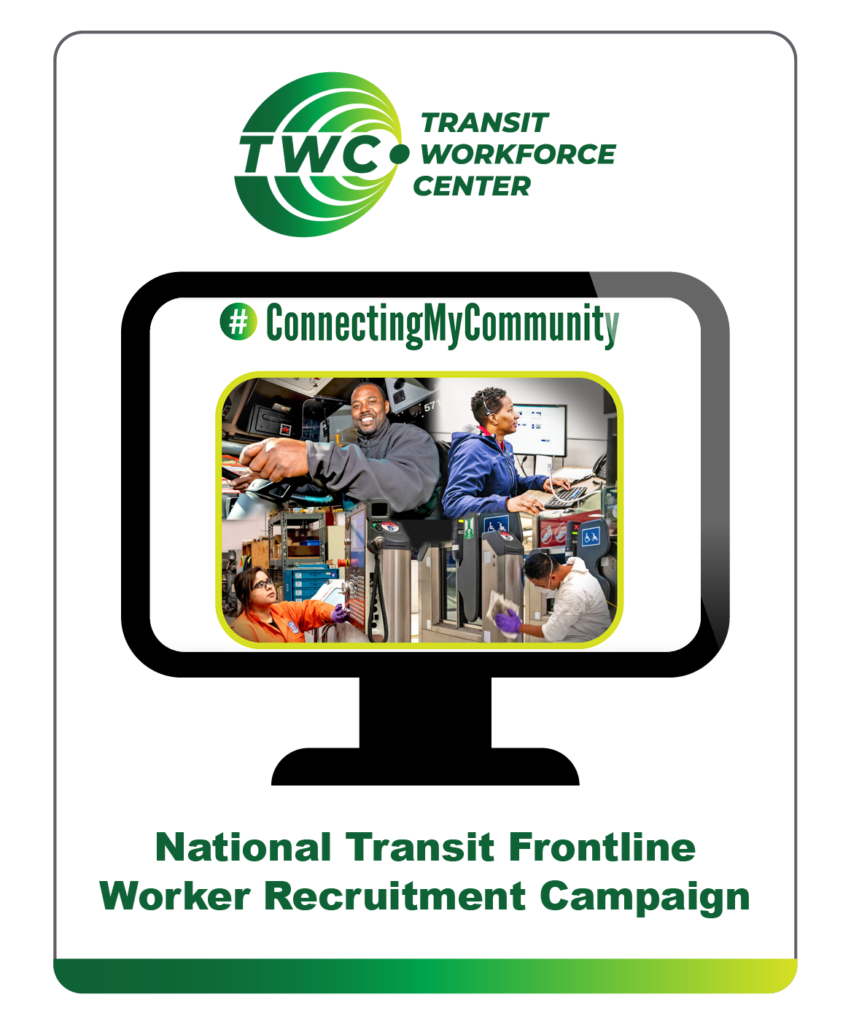
National Transit Frontline Worker Recruitment Campaign
Across the United States, whether large, small, urban, rural, or tribal, transit agencies are facing the challenge of recruiting and retaining drivers, mechanics, and technicians who can operate and maintain the buses of our public transit systems. To help support local transit efforts, TWC is developing the #ConnectingMyCommunity national frontline worker recruitment campaign, coordinated with the Federal Transit Administration (FTA) and industry, labor, and community partners from around the country.
Transit Workforce Center
July 2022
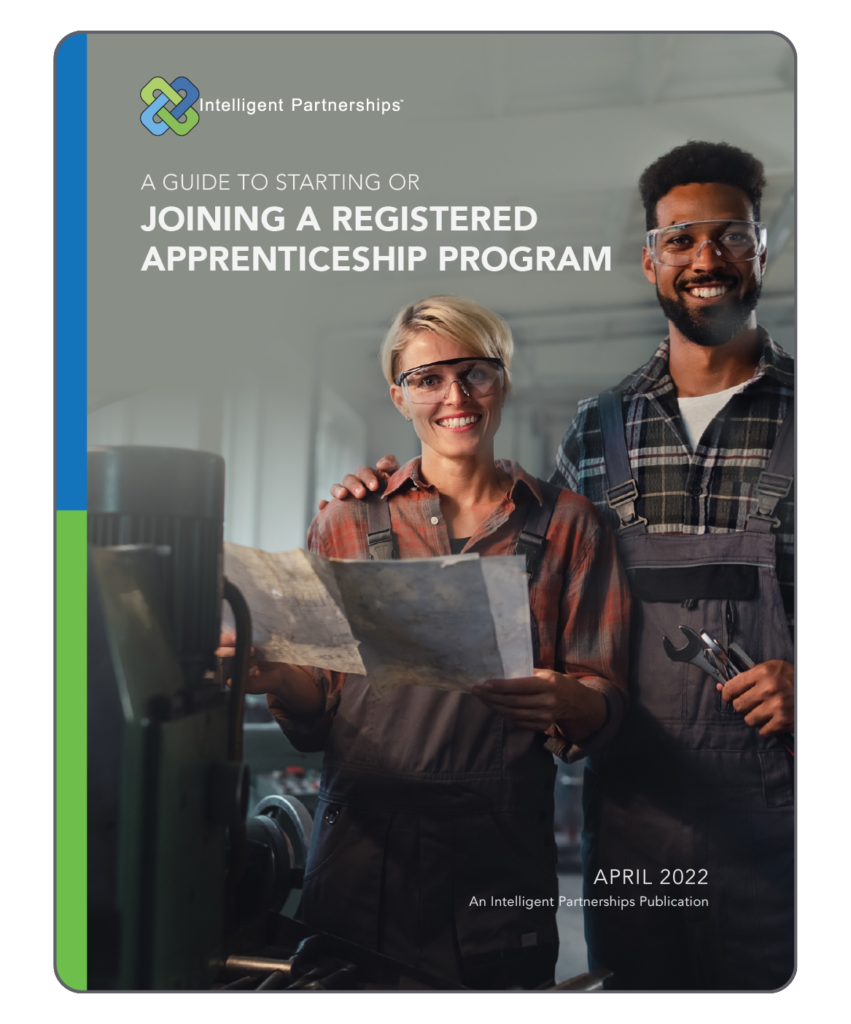
A Guide to Starting or Joining a Registered Apprenticeship Program
This publication provides an overview of registered apprenticeship, the benefits of registered apprenticeships to the employer, and the basic steps to get started.
You can also consult with your state office on registered apprenticeship for technical assistance and support for questions on the apprenticeship model, guidance on each phase of developing a program, connections to training providers, and advice on available funding sources to support apprenticeships: https://www.apprenticeship.gov/about-us/state-offices
Intelligent Partnerships
April 2022
TOPICS: Apprenticeship , Career Pathways , Community Engagement , Policy and Planning , Training
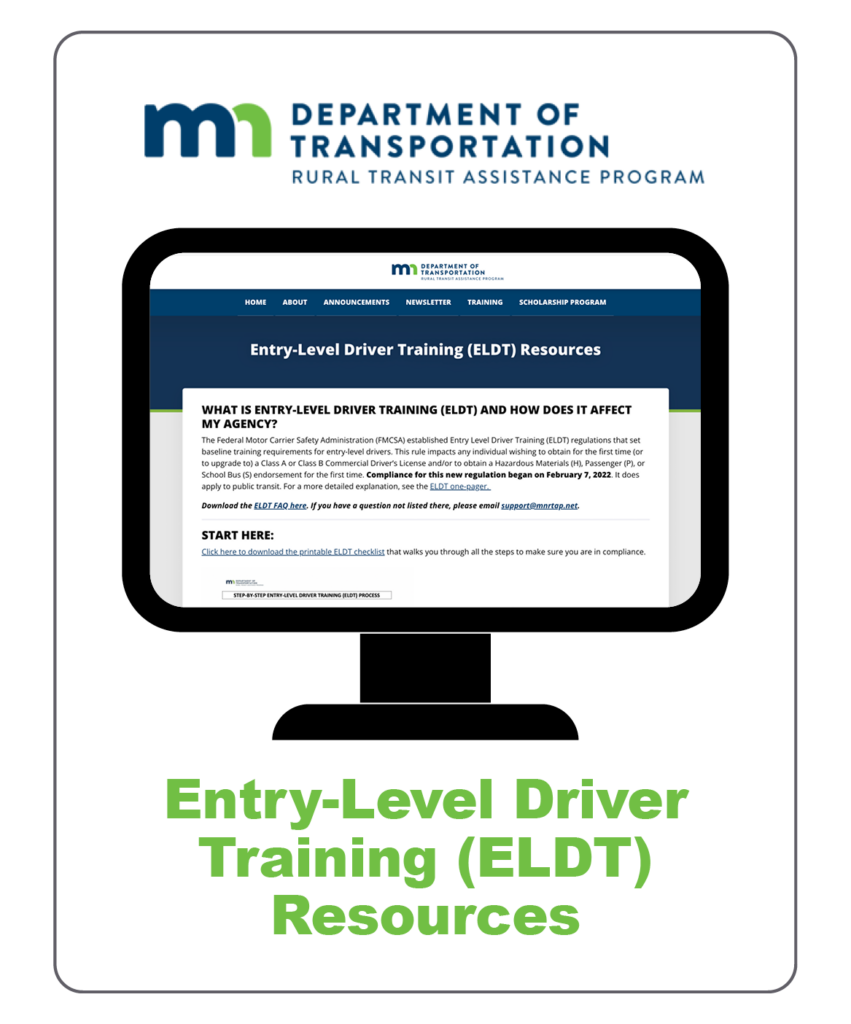
Entry-Level Driver Training (ELDT) Resources
The Federal Motor Carrier Safety Administration (FMCSA) established Entry Level Driver Training (ELDT) regulations that set baseline training requirements for entry-level drivers. This rule impacts any individual wishing to obtain for the first time (or to upgrade to) a Class A or Class B Commercial Driver’s License. These resources from the Minnesota Rural Transit Assistance Program (RTAP) provide information about the regulations, training materials, training providers, checklists, etc. to assist transit agencies in complying with regulations.
Minnesota Rural Transit Assistance Program
February 2022
TOPICS: Career Pathways , Hiring and Recruitment , Training
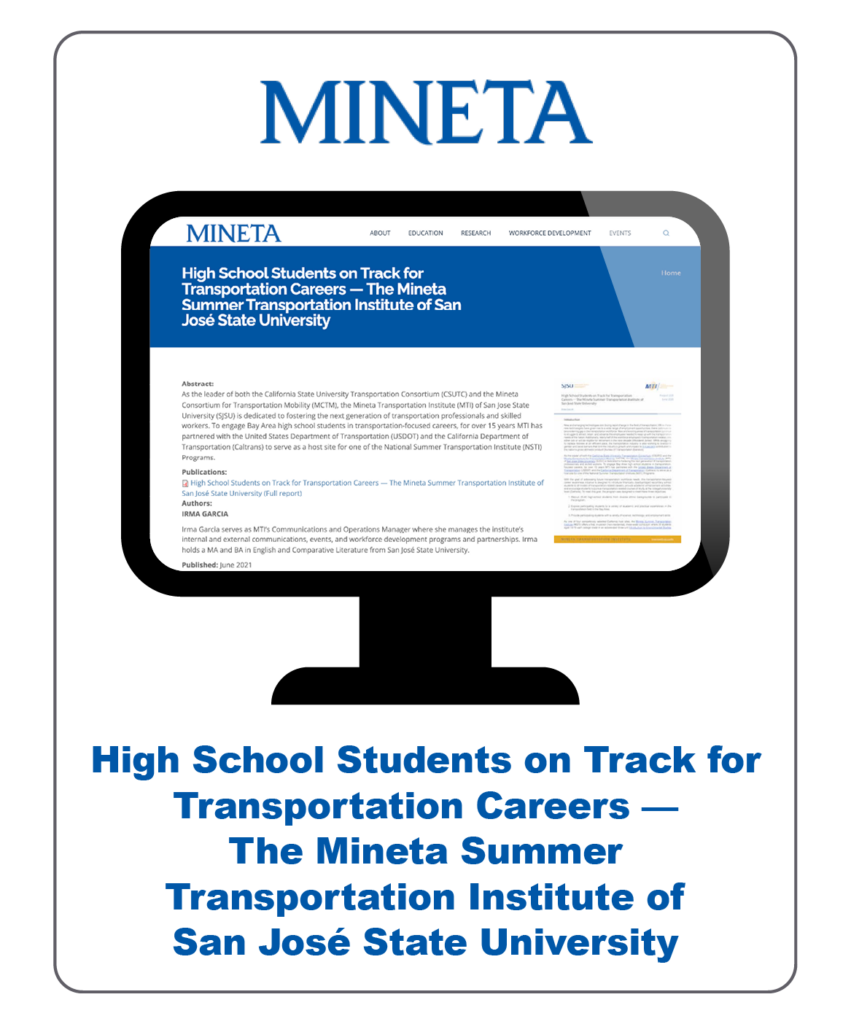
High School Students on Track for Transportation Careers
Mineta Transportation Institute
June 2021
TOPICS: Career Pathways , Community Engagement , Policy and Planning
This report provides an overview of the Mineta Summer Transportation Institute, one of the National Summer Transportation Institute (NSTI) Programs, which recruits high-school students, exposes them to a variety of academic and practical experiences in the transportation field in the Bay Area, and provides participating students with a variety of science, technology, and employment skills. The report shares program history, demographics, activities, etc.
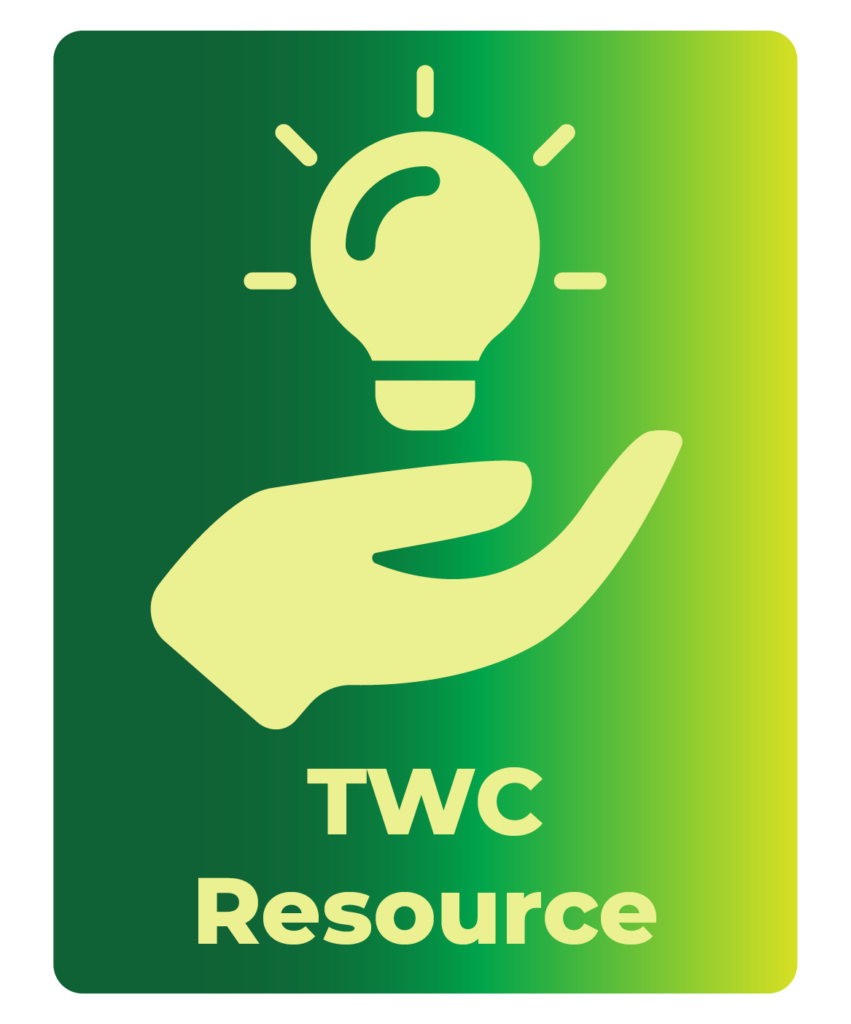
The Transit Workforce: A Path Forward
This plan was developed collaboratively between the Delaware Valley Regional Planning Commission and Temple University as a guide to addressing the systematic challenges facing Greater Philadelphia’s primary transit agencies: SEPTA, PATCO, and NJ Transit. This plan is intended as a guide for possible opportunities for the transit agencies to address identified challenges and themes and prioritized by participating stakeholders as areas that need to be addressed in the short term to ensure long-term success: pipeline development, pathways, and processes.
Delaware Valley Regional Planning Commission; Temple University
May 2021
TOPICS: Career Pathways , Policy and Planning , Workforce Shortage
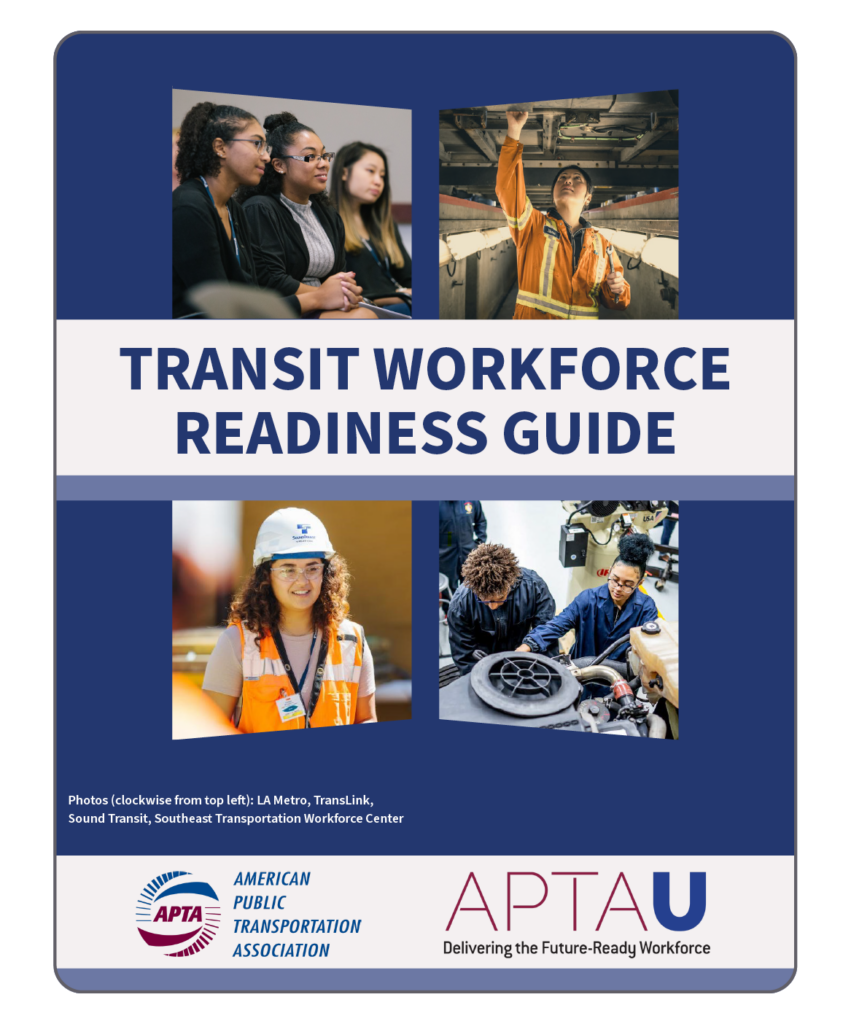
APTA Transit Workforce Readiness Guide
APTA’s Transit Workforce Readiness Guide is a highly interactive and easy-to-use online resource for executives and their staff to assist organizations in building a talent pipeline by attracting high school students into entry-level transit positions.
American Public Transportation Association
March 2021
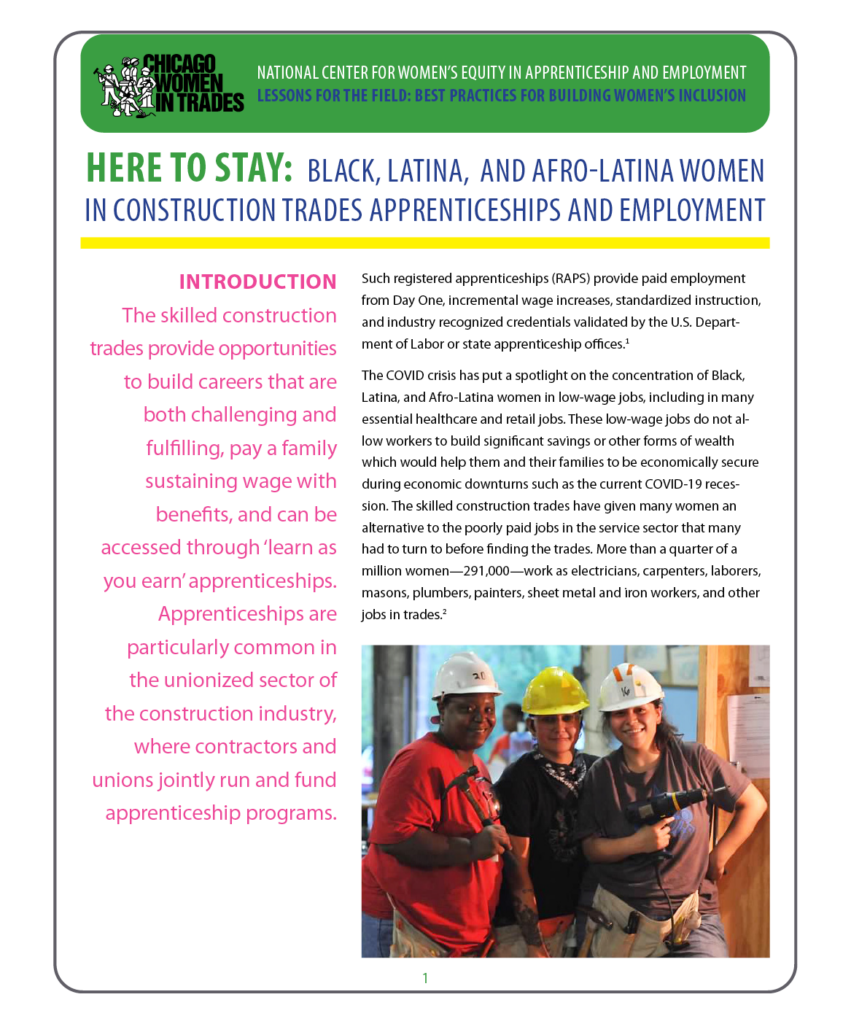
Here to Stay: Black, Latina, and Afro-Latina Women in Construction Trades Apprenticeships and Employment
Chicago Women in the Trades; Institute for Women's Policy Research
March 2021
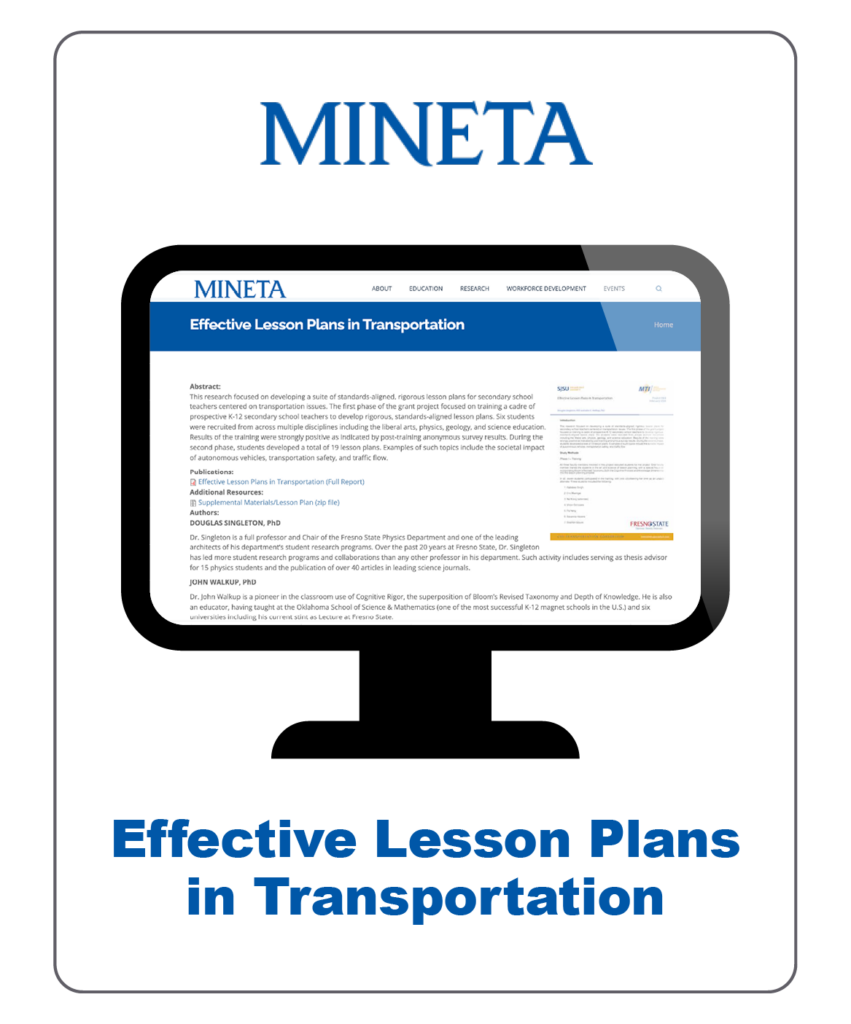
Effective Lesson Plans in Transportation
This research focuses on developing a suite of standards-aligned, rigorous lesson plans for secondary school teachers centered on transportation issues, such as the societal impact of autonomous vehicles, transportation safety, and traffic flow. It includes a report and lesson plans.
Mineta Transportation Institute
February 2021
TOPICS: Career Pathways , Policy and Planning
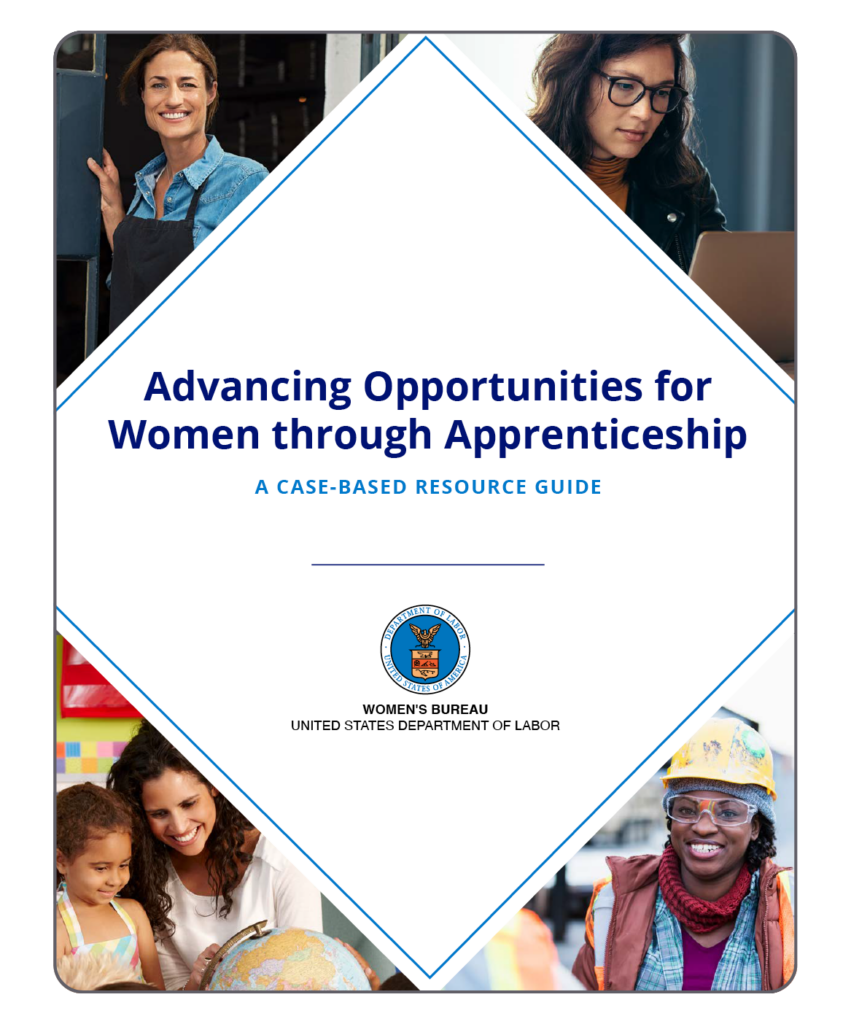
Advancing Opportunities for Women through Apprenticeship: A Case-Based Resource Guide
The Advancing Opportunities for Women through Apprenticeship case-based resource guide provides a framework for meaningful expansion of apprenticeship programs for women. The guide includes case studies on four high-quality pre-apprenticeship and apprenticeship programs in a range of industry sectors.
Department of Labor
TOPICS: Apprenticeship , Career Pathways , Community Engagement , Mentorship , Policy and Planning , Retention
The case studies were developed through on-site visits to the program locations; interviews with program staff, partners, and current and former participants; and a review of program materials and data. They provide information and insights related to partnership development, program design, and outcomes that outline how pre-apprenticeship and apprenticeship programs can help women access family-sustaining jobs and quality career pathways. The guide identifies common strategies across the four programs to help others learn how to create programs that successfully open pathways to in-demand jobs for women through apprenticeships.
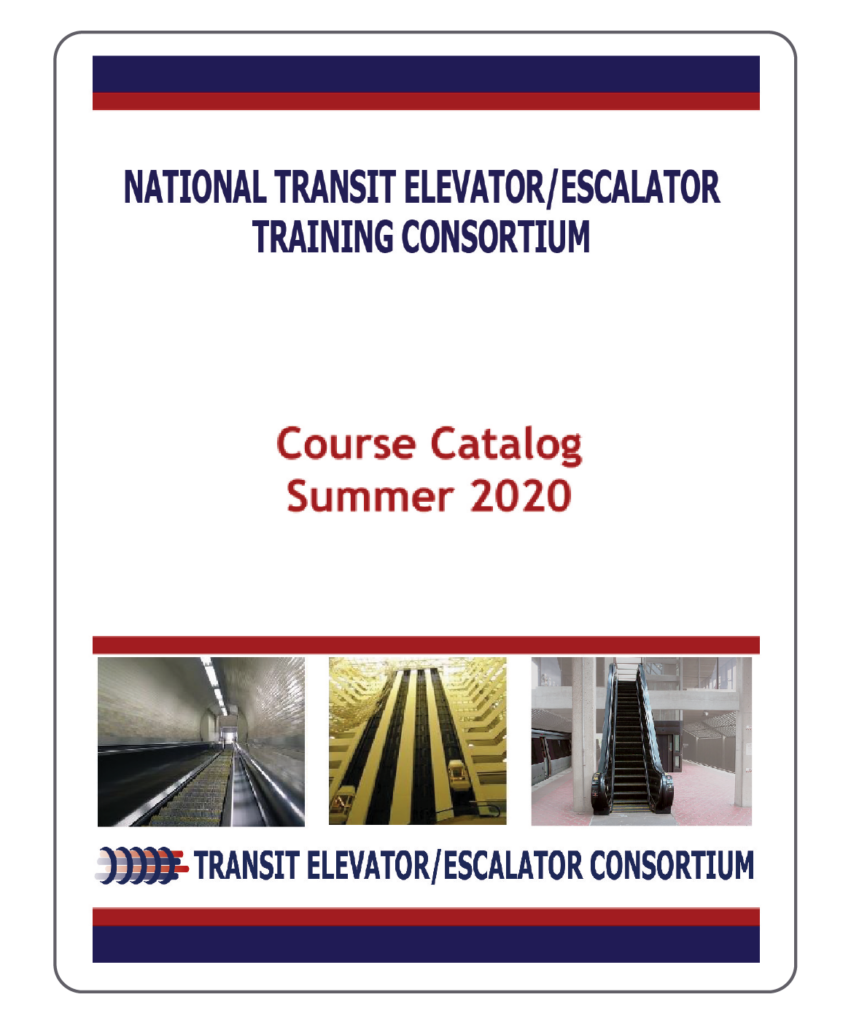
Elevator/Escalator Training Consortium
International Transportation Learning Center
The International Transportation Learning Center (ITLC) organizes multiple national training consortia to develop standards-based national training courseware for frontline occupations in public transportation organizations.
The Transit Elevator-Escalator Training Consortium (the Consortium) was the first in an ongoing series of industry-wide collaborative programs to develop integrated systems of training for key frontline occupations in public transportation. Building on national training standards developed by industry Subject Matter Experts (SMEs) from 2006 to 2010 and then adopted by the American Public Transportation Association (APTA), the Consortium developed a full set of standardized national courseware to support training and apprenticeship programs for transit elevator/escalator (El-Es) technicians. The curriculum and courseware development team was composed of subject matter experts (SMEs) from five member agencies and unions from across the country. Membership of the Consortium consists of transit systems that maintain their vertical transportation equipment in-house, rather than relying on outside contractors. Equipment manufacturers contributed access to their technical drawings and manuals to enrich the courseware.
The list of courseware as of Summer 2020 is contained in the attached catalog.

What We Think We Learned: Transit Workforce Interview Themes
This report is a synopsis of the transit industry and workforce development interviews conducted in Greater Philadelphia from December 2019 to February 2020. The research team emphasized three distinct areas where the need for improvement should be elevated: Pipeline Development, Pathways, and Processes. While there are several ongoing successes within the transit industry, this document strives to focus on key identified gaps most conducive for joint problem-solving.
Delaware Valley Regional Planning Commission
March 2020
TOPICS: Apprenticeship , Career Pathways , Policy and Planning , Retention , Training
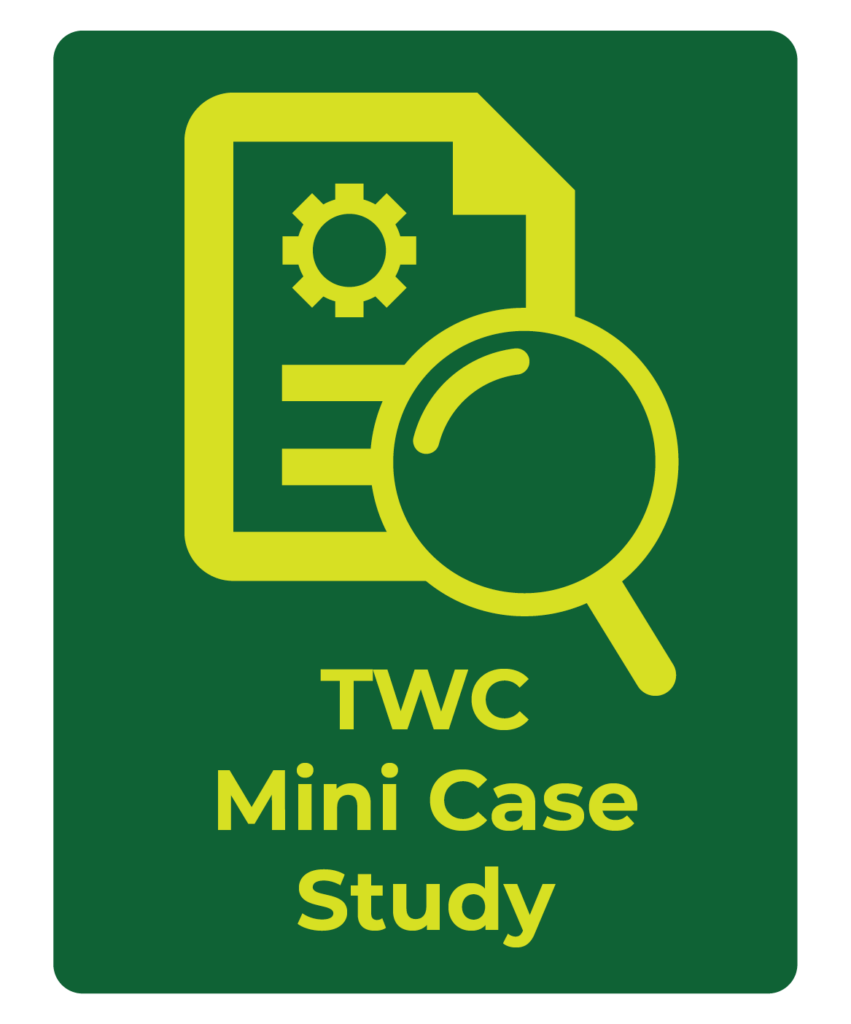
Emerging Leaders Presentation: Recruiting & Retaining Bus Operators
This slidedeck, from the APTA Emerging Leaders Program class of 2019 presentations, provides an overview of research and transit agency case studies to capture key themes on the topics of bus operator recruitment and retention.
American Public Transportation Association
December 2019
TOPICS: Career Pathways , Community Engagement , Hiring and Recruitment , Retention
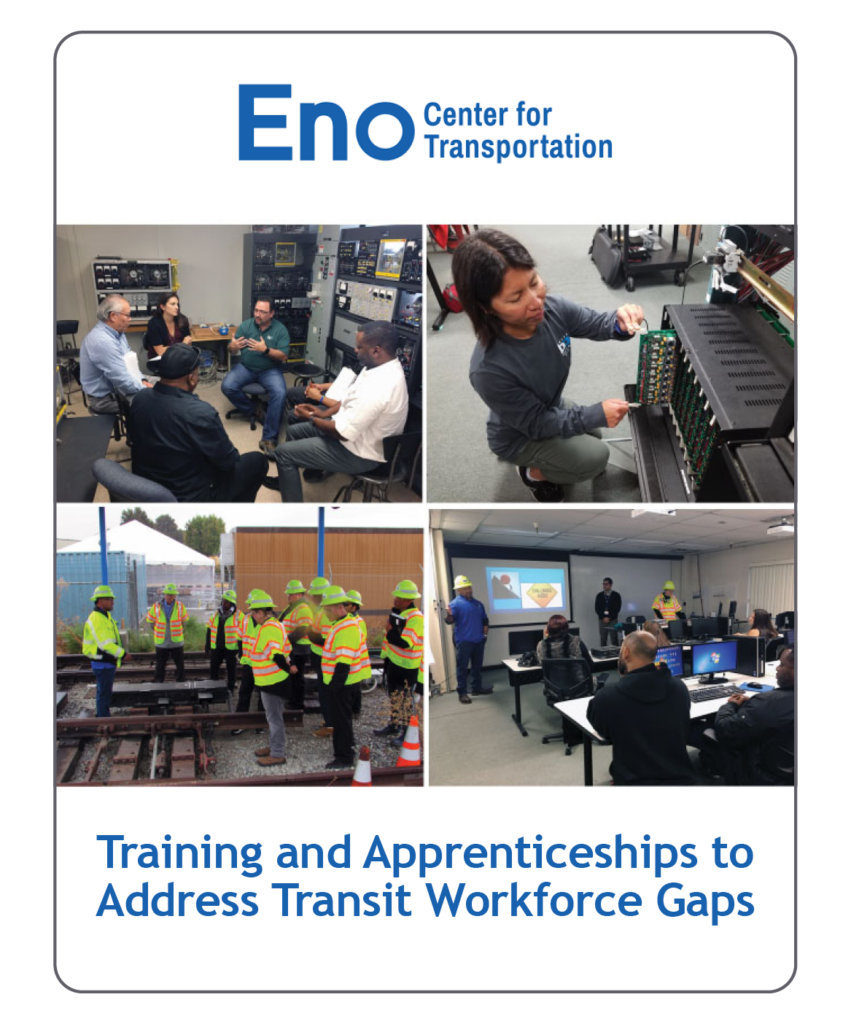
Training and Apprenticeships to Address Transit Workforce Gaps
This piece, penned by Jack Clark of the International Transportation Learning Center (ITLC), explores the role of training and apprenticeship programs in meeting workforce needs in transit, with a focus on operators. It discusses a few leading examples of apprenticeship programs in transit, as well as the role of mentorship in a strong apprenticeship program.
Eno Center for Transporation
August 2019
TOPICS: Apprenticeship , Career Pathways , Mentorship , Training
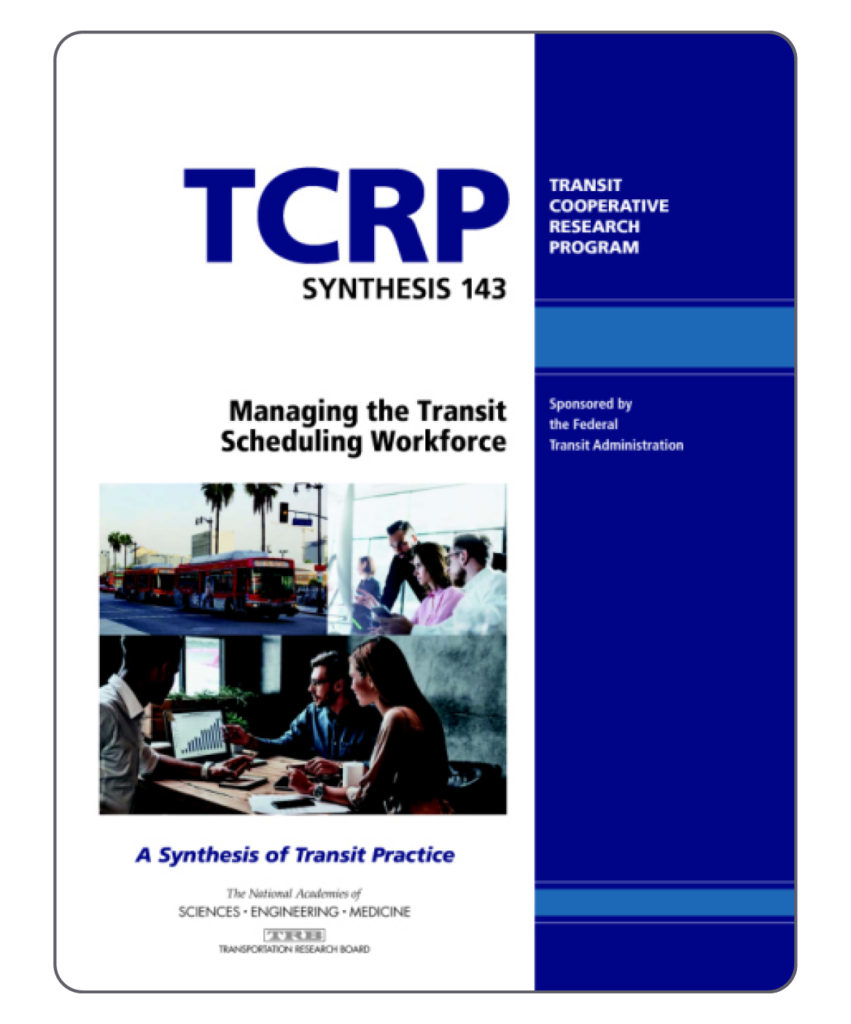
Managing the Transit Scheduling Workforce
Transit Cooperative Research Program
TOPICS: Career Pathways , Hiring and Recruitment , Training
This report is designed to assist transit agencies in managing their transit scheduling human capital. The report presents an overview of the practices and procedures transit agencies use to manage their scheduling workforce and will allow agencies to compare what they are currently doing with what others are doing in this area. The report also analyzes how transit systems are evolving their practices to adapt to industry and technological changes. It provides transit systems with new ideas and strategies to retain good schedulers.
Contributor(s): National Academies of Sciences, Engineering, and Medicine; Transportation Research Board; Transit Cooperative Research Program; Transit Cooperative Research Program Synthesis Program; Michael J. Walk; James P. Cardenas; Kristi Miller; Jessica Alvarez; Sandy Davis; Peter Hadley
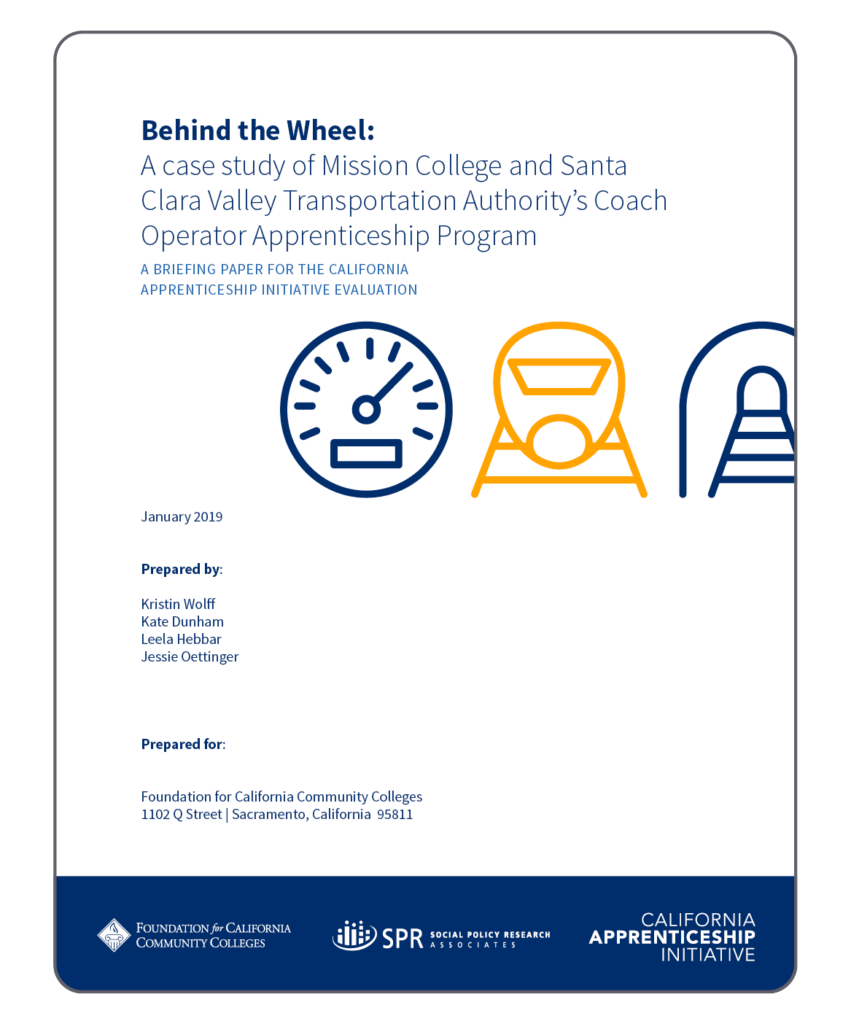
Behind the Wheel
This report, Behind the Wheel: A case study of Mission College and Santa Clara Valley Transportation Authority’s Coach Operator Apprenticeship Program, is part of the Social Policy Research Associates’ evaluation of the California Apprenticeship Initiative. The case study describes the development of the Coach Operator and Transportation Apprenticeship, including why the partners chose an apprenticeship model to meet their training needs, how the program was developed and structured, and what apprentices and employers report about their experiences in the program.
Foundation for California Community Colleges; Social Policy Research Associates
January 2019
TOPICS: Apprenticeship , Career Pathways , Hiring and Recruitment , Training
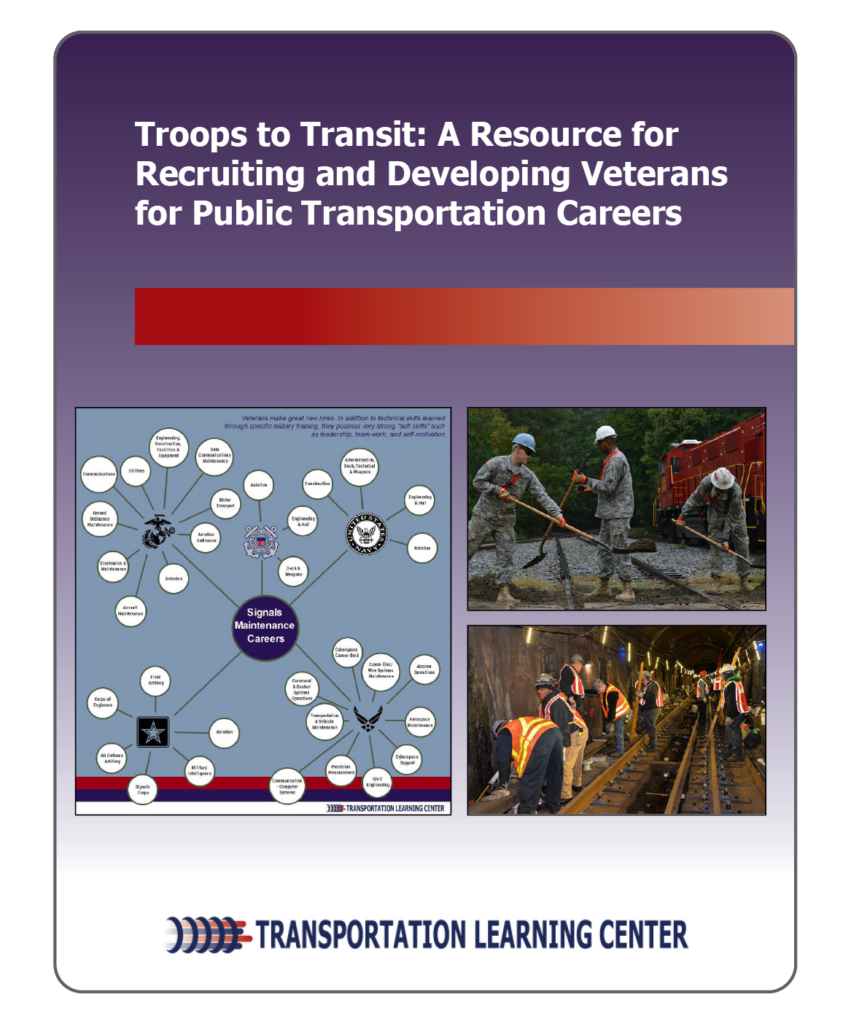
Troops to Transit: A Resource for Recruiting and Developing Veterans for Public Transportation Careers
The International Transportation Learning Center’s analysis of Bureau of Labor Statistics data has shown that the transportation industry in large will likely see a massive front-line labor shortage in the next ten years unless it is able to find and hire skilled workers. In fact, it is estimated that 126 percent of today’s transit workforce will have to be hired and trained in the next ten years.
In order to help fill this need, the center has produced a Veterans Crosswalk tool (see Excel document below) which matches skill-sets learned during military service with the kinds of skills that public transportation agencies look for when hiring signals maintainers. This product was produced in cooperation with a Veterans Taskforce made up of veterans who are also Subject Matter Experts in the field of Signals Maintenance. This detailed matrix has been distilled down into a user-friendly Veteran’s Factsheet (see PDF below) which provides at-a-glance information for both veterans interested in a signals career and for agencies looking to hire skilled veterans.
The tool is accompanied by a summary report.
International Transportation Learning Center
November 2016
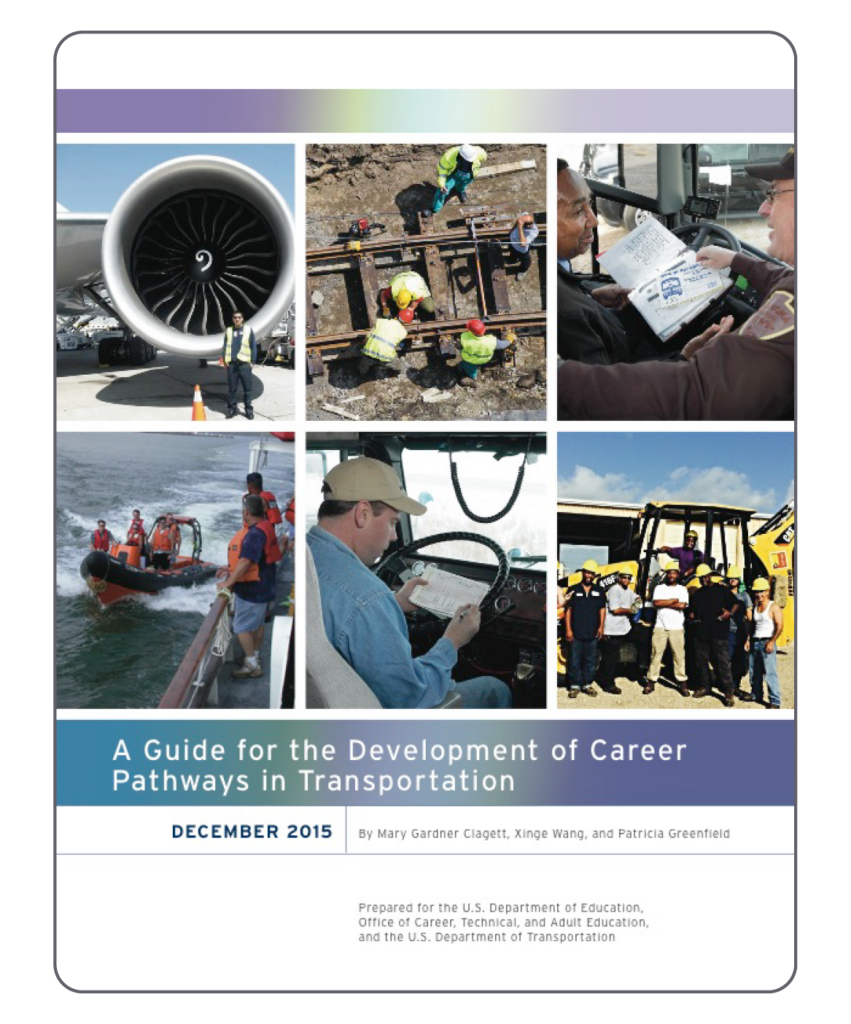
A Guide for the Development of Career Pathways in Transportation
This guide outlines the steps that transportation industry stakeholders can take to develop or expand Career Pathways to focus on the skills, competencies, and credentials needed for high-demand jobs in the transportation industry and its subsectors.
U.S. Department of Education; Jobs for the Future; International Transportation Learning Center
December 2015
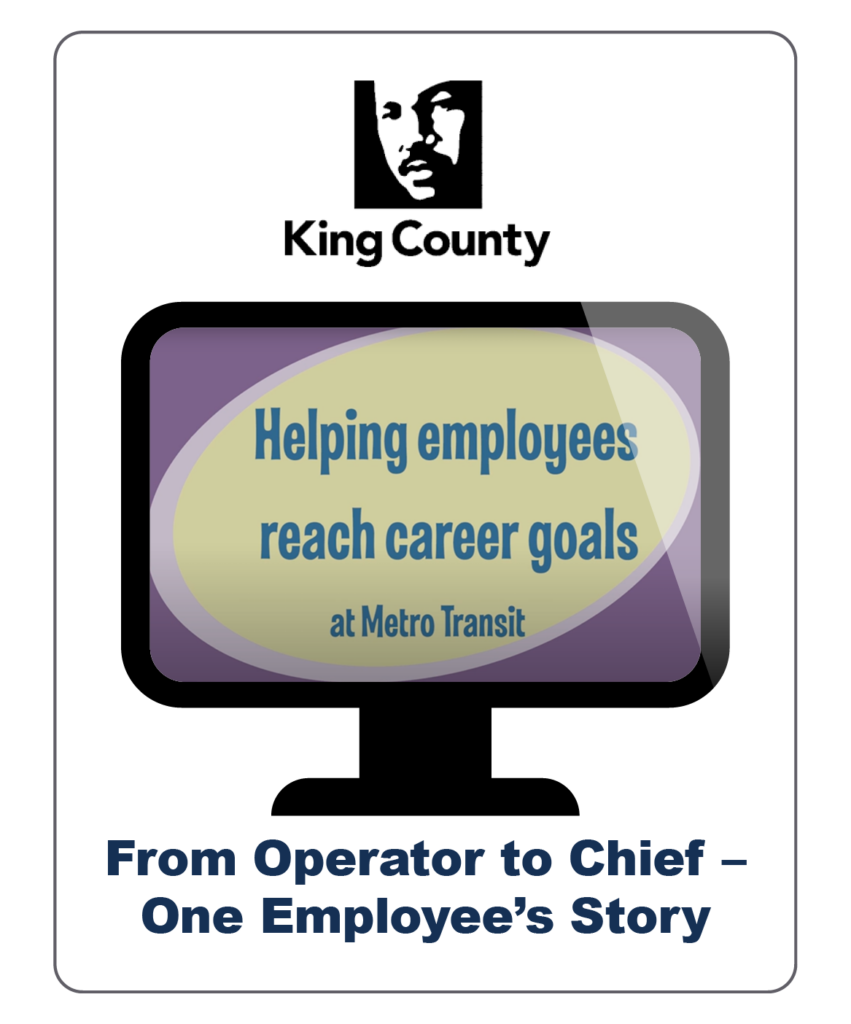
From Operator to Chief – One Employee’s Story
This video provides a description of King County DOT’s program for recruitment and advancement options for current employees, along with one employees’ story about how he was supported in his journey from bus operator to Base Chief.
King County Department of Transportation
October 2015
TOPICS: Career Pathways , Community Engagement , Hiring and Recruitment , Retention , Training
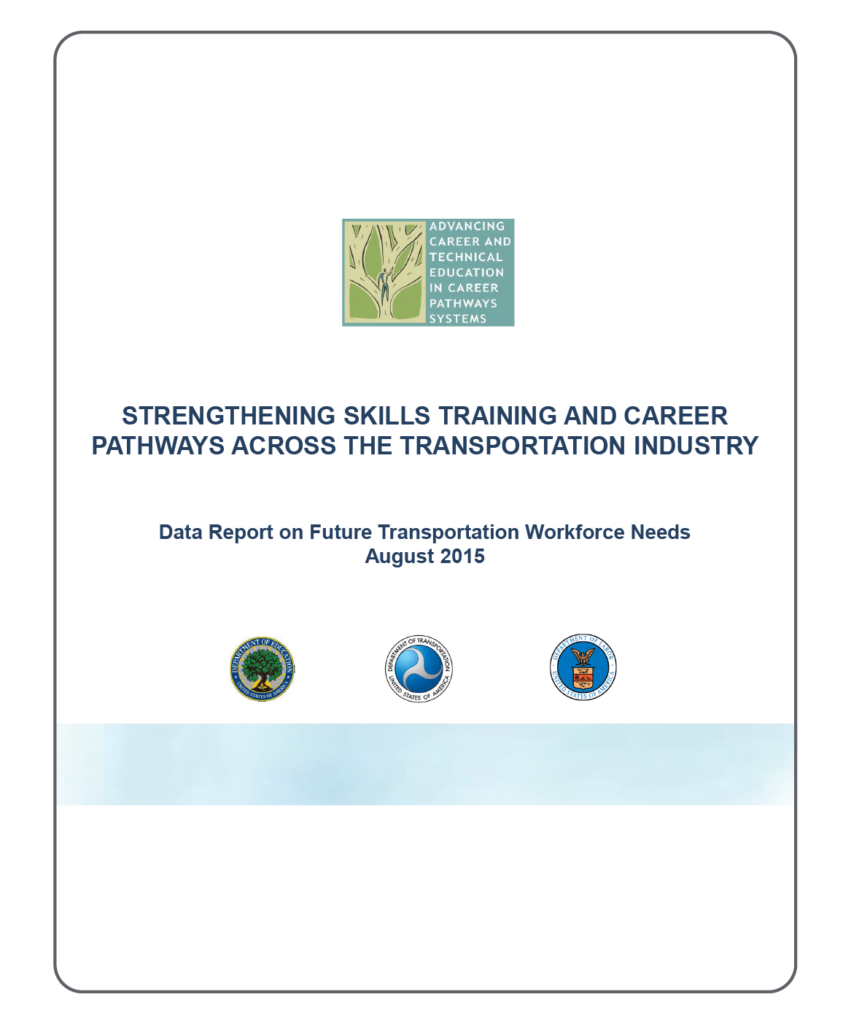
Strengthening Skills Training and Career Pathways Across the Transportation Industry
This report identifies high-demand jobs with good wages in transportation, discusses the role data plays in identifying future workforce skill needs, and analyzes the patterns in the education and work experience required for entry, as well as on-the-job training required for new entrants to gain full competency.
U.S. Department of Education, Office of Career, Technical, and Adult Education; U.S. Department of Transportation; U.S. Department of Labor
August 2015
TOPICS: Apprenticeship , Career Pathways , Hiring and Recruitment , Training
The Office of Career, Technical, and Adult Education (OCTAE) and the Department of Transportation acknowledge the important contributions to this report made by the following people: Xinge Wang, Deputy Director, and Jack Clark, Executive Director, Transportation Learning Center; and Mary Clagett, Director for Workforce Policy, Lois Joy, Senior Program Manager, and Dudney Sylla, Program Manager, Jobs for the Future, for their analysis and writing.
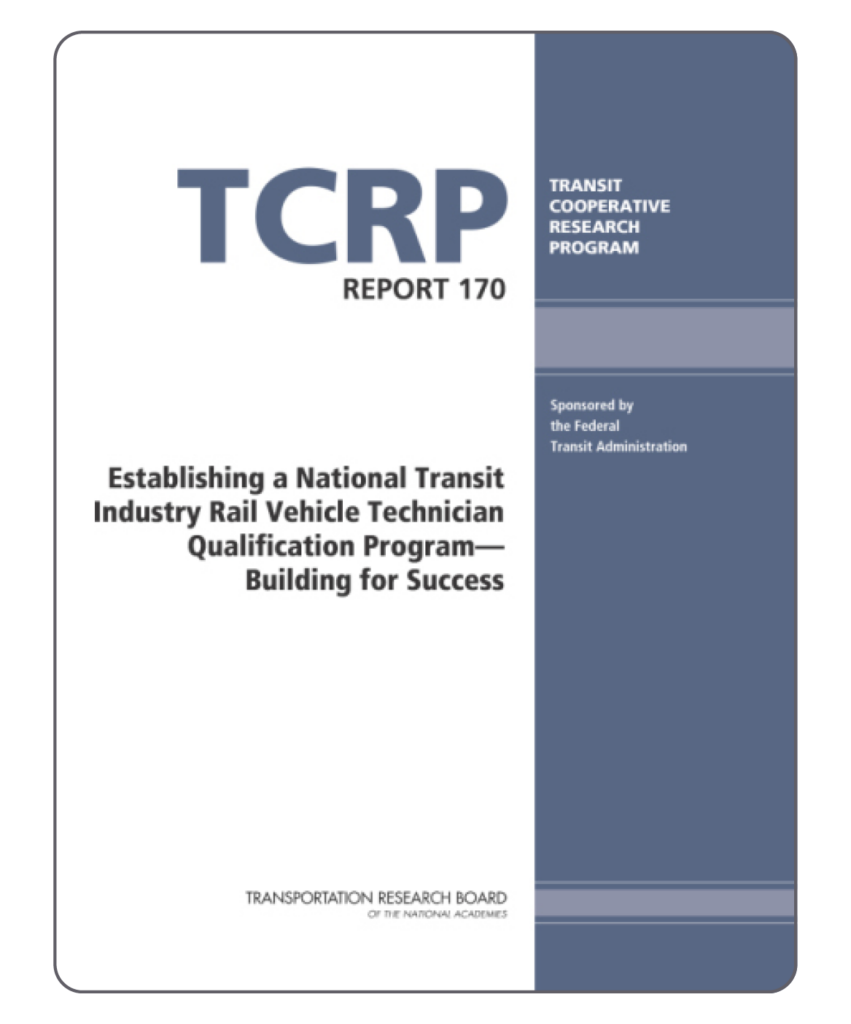
Establishing a National Transit Industry Rail Vehicle Technician Qualification Program—Building for Success
TRB’s Transit Cooperative Research Program (TCRP) Report 170: Establishing a National Transit Industry Rail Vehicle Technician Qualification Program—Building for Success describes a system of qualification that has been developed for rail vehicle technicians. This qualification system is available for implementation through the Transportation Learning Center.
The program integrates national training standards, progressive classroom curricula and introductory courseware, on-the-job learning modules, an apprenticeship framework that combines well-designed sequences of learning, mentoring to support learners, and coordination of classroom and on-the-job learning. The qualification system also includes written and hands-on certification assessments to confirm that technicians have the practical knowledge and skills required to perform their jobs at the highest level of expertise.
Transit Cooperative Research Program (TCRP) & International Transportation Learning Center
January 2014
TOPICS: Career Pathways , Mentorship , Trainer and Mentor Development , Training
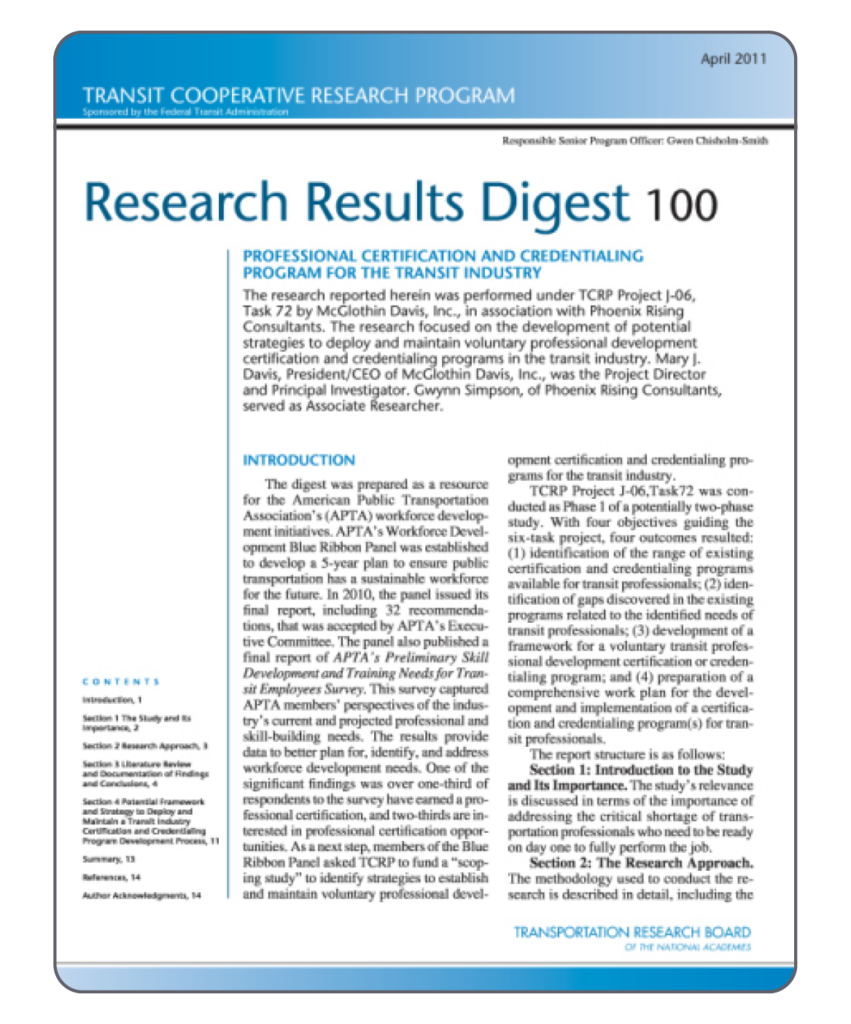
Professional Certification and Credentialing Program for the Transit Industry
TRB’s Transit Cooperative Research Program (TCRP) Research Results Digest 100: Professional Certification and Credentialing Program for the Transit Industry explores the findings of a literature review and a gap analysis of the efficacy of four transit-specific professional development programs. The report also examines potential strategies that might be used to deploy and maintain a transit industry certification and credentialing program.
Transit Cooperative Research Program (TCRP)
April 2011
TOPICS: Career Pathways , Policy and Planning , Retention , Training
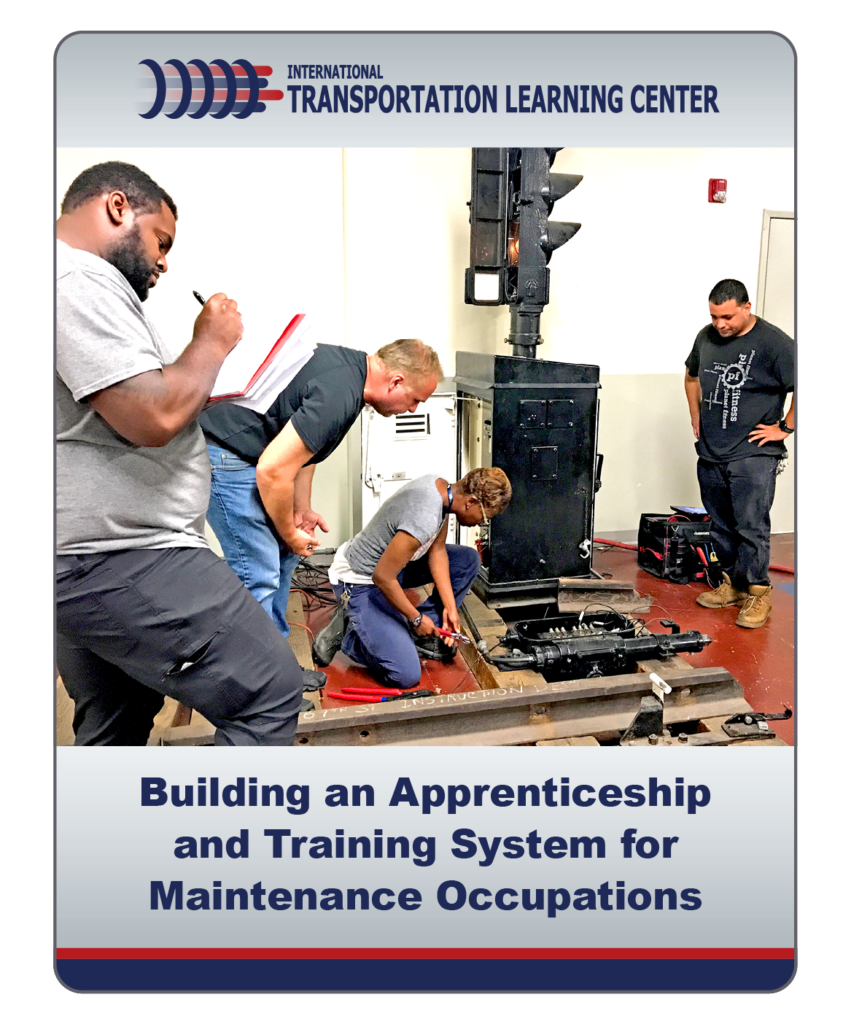
Building an Apprenticeship and Training System for Maintenance Occupations
This article discusses the joint training and apprenticeship system emerging in maintenance occupations in the American transit industry, as well as related challenges and strategies to overcome them. The article reports on early results, including efforts to develop a consensus national framework for apprenticeship and training in transit maintenance.
Written with Robert W. Glover, the University of Texas at Austin.
International Transportation Learning Center
January 2009
TOPICS: Apprenticeship , Career Pathways , Training
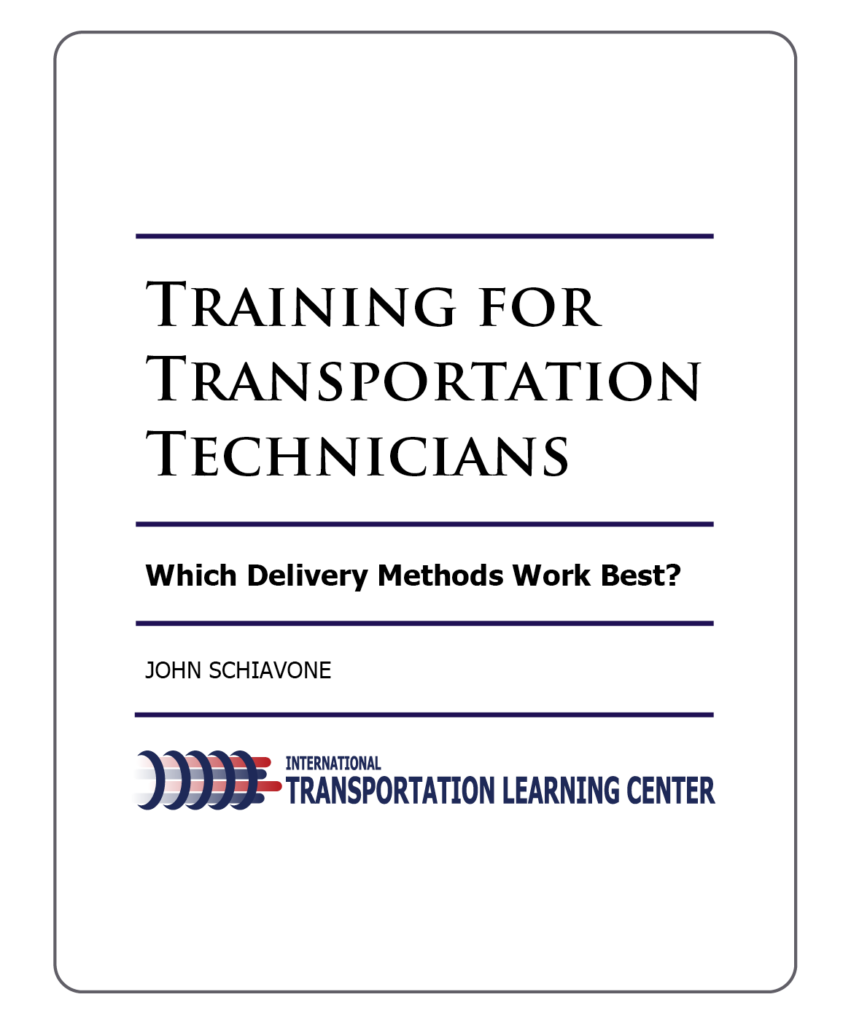
Training for Transportation Technicians: Which Delivery Methods Work Best?
This paper explores what is the most effective way to train transportation technicians. It proposes a blended approach combining classroom time with interactive hands-on demonstrations, followed by structured on-the-job training (OJT) and mentoring.
International Transportation Learning Center
TOPICS: Apprenticeship , Career Pathways , Mentorship , Training

Appalachian Regional Initiative for Stronger Economies (ARISE)
Administering Agency: Appalachian Regional Commission (ARC)
Closing Date for Applications: Applications will be accepted on a rolling basis
Funding Range: $73.5M available total
Geographic Scope: Regional
Description: ARISE is an ARC initiative that aims to drive large-scale, regional economic transformation through multistate, collaborative projects across Appalachia.
With the additional funding provided by the Bipartisan Infrastructure Law, also known as the Infrastructure Investment and Jobs Act of 2021, ARC launched ARISE to strengthen Appalachian business and industry, and to grow and support the development of new opportunities across multiple states.
Posted January 20, 2023 to TWC Resource Center. Please refer to the link below for the most up to date information from the funder.
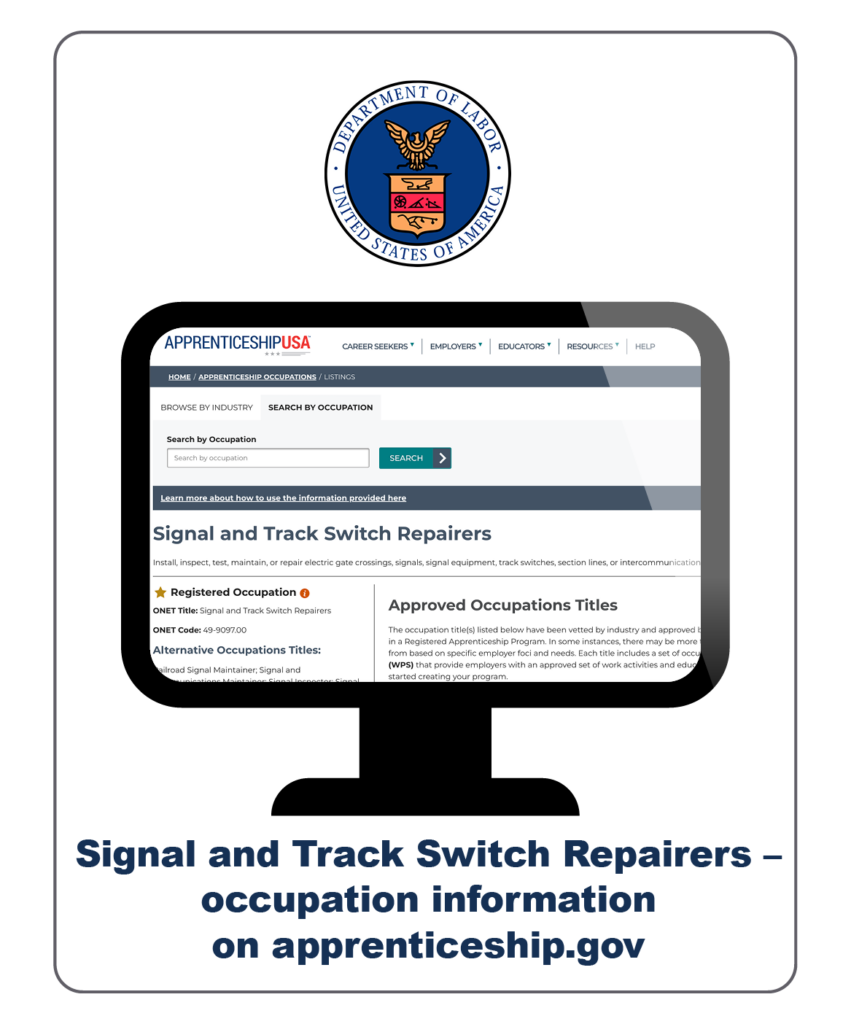
Signal and Track Switch Repairers
This search page on Apprenticeship.gov provides results for approved occupation titles under Signal and Track Switch Repairers, as well as work activities, education, and related occupations.
US Department of Labor
TOPICS: Apprenticeship , Career Pathways
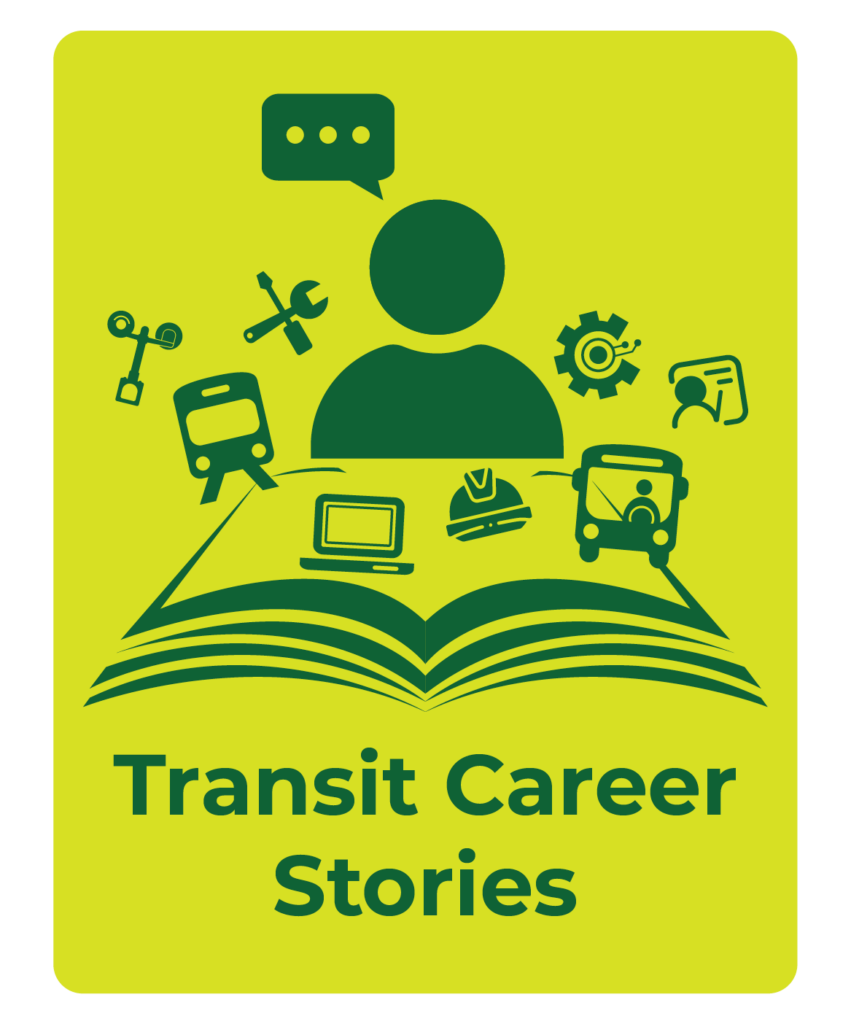
Transit Career Stories
Transit Workforce Center
TOPICS: Career Pathways , Community Engagement , Mentorship
These Transit Career Stories showcase workers’ journeys and career pathways to help increase awareness of transit careers. Learn from these professionals and community leaders through their own telling of what they do, how they got there, and what makes their work exciting and rewarding.
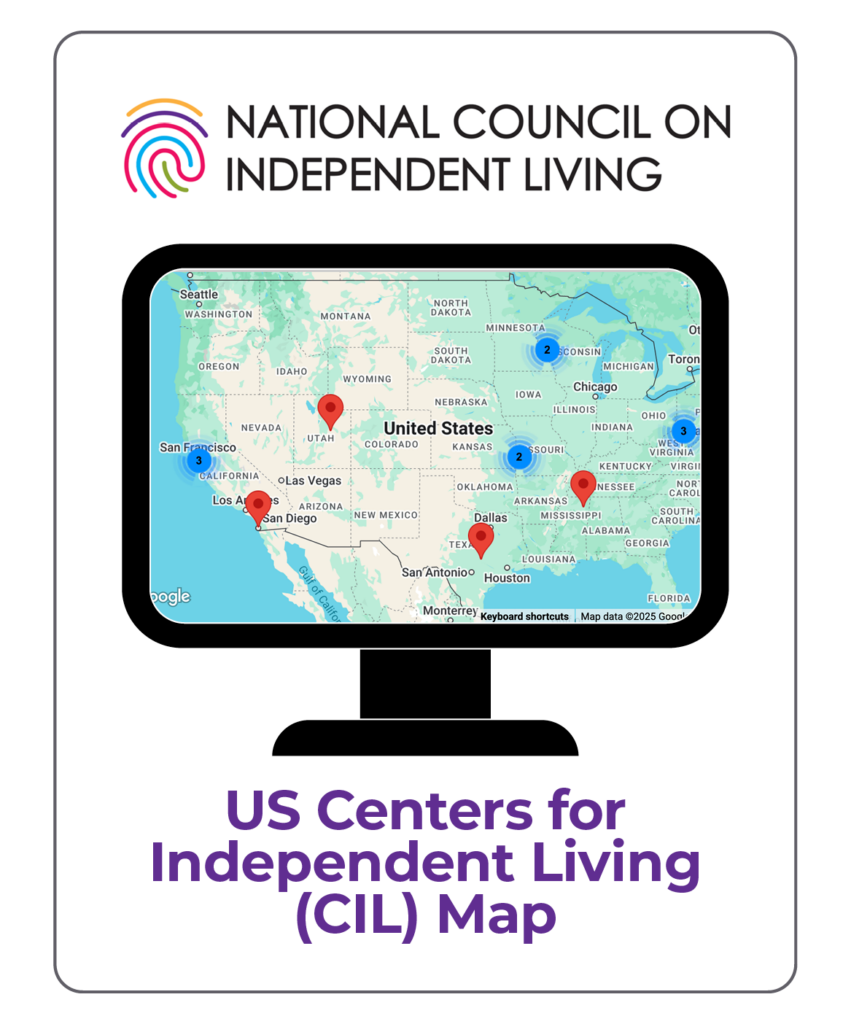
US Centers for Independent Living (CIL) Map
National Council on Independent Living
NCIL maintains a map of US CILs on their website. CILs can be a great partner in connecting people with disabilities to transit jobs. CILs are advocacy organizations run by and for people with disabilities in local communities. CILs provide peer support, independent living skills training, information and referral, individual and systems advocacy, and transition from institutions and secondary education. Use the link below to find the nearest your nearest CIL.








